

The current agenda defines the state of civil society not less than statistical data and sociological measurements. The expert component of public activity is the content of interaction between society and government.
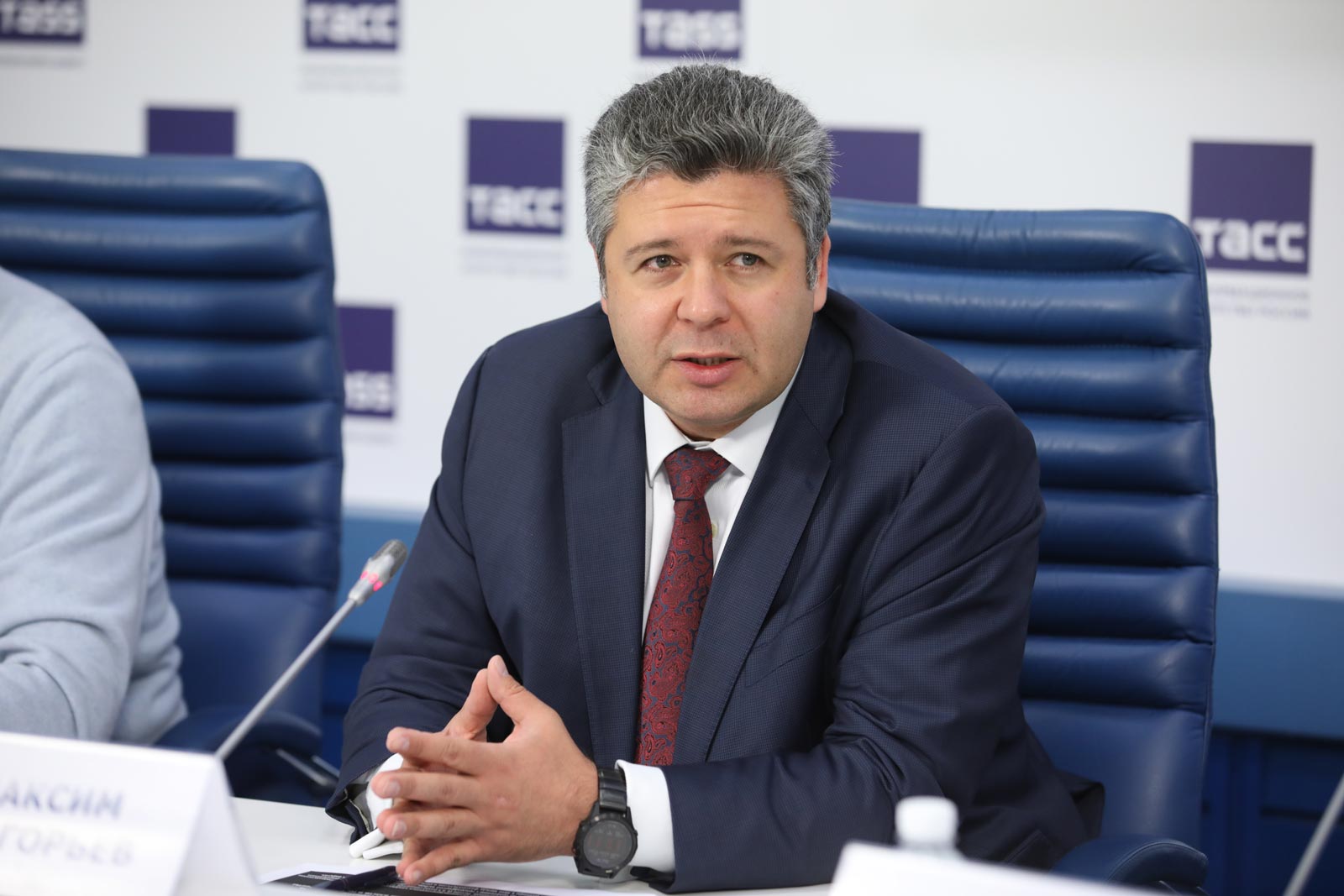
In 2018, civil society was involved in resolution of numerous conflicts. Thus, these were the activists, who forced the state authorities, local governments to become focused on environmental issues, to preserve, rehabilitate landfills, to attend to the construction of waste recycling plants, to control more strictly and prevent air pollution, water bodies. This work is not finished, constant efforts are needed here, and being under pressure from the public, the authorities understand this today.
The NPOs paid a lot of attention to social issues, helping children, families in difficult life situations, disabled people, generally considered the problems of poverty, social injustice, trying to remedy the situation, to make their contribution to its improvement. The Civic Chamber of the Russian Federation made a comprehensive investigation of this problem at the “Community” Forum in Ufa in April 2018, together with representatives of various subject regions of the Federation.
The public did not stand aloof from discussing pension reform, the quality and accessibility of medical care, and made a great contribution to improving the housing and utilities system by organizing effective control over management companies where they were inactive.
Social infrastructure development depends directly on the success of the economy. In its turn, economic development in the modern world is closely linked to innovation. Our country has been working successfully for a long time on search, support of talented people, aimed at the companies’ targets. For 25 years, the Innovation Assistance Fund has been operating in the country, with a network of regional representatives in 72 regions of the Russian Federation. During this time, the fund supported more than 32 thousand projects, including 6500 startups and 17 500 young innovators. The Fund has financed 410 projects within the framework of the implementation of plans for activities (road maps) of the National Technology Initiative in the amount of almost 7 billion rubles. And yet this is clearly not enough to recognize that today all conditions have been created in Russia to develop and implement breakthrough solutions: the number of innovations is still small, the created innovation system as a whole remains ineffective202 Why does the innovative system stall, how to raise the champion companies and who should build bridges between science and industry? // Website of the Civic Chamber of the Russian Federation, 20.06.2018: https://www.oprf.ru/press/news/2018/newsitem/45721..
The Civic Chamber of the Russian Federation repeatedly addressed this problem. In the course of the expert discussions, it was founds that barriers to innovation remain. Firstly, the public procurement system today works by a single criterion – the price, while innovators with their new proposals often turn out to be uncompetitive, government orders should be focused on creating products with a long-term perspective203 Startup valley, venture funds, acceleration programs: drivers of innovative economy development // Website of the Civic Chamber of the Russian Federation, 21.06.2018: https://www.oprf.ru/press/news/2018/newsitem/45737.. Secondly, the lack of practice of issuing a loan for the idea. There is still no reliable system for evaluating startups. Innovators, as a rule, have an idea and need funds for its development, and getting a loan with just an idea, even expressed in a patent, is almost impossible. Thirdly, there is no system for evaluating the practical relevance of patents. Fourthly, there remains unbalanced antimonopoly policy.
It is essential to take into account the views and experience of business and trade unions when making responsible decisions by the authorities in the field of industrial and economic policy204 Why does the innovative system stall, how to raise the champion companies and who should build bridges between science and industry? // Website of the Civic Chamber of the Russian Federation, 20.06.2018: https://www.oprf.ru/press/news/2018/newsitem/45721..
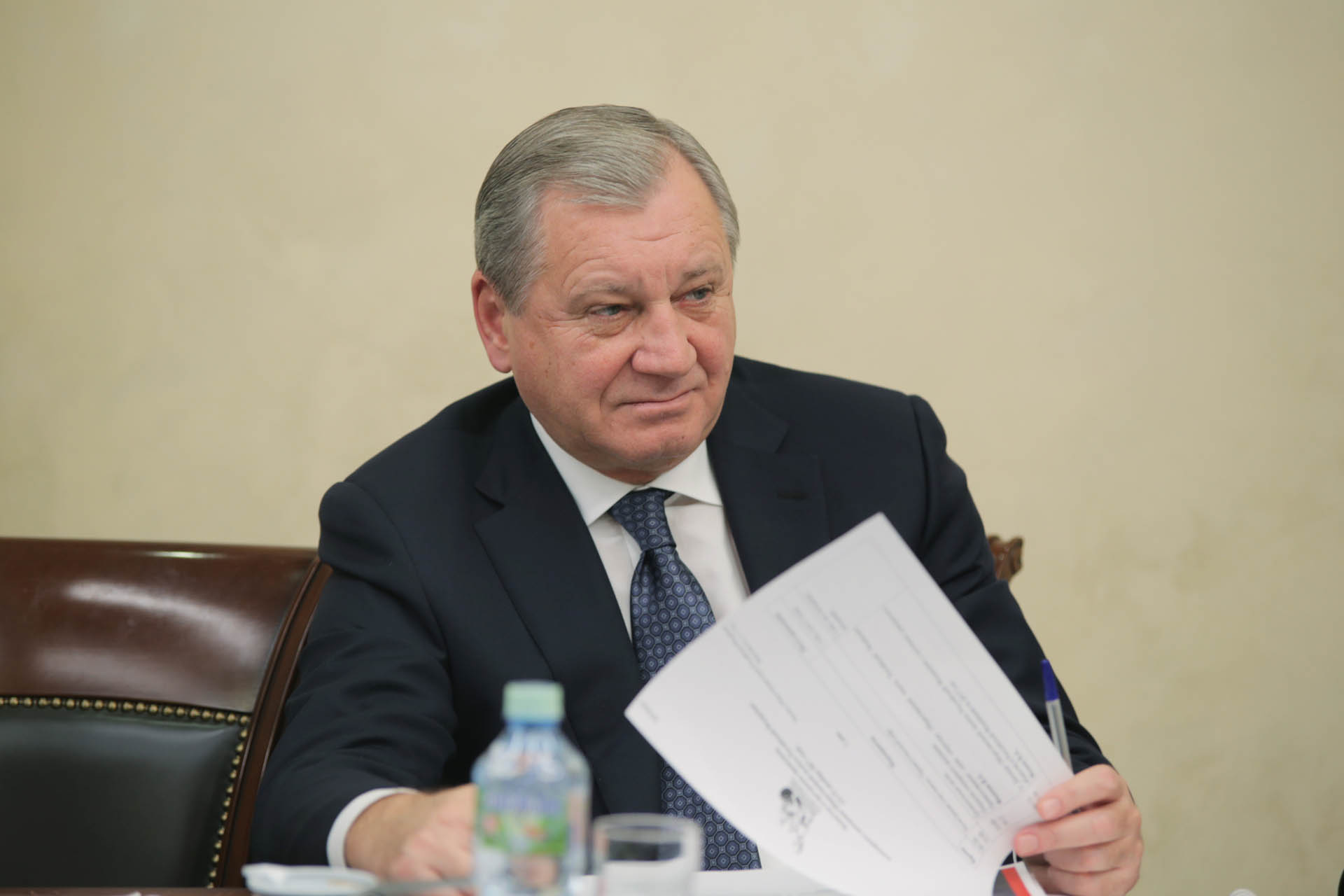
The Civic Chamber of the Russian Federation receives many inquiries from businessmen and the Chamber tries to help in protecting small, medium and large businesses.
However, there are many different systemic problems that also need to be addressed, including at the legislative level.
In particular, the conditions for the withdrawal of self-employed citizens from the shadows have not yet been properly worked out. The earlier reform of their legalization did not bring the expected results (a little more than a thousand people were legalized).
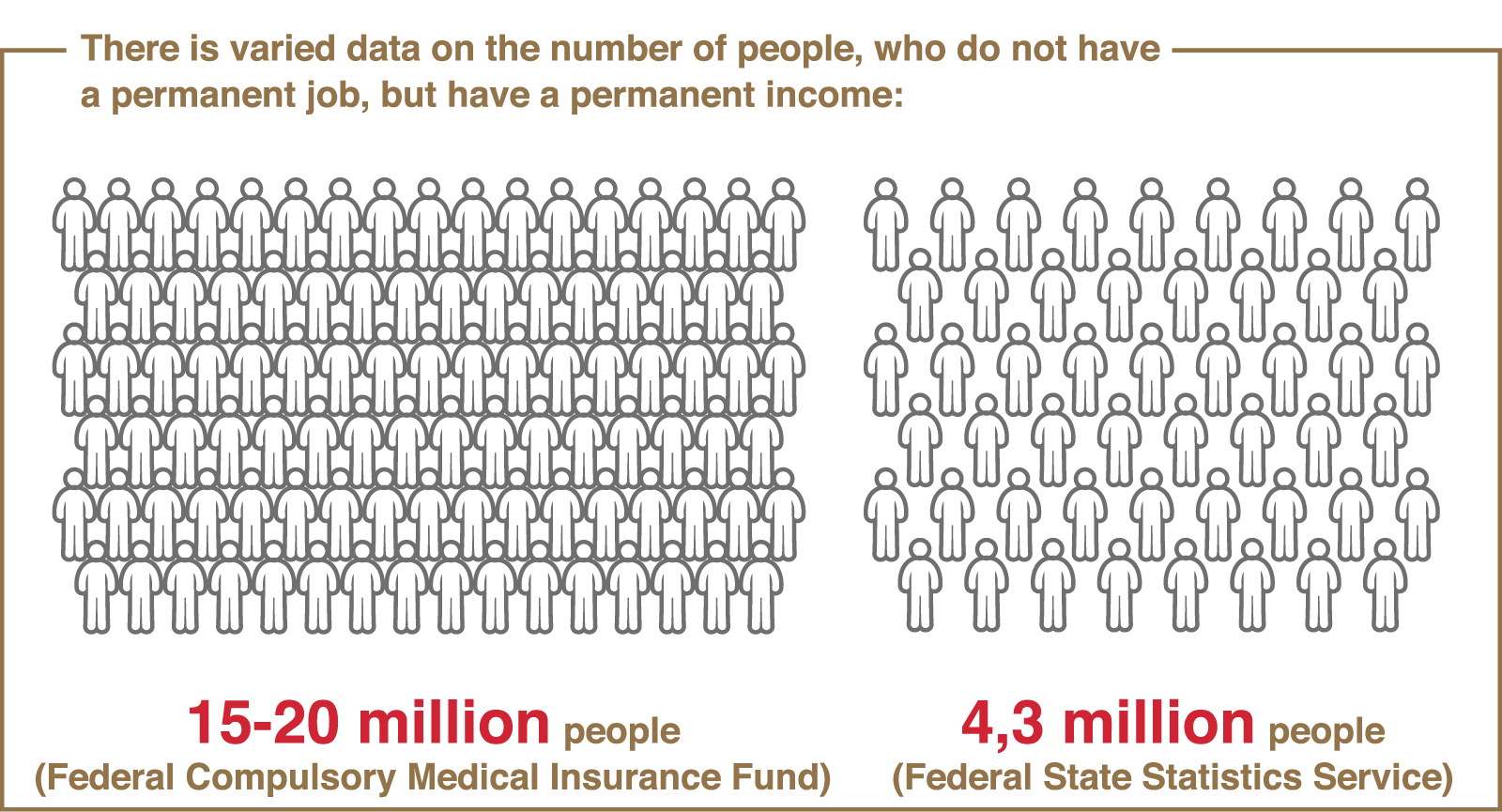
In 2018, the Civic Chamber of the Russian Federation held a zero reading of two different bills on self-employed citizens: April 6-draft law by the Ministry of Finance of the Russian Federation205 “Self-employed people are not criminals, it is important to take them out of the shadows” – Lydia Mikheeva // Site of the Civic Chamber of the Russian Federation, 06.04.2018: https://www.oprf.ru/press/news/2018/newsitem/44848., June 14-draft law by the Ministry of Justice of the Russian Federation206 The Civic Chamber of the Russian Federation will prepare its concept of the legal status of the self-employed // Site of the Civic Chamber of the Russian Federation, 14.06.2018: https://www.oprf.ru/press/news/2018/newsitem/45648.. The main problem, according to public activists, is that the authorities cannot find a unified approach to determining the status of self-employed citizens. It is important not only to create comfortable conditions for legal registration of entrepreneurship, but also to make communication with the fiscal authorities for these people as simple, safe and mutually beneficial as possible207 The Civic Chamber of the Russian Federation will prepare its concept of the legal status of the self-employed // Site of the Civic Chamber of the Russian Federation, 14.06.2018: https://www.oprf.ru/press/news/2018/newsitem/45648..
On November 15, the State Duma of the Russian Federation adopted a package of laws on conducting in four regions (Moscow, Moscow and Kaluga Regions, Tatarstan) an experiment on imposing a tax on professional income (the Law on Self-Employed)208 The State Duma adopted the law on income tax for self-employed // Interfax, 15.11.2018: https://www.interfax.ru/russia/637958..
Also, the Civic Chamber of the Russian Federation noted the importance of supporting social entrepreneurs. This type of business creates not only an economic effect, but also a social one: it makes you move from a passive position – “the state solves all problems” – to the position “I saw the problem – I took it and managed it”209 Based on the materials sent at the request of the Civic Chamber of the Russian Federation, from the Civic Chamber of the Republic of Bashkortostan.. On November 14, 2018, the Civic Chamber of the Russian Federation held a zero reading of the draft law developed by the Ministry of Economic Development. In general, the Civic Chamber supports the bill210 The bill as a symbol: easy start for social entrepreneurs // Website of the Civic Chamber of the Russian Federation, 14.11.2018: https://www.oprf.ru/press/news/2018/newsitem/47311..
During the work of the section “Economic development and improvement of the quality of life of people” at the final “Community” Forum in Moscow on November 2, 2018, it was noted that no department is responsible for the production of competitive non-commodity goods today. There are no breakthrough solutions in the implementation of the National Project “Small and Medium Entrepreneurship”. Thus, experts note that support for small and medium-sized businesses will only have a positive result when the reforms of control and supervisory bodies are completed. And the issue of reform must be taken under public control.
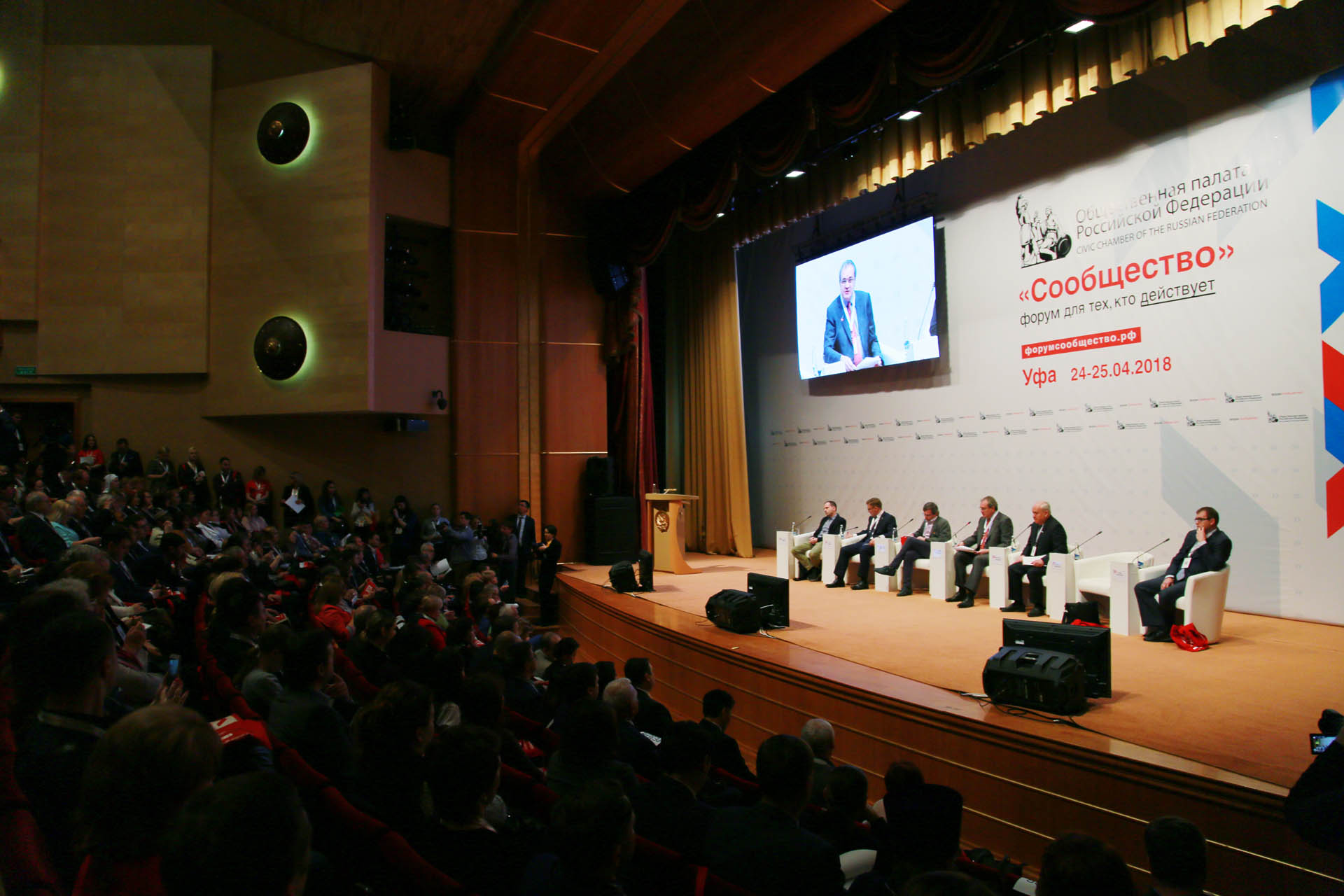
It is from the position of creating conditions for the development of innovations and the reflection of the provisions laid down in the May Presidential Decree of September 27, 2018 in the Civic Chamber of the Russian Federation the draft federal budget for 2019 and the planning period 2020 and 2021 were discussed. Social activists noted that, unlike budgets of the past years, the document demonstrates a consistent approach to solving important problems.

At the same time, members of the Civic Chamber of the Russian Federation made a number of comments on the parameters of the submitted draft budget. In particular, serious doubts were raised by the reasonableness of the rates of economic growth presented in the forecast211 Restrained optimism and emphasis on national projects: the draft budget until 2021 was examined by the Civic Chamber of the Russian Federation// Site of the Civic Chamber of the Russian Federation, 27.09.2018: https://www.oprf.ru/press/news/2018/newsitem/46725..
Social policy has traditionally been the focus of attention of the Civic Chamber of the Russian Federation.
Ensuring equality of citizens in access to social and economic benefits, income growth and improvement of the quality of life of all social groups was the main topic of discussion at the “Community” Forum on April 24-25 in Volga Federal District. It noted that ensuring a high quality of life for all social categories requires a new approach.
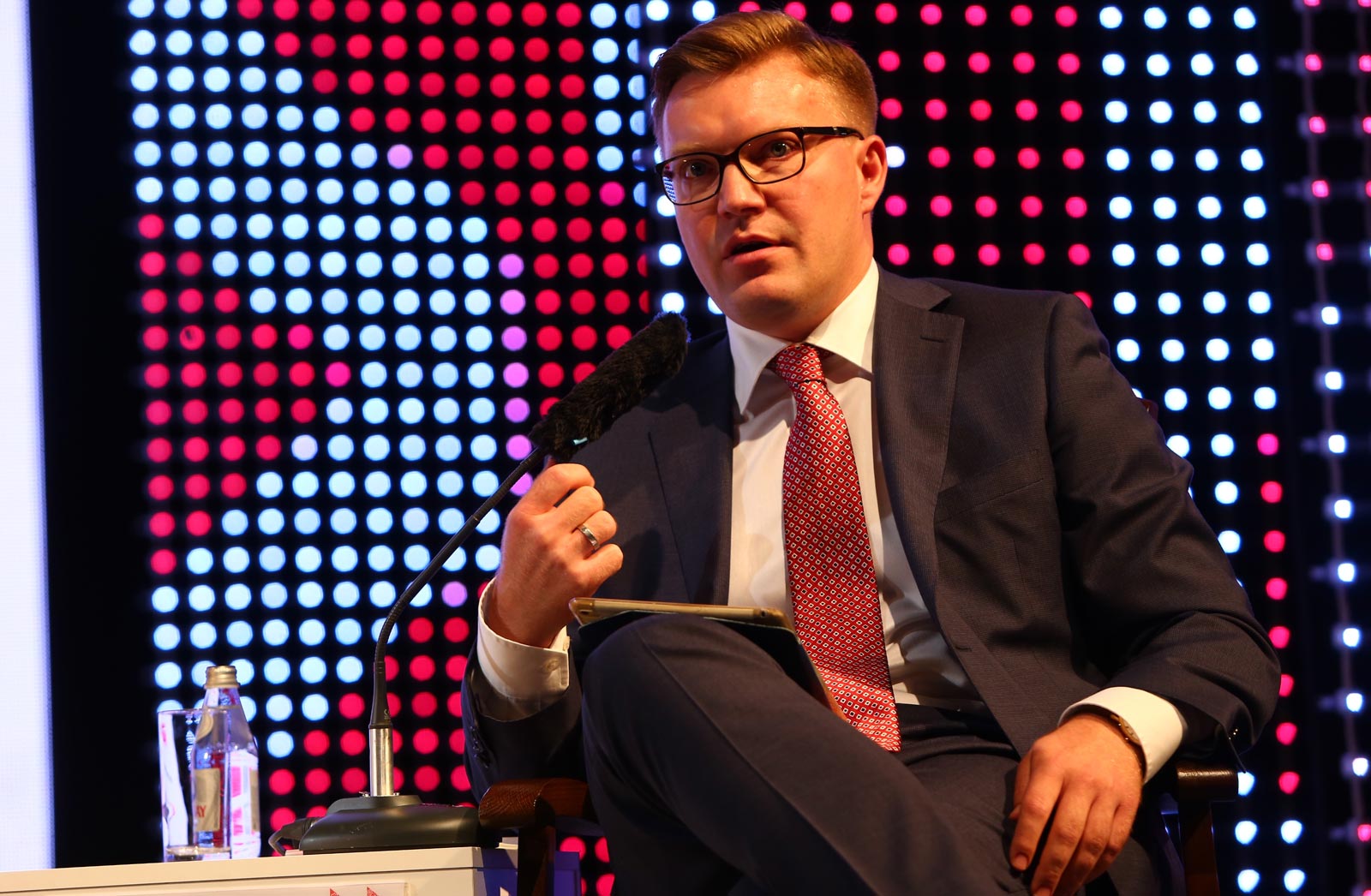
During the forum, a lot of proposals were made, submitted later for consideration to the public authorities, in particular:
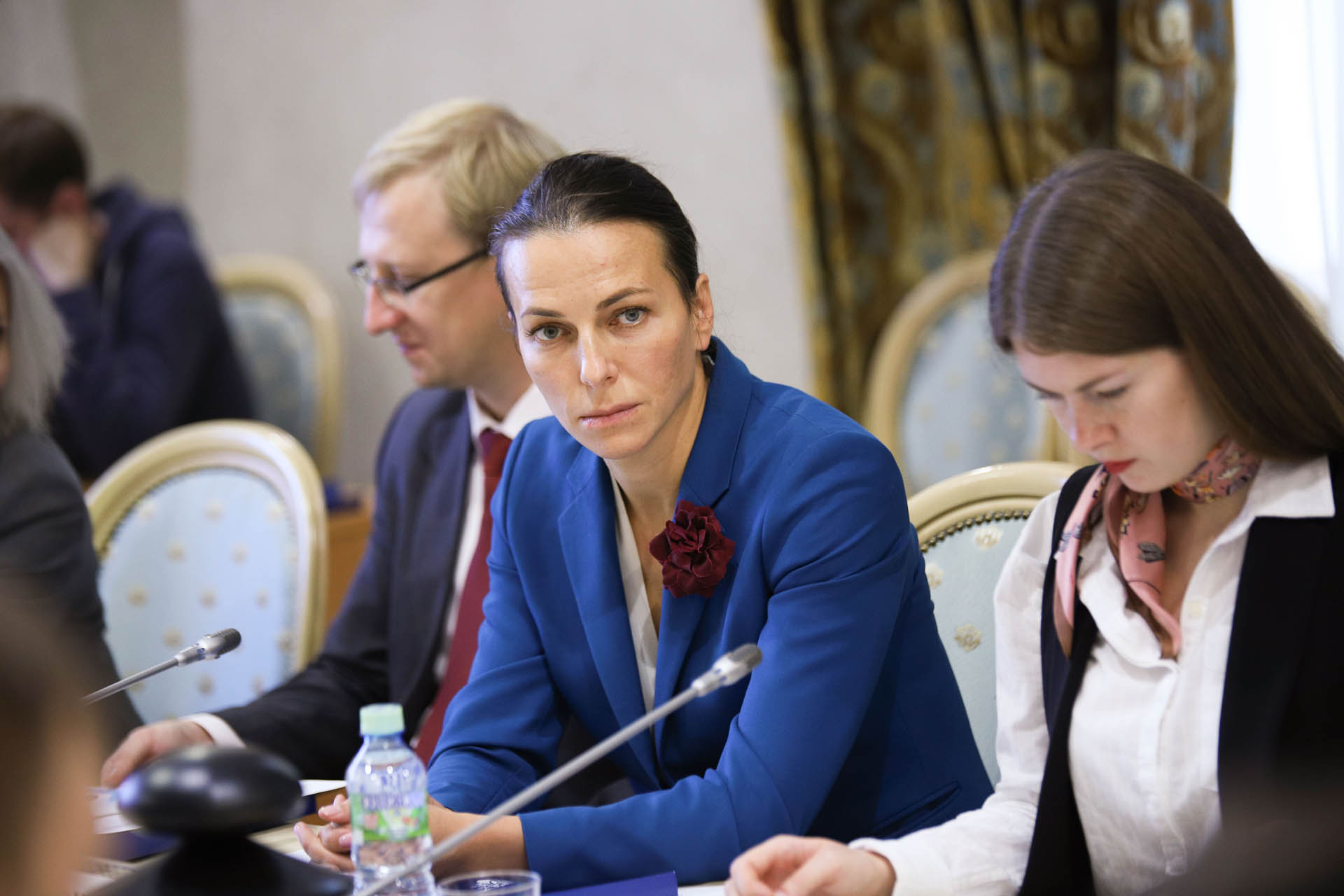
As a follow-up to the Decree of the President of the Russian Federation of May 29, 2017 № 240, on the basis of which the beginning of the Decade of Childhood was announced213 Decree of the President of the Russian Federation of 19.11.2018 № 662 “On the Council under the President of the Russian Federation for the implementation of state policy in the field of protection of family and children” // Official Internet portal of legal information: http://publication.pravo.gov.ru/Document/View/0001201811190012., the Government of the Russian Federation developed the Action Plan214 Order of the Government of the Russian Federation of July 6, 2018 №1375-r.: http://static.government.ru/media/files/sZ1Pt6qoNGaXsiXVpTXlSJc3svtwE2HE.pdf.. The Civic Chamber of the Russian Federation became an active participant in the development of this plan, and some of its proposals were included in the final version of the document, including those related to the analysis of the efficiency of social support measures for families with children, holding a “gift to a newborn” campaign in the subject regions of the Russian Federation, determining the content of child care services, establishment of requirements for specialists in child care.
The Civic Chamber of the Russian Federation, in accordance with the Government’s plan (para.94), has received the right to develop proposals aimed at reforming the system of prevention of abandonment and juvenile delinquency, the end result of which will be a reduction in the number of street children and abandoned children215 Decree of the President of the Russian Federation of 19.11.2018 № 662 “On the Council under the President of the Russian Federation for the implementation of state policy in the field of protection of family and children” // Official Internet portal of legal information: http://publication.pravo.gov.ru/Document/View/0001201811190012..
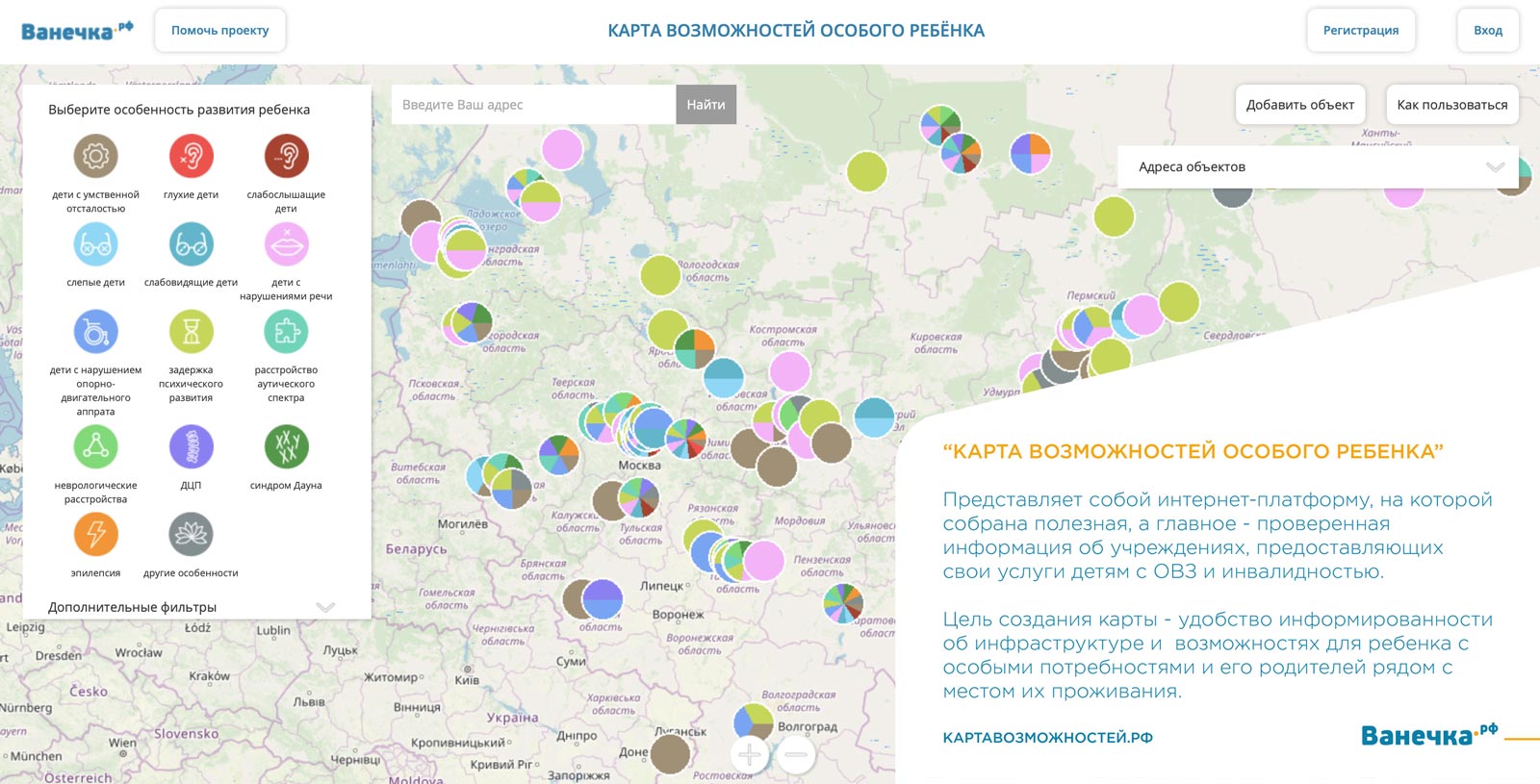
In 2018, the Civic Chamber of the Russian Federation held a contest of social innovations and services quality “All the Best to Children!” In accordance with the recommendations of regional civic chambers and authorities, 175 non-governmental non-profit organizations took part in the contest, 103 of which passed expert selection and voluntary certification with the award of the “The Best to Children” quality mark.
For the second year, the Civic Chamber of the Russian Federation has a hotline for removal (withdrawing) of children from families. During this time, the Chamber has considered more than a dozen of such cases.
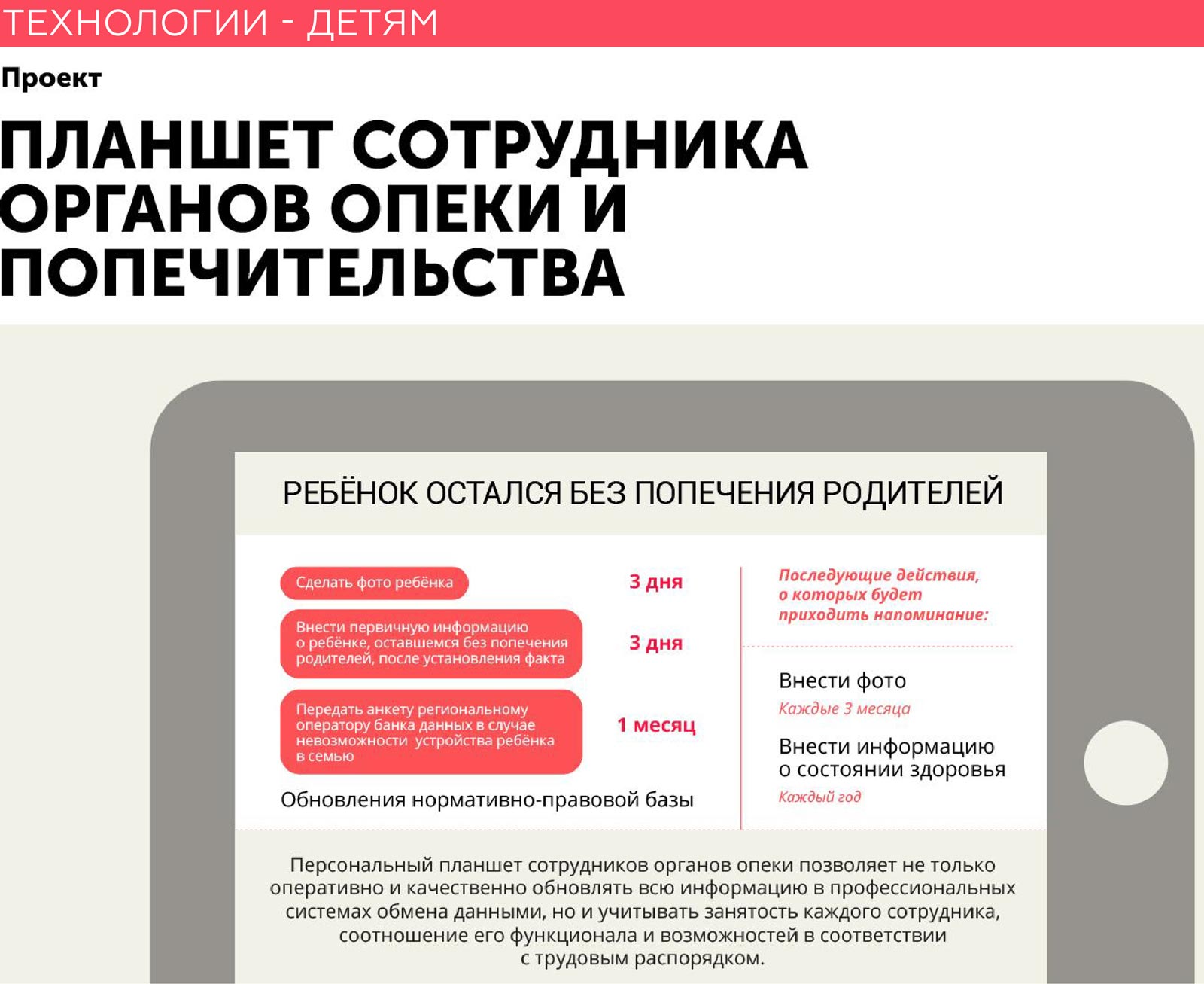
During the discussions at the Chamber’s events, it was noted that in the regions there were cases of de facto discrimination of children on a social basis, when children are withdrawn from low-income families and transferred to substitute families, who are paid quite enough funds for the maintenance of minors216 Poverty is not a reason to take the children out of the family: Social activists get into argument with officials//Website of the Civic Chamber of the Russian Federation, 26.04.2018: https://www.oprf.ru/press/news/2018/newsitem/45070..
One of the discussion forums of the “Community” Forum in Ufa was dedicated to this issue. The arguments of public activists have caused mixed reactions from the officials present. Nevertheless, during the discussion the guardianship authorities were suggested to exclude the material security of the family from the criteria on which the child’s withdrawal from the family is decided217 Scandal in Ufa: officials did not want to talk about the removal of children for poverty // IA Regnum, 28.04.2018: https://regnum.ru/news/2409940.html..
In addition, there are quite a number of complaints to the Civic Chamber of the Russian Federation from the potential surrogate families and the actions of the guardianship authorities. Their work remains bureaucratic, reliable information to the candidates to parents about children is not provided in a timely manner, due to which the process of placing a child in a family is prolonged218 “Wall of misunderstanding between potential parents and officials”//Website of the Civic Chamber of the Russian Federation, 08.08.2018: https://www.oprf.ru/press/news/2018/newsitem/46217.. There is no open information on the priority of adoption, and this allows the guardianship authorities to demand money for adoption of children, as, for example, happened in Sverdlovsk Region219 Russia’s Investigative Committee checks media reports on child trafficking by guardianship authorities in Yekaterinburg//Kommersant, 04.04.2018: https://www.kommersant.ru/doc/3593288..
The Civic Chamber organized a hotline to identify the problems faced by potential caregivers and parents220 Hotline for candidates for guardians or adoptive parents facing problems, opened in the Civic Chamber of the Russian Federation//Website of the Civic Chamber of the Russian Federation, 03.08.2018: https://www.oprf.ru/press/news/2018/newsitem/46184..
It is obvious that the system of family organization of children needs reforming. This year, the Ministry of Education of the Russian Federation started developing a draft law on changing the procedure for family placement of children, in particular, it is proposed to introduce a psychological examination of the family, including family members living with the guardian / adopter. In August 2018, the Civic Chamber of the Russian Federation hosted a roundtable on “Improving legislation in the field of family structure”. The participants made recommendations to the document. The Ministry of Education promised to take into account the views of adoptive parents and experts221 Acting in the interests of children: the Civic Chamber of the Russian Federation discussed a bill tightening the requirements for adopting parents and guardians//Website of the Civic Chamber of the Russian Federation, 30.08.2018: https://www.oprf.ru/press/news/2018/newsitem/46382..
Within the framework of the project “Technologies for Children”, digital solutions are being developed at the site of the Civic Chamber aimed at increasing the transparency and efficiency of the sphere of family planning and system help to families with children, including the adopted ones: “Electronic portfolio of a child using distributed registry technologies”222 Innovations in social sphere and education: a breakthrough with blockchain technology //Site of the Civic Chamber of the Russian Federation, 20.06.2018:https://oprf.ru/press/news/2018/newsitem/45716., “Tablet of specialists of guardianship and trusteeship bodies”, “Special Child’s Opportunities Map”223 “Special Child’s Opportunities Map: A project for parents raising children withdisability // Site of the Civic Chamber of the Russian Federation, 06.09.2018:https://oprf.ru/press/news/2018/newsitem/46464..
An important topic for the Civic Chamber of the Russian Federation is the monitoring of organizations for orphans. Since 2015, Russia has been reforming the system of orphanages. They must depart from the previous methods of work of barracks, collective institutions. The new federal requirements are designed to make the organization of temporary places of assistance and rehabilitation, arranged by family type.
The monitoring was organized by the Ministry of Education of the Russian Federation in 2018 and took place in all regions of the Russian Federation with civic chambers engaged. Criteria for assessing the work of organizations for orphans were determined with the engagement of the Civic Chamber of the Russian Federation224 “It is necessary to create conditions and return orphans to families” – Elena Alshanskaya // Website of the Civic Chamber of the Russian Federation, 09.02.2018: https://www.oprf.ru/press/news/2018/newsitem/43954.. The Chamber acts as a methodical center for the regional chambers in the process of monitoring.
The main task of the research is to understand whether the quality of life of the child has changed in the organization after the entry into force of the RF government Regulation of May 24, 2014 No. 481 “On activities of organizations for orphans and children left without parental care, and on children left without parental care”. According to the results of monitoring, the Civic Chamber of the Russian Federation will analyze not only the activities of organizations for orphans, but also the activities of regional boards on organizing the engagement of NPOs representatives in public monitoring.
Another problem for orphans, raised by the Civic Chamber of the Russian Federation is the absence legal of obligations assigned to any of the departments to provide care when an orphaned child is hospitalized or left without parental care. As practice shows, in a large number of medical institutions in Russia, children left without parental care are deprived of proper care. To such a child, sometimes for a day, nobody of the medical staff approaches even once throughout a day, either to feed, or to give water or to change diapers. The Civic Chamber of the Russian Federation has repeatedly drawn this intolerable situation to the attention of the health and care authorities. However, there must be an interested and constant engagement of both citizens and NPOs to achieve the obvious: no child without parents under five should stay in the hospital ward without supervision, one of the adults should always be with him – a medic, a nanny, a volunteer. The Civic Chamber of the Russian Federation proposes to respond to each case of abandonment of the orphan in danger, to make a list of medical institutions, where such cases are recorded, in order to establish order in these institutions225 NPO call for escorting orphans in hospitals // Social Information Agency, 12.02.2018: https://www.asi.org.ru/news/2018/02/12/deti-siroty-bolnitsy/.
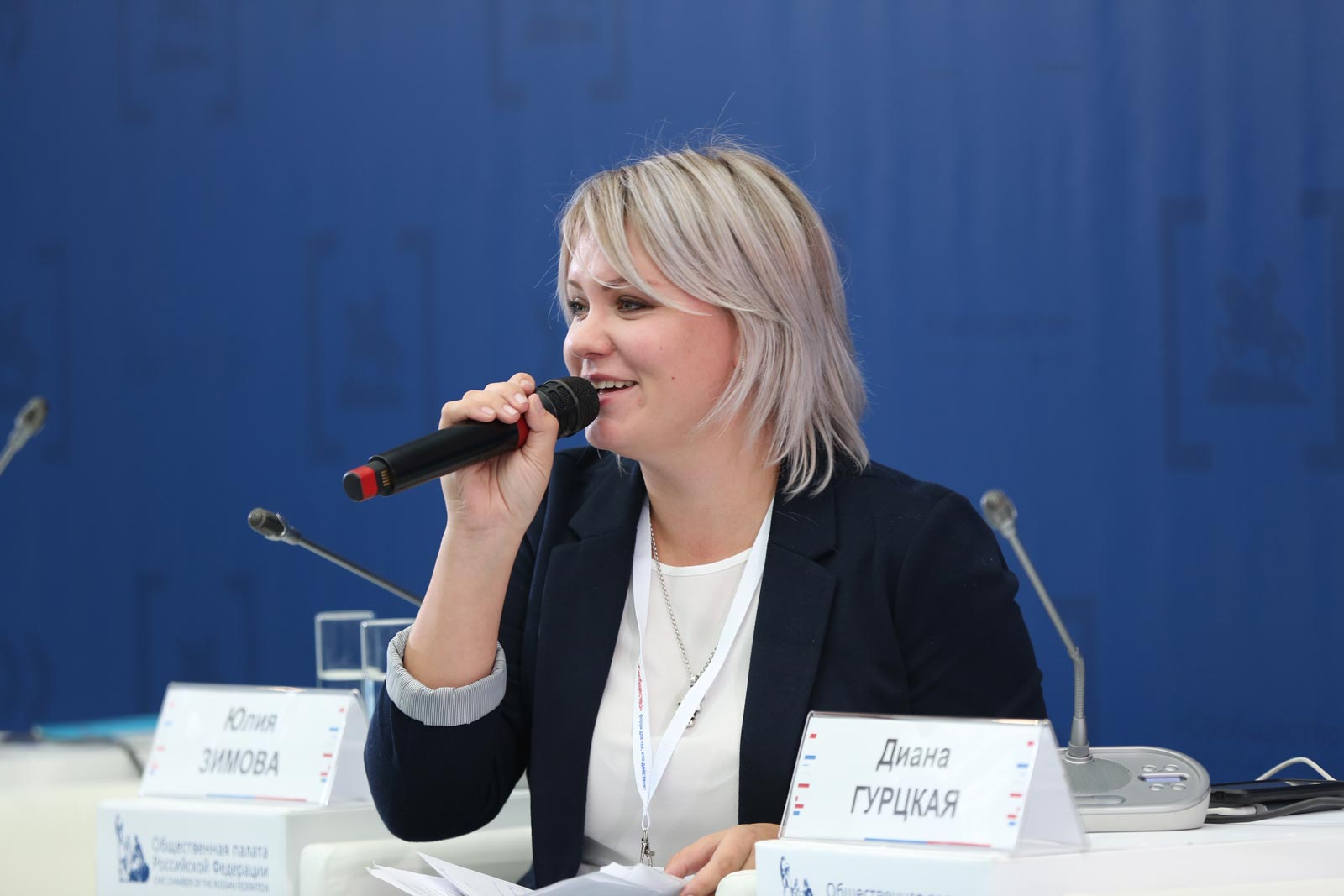
It was also proposed to introduce a nurse in orphanages, who could accompany children during long-term treatment, as well as legalize assistance to pupils of orphan institutions by adding it to the list of services of socially oriented NPOs funded from the state budget226 Orphans in hospitals will be placed under the supervision of nannies from NPO // ommersant, 26.12.2016: https://www.kommersant.ru/doc/3181693..
An important problem in preserving the health of the younger generation is the provision of psychological, educational, medical and social assistance to children from birth to three years old. Such assistance helps to identify features and disorders in the child’s development to prevent or correct pathologies. Now the service of early help is provided only periodically, although it is obvious that it should be continuous and family oriented. In 2016, the Government of the Russian Federation adopted the Concept for the Development of Early Assistance in the Russian Federation227 The Order of the Government of the Russian Federation of August 31, 2016 N 1839-p “On approval of the Concept for the development of early assistance in the Russian Federation for the period up to 2020”: http://static.government.ru/media/files/7NZ6EKa6SOcLcCCQbyMRXHsdcTmR9lki.pdf., which stipulates that there should be regional systems of early assistance in the subject regions of the Federation.
But the Civic Chamber of the Russian Federation, having considered this issue with the involvement of specialists, came to the conclusion that the measures taken were not enough, it was proposed to create working groups by region, consisting of representatives of departments, socially oriented NPOs, entrepreneurs and experts, in order to transfer the main powers to identify early stages of life impairment in the development of the child and the provision of rehabilitation to the health care system, as well as to enshrine in law the term “early help”228 Early assistance to children: in time to identify violations and begin rehabilitation // Website of the Civic Chamber of the Russian Federation, 28.05.2018: https://www.oprf.ru/press/news/2018/newsitem/45420..
During the direct line of the President of the Russian Federation on June 7, a multi-child mother from Tomsk addressed Vladimir Putin with a complaint that she did not receive a plot of land she is entitled to by the law229 Direct line with Vladimir Putin: comments of public representatives on the most urgent issues//Website of the Civic Chamber of the Russian Federation, 07.06.2018: https://www.oprf.ru/press/news/2018/newsitem/45583.. Another multi-child family was denied benefits due to lack of permanent residency registration230 Multi-child family was denied benefits due to lack of permanent residency registration // Saratov24, 14/08/2018: https://saratov24.tv/news/mnogodetnoy-seme-ne-khoteli-predostavlyat-lgoty-iz-za-otsutstviya-postoyannoy-propiski/.. These and many other petitions have shown again how many problems remain for multi-child families.
In April 2018 the Civic Chamber of the Russian Federation conducted a poll among three thousand multi-child families from 53 regions of Russia to find out what social support measures are in demand, what measures are effective, what are needed, but not easy to obtain and what are not needed at all. It turned out that most parents were concerned about medicine, housing and land plots231 Multi-child families are not aware of the benefits they are entitled to // Izvestiya, 23.04.2018: https://iz.ru/724601/roman-kretcul/mnogodetnye-semi-ne-znaiut-o-polozhennykh-im-lgotakh. . The Civic Chamber of the Russian Federation had prepared proposals for the draft bill on the status of a multi-child family232 Big poll of the Civic Chamber of the Russian Federation: 3000 families from all over Russia talked about difficulties in obtaining benefits//Website of the Civic Chamber of the Russian Federation, 09.04.2018: https://www.oprf.ru/press/news/2018/newsitem/44852..
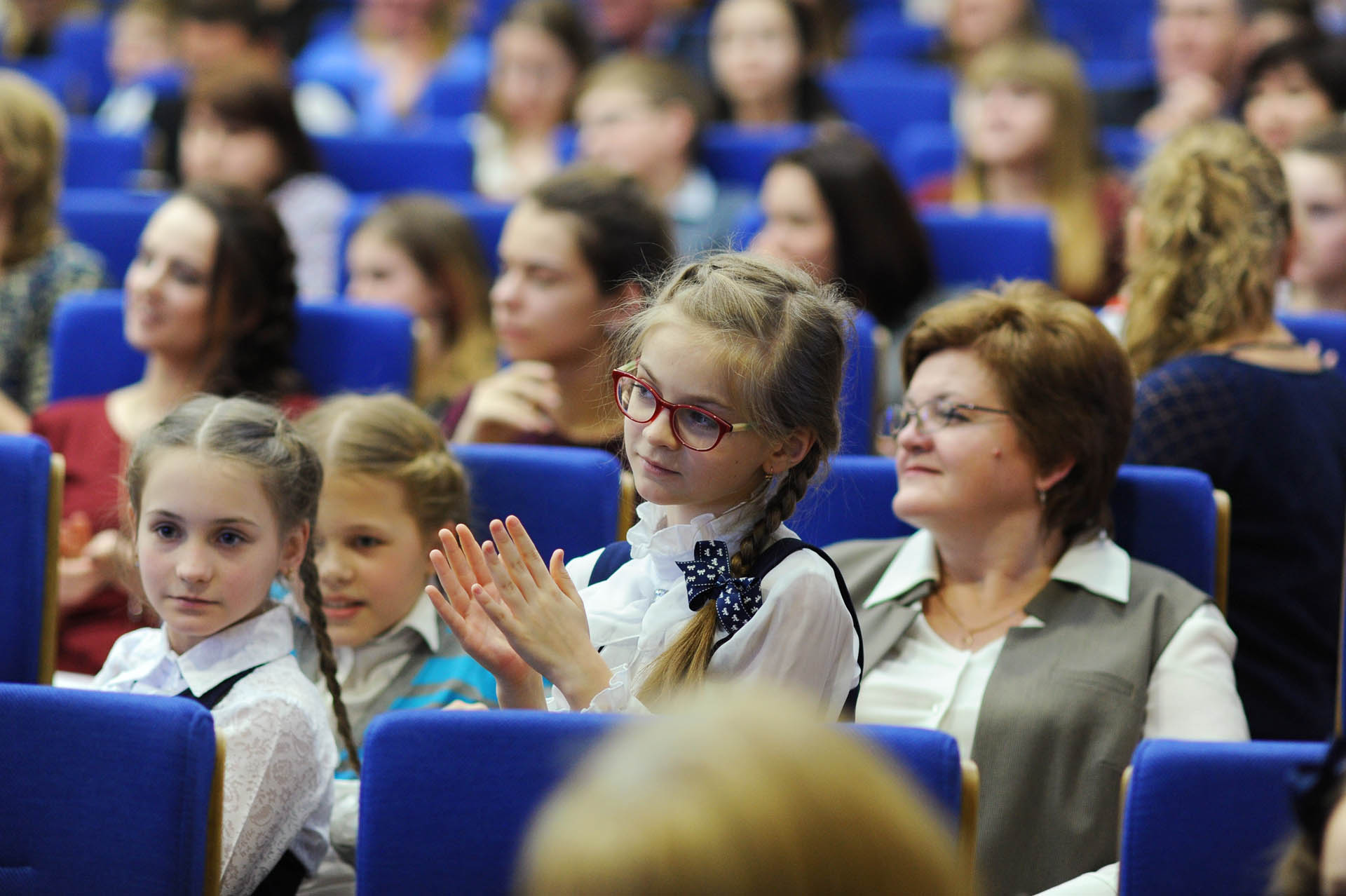
According to the Federal State Statistics Service, 611 436 divorces were registered in Russia in 2017, and in the first half of 2018 almost 349 368 divorces, which is by 1550 more than in the same period of last year. In this case, 190 300 divorced pairs had one child, and 170 057 had two or more children. There are often situations when one parent illegally deprives the child from the other parent. According to the data provided by the Federal Bailiff Service, in the first seven months of 2018 the office recorded 560 such cases233 Childhood after family: Russia discusses how to protect minors from vigilanteism of divorced parents // RT, 24.09.2018: https://russian.rt.com/russia/article/557700-sazhat-v-tyurmu-ne-stoit-v-rossii..
Today, the offender parent can incur only administrative responsibility in the amount of two to three thousand rubles for the abduction of a child, and for a repeated violation-from four to five thousand rubles or get an administrative arrest for up to 15 days. And when divorced, wealthy parents, despite the decisions of the courts, practically steal children, constantly change their place of residence, keep mothers in complete obscurity about the fate of children.
The Civic Chamber of the Russian Federation has repeatedly pointed to the inadmissibility of such situations234 St. Petersburg deputies call for improving the law on the place of residence of children after divorce // Website of the Civic Chamber of the Russian Federation, 10/18/2018: https://www.oprf.ru/press/832/newsitem/46958.. During the discussion of the problem of family kidnapping in April 2018, the Civic Chamber of the Russian Federation raised the issue of introducing criminal liability for abduction of children by one of the parents if the parent repeatedly commits an offense and if the court decision is not executed. In this regard, it is important to expand the functions of bailiffs, who should monitor the execution of the court decision235 Family kidnapping: what to do when a child is kidnapped by a parent? // Website of the Civic Chamber of the Russian Federation, 26.04.2018: https://oprf.ru/press/news/2018/newsitem/45091..
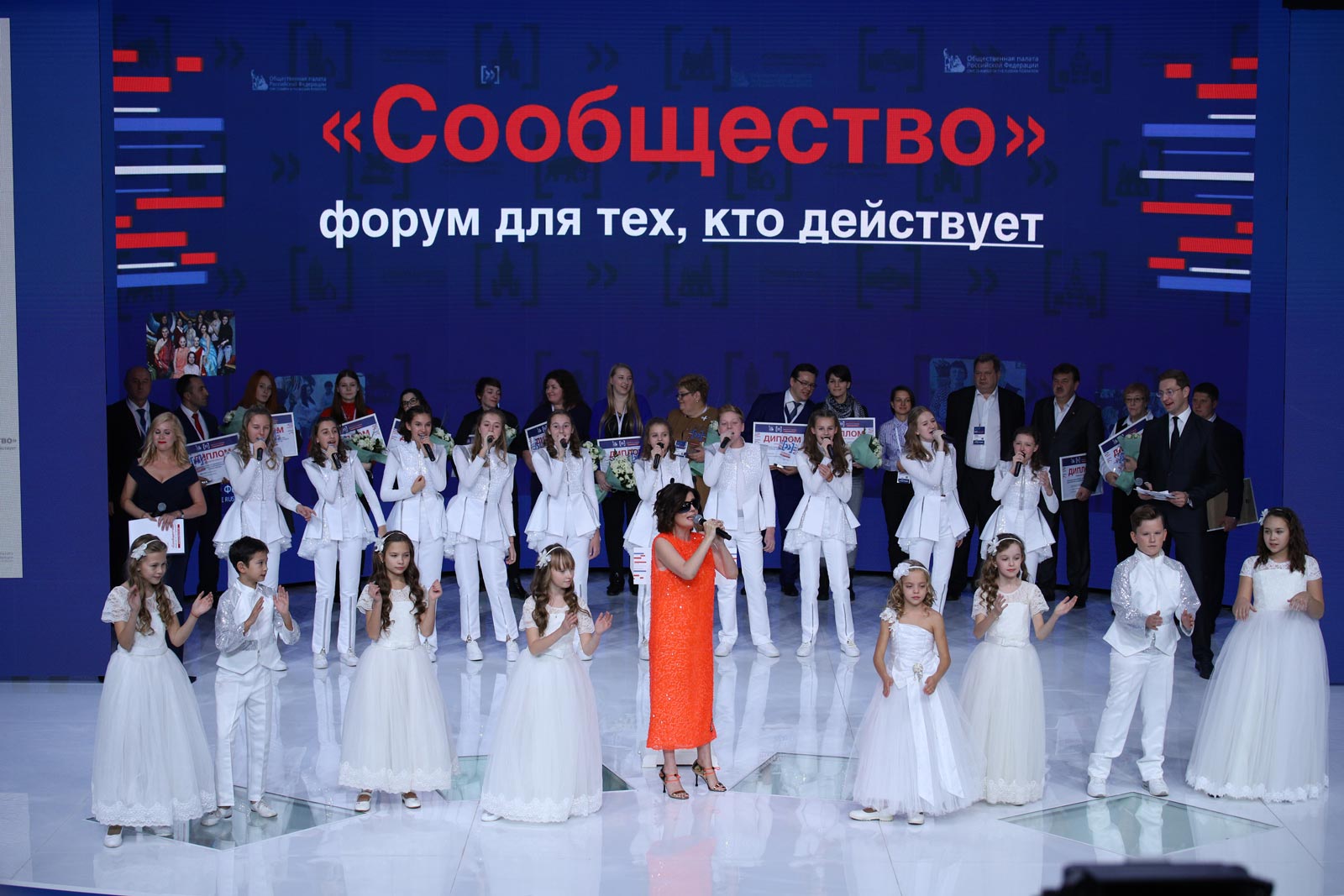
The Civic Chamber of the Russian Federation responded to the events that required quick civil intervention. Thus, after an outrageous case in one of the private kindergartens of Astrakhan, in which the teacher treated children cruelly, it considered the problems of pre-school education and offered to return the concept “nursery” to the Federal Law of December 29, 2012 No. 273-ФЗ “On Education in the Russian Federation “and the definition of childcare and care as a public social service, and suggested the Ministry of Labor and Social Protection of the Russian Federation to adopt the developed draft standard of the nanny (child minding employee) and introduce compulsory certification or licensing for child minding services236 “Safety in private kindergartens should be strictly regulated” – Sergey Rybalchenko // Site of the Public Chamber of the Russian Federation, 10.08.18: https://www.oprf.ru/press/news/2018/newsitem/46228.. In November 2018 year this standard was approved by the Ministry. In accordance with it, in 2019, with the support of the Civic Chamber of the Russian Federation, projects on the creation of regional systems of certified nannies will be implemented.
On October 17, 2018, a massacre was committed at Kerch Polytechnic College. According to investigators, the attacker was a student of the fourth year of the college. After the attack, a young man committed suicide237 Tragedy in Kerch: efforts to address communities that promote violence among adolescents are insufficient//Website of the Civic Chamber of the Russian Federation, 18.10.2018: https://oprf.ru/press/news/2018/newsitem/46954.. This tragic case is not the first one in Russia.
As practice shows, such cases are often provoked by negative messages spread on the Internet. According to the Monitoring Center “Security 2.0”, which operates under the Civic Chamber of the Russian Federation, groups containing dangerous content have begun to appear more often on social media238 “Security 2.0”: Spread of online communities on Columbine School massacre alarming // Website of the Civic Chamber of the Russian Federation 13.03.2018: https://oprf.ru/press/news/2018/newsitem/44474.. And, according to experts, the popularity of online violence about the public is growing, as well as the growing number of requests, for example, about the massacre in American schools. The center revealed a number of potentially dangerous communities, the total audience of which amounted to more than 11 thousand people, in which the school shooting theme was popularized (literally – shooting in educational institution, at school). At its hearings and round tables, the Civic Chamber of the Russian Federation has repeatedly called upon the educational authorities to reconsider the approach to secondary schools, in which they often completely neglect raising children and adolescents. In addition, psychologists should work in schools, and teachers should take refresher courses in order to know how to stop harassment of schoolchildren and other deviant manifestations in children’s communication with each other. Schoolchildren themselves need to explain that it is important to inform teachers if someone from their classmates threatens to use violence. This will help to identify children at risk.
In September 2018, the Round Table Fighting Columbine Communities was held at the Civic Chamber of the Russian Federation. Who will be blocked in social media239 The Civic Chamber of the Russian Federation will consider a bill on Columbine communities // Website of the Civic Chamber of the Russian Federation, 27.09.2018: https://www.oprf.ru/press/news/2018/newsitem/46718.? “The participants discussed a bill, under which Internet resources and groups in social media, where there is information encouraging children to commit illegal actions, will be immediately blocked240 The Civic Chamber of the Russian Federation will consider a bill on Columbine communities // Website of the Civic Chamber of the Russian Federation, 27.09.2018: https://www.oprf.ru/press/news/2018/newsitem/46718..
Today, it is important to conduct cybersecurity education in schools, but specialists who are ready to conduct such specialized training are not enough, though civil initiatives emerge in this area. So, at the final forum Community in Moscow, a project of cyber patrols was presented for tracking the inaccurate information disseminated in social media and electronic media.
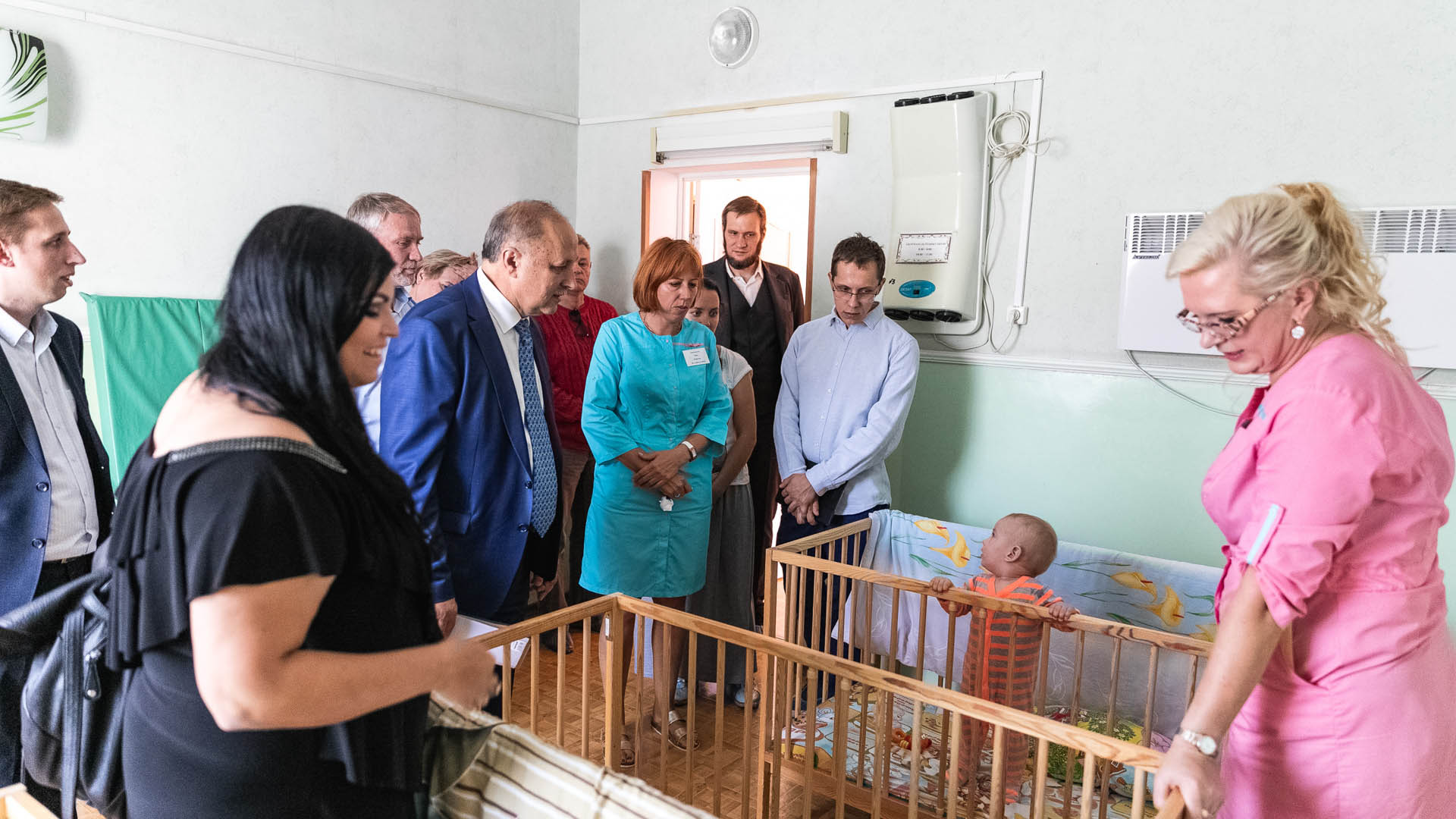
On June 29, the Civic Chamber of the Russian Federation hosted a round table “Do not play the hero, but be it: innovative forms and methods of preventing computer gaming addiction among young people”. It was noted that about half of Russian adolescents are subject to cyberbullying. According to data cited in a study241 Safe Internet of the future study of the Regional Public Center for Internet Technologies // ROCIT: https://rocit.ru/uploads/b4f90b0b44a4874e92cd7cc2af91d469f36311f7.pdf?t=1517911921. by the Regional Public Center for Internet Technologies (ROCIT), 46% of teenagers witnessed aggressive online behavior, 44% received aggressive messages addressed to them242 Online threats: about half of Russian teenagers are cyberbullying // Social Information Agency, 02.07.18: https://www.asi.org.ru/news/2018/02/07/internet-opasnost/amp/?__twitter_impression=true.. At the end of the round table, proposals were made to the authorities243 Cyber addiction in children: how to fight the plague of the 21st century? // The site of the Civic Chamber of the Russian Federation26.06.18: https://oprf.ru/press/anno/newsitem/45750..
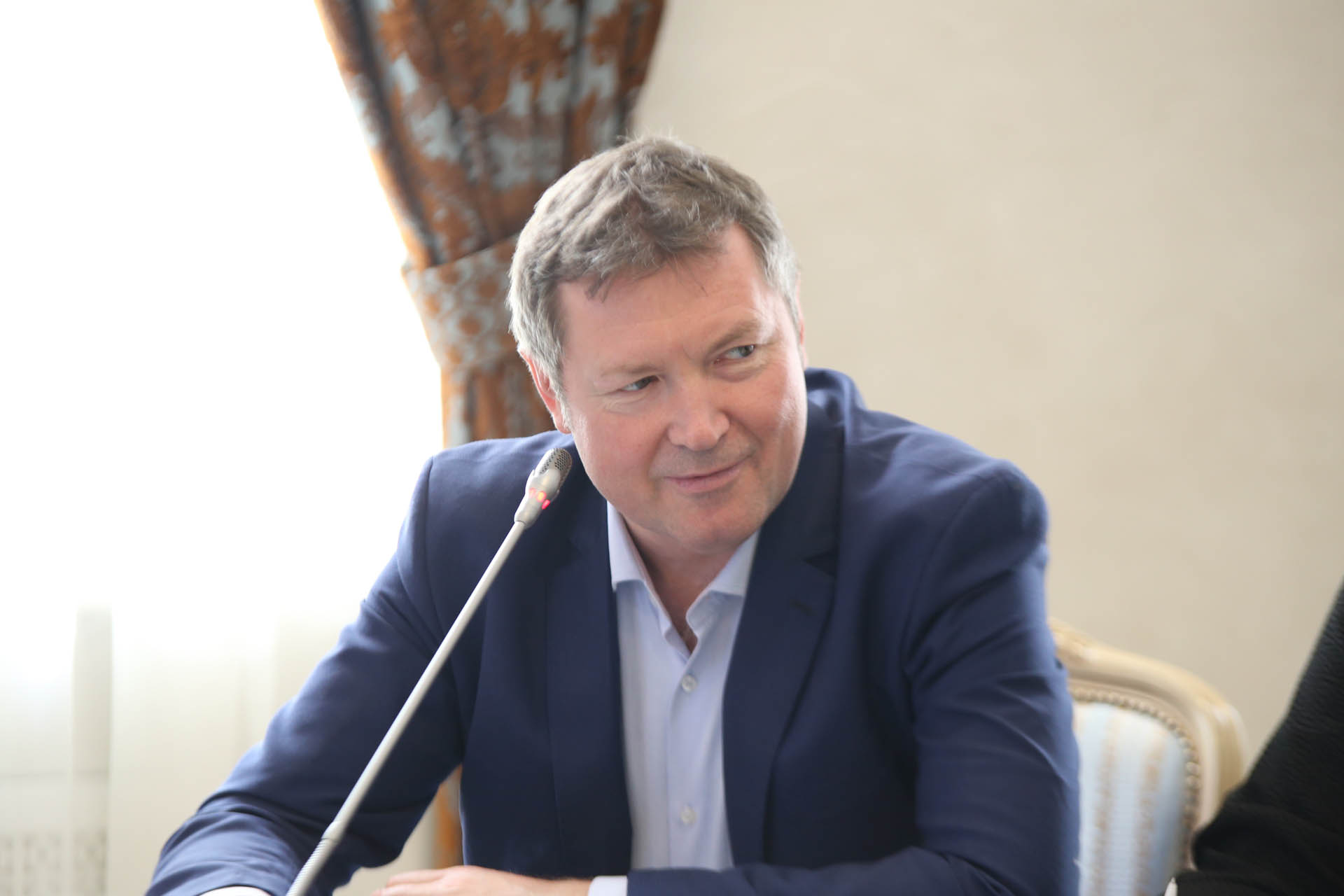
The Government of the Russian Federation had developed a national project “Demography”, aimed at promoting sustainable natural population growth in the country. During the discussion of the project at the final “Community” Forum in Moscow, it was noted that to achieve the natural growth rate, it is necessary to focus on higher fertility rates and introduce additional measures to support multi-child families, development of variant forms of preschool education and care services and care for children under three years old. The implementation of a new set of birth support measures can be started from the regions of the Far East, relying on the positive experience of the Sakhalin Region.
In this regard, the Civic Chamber of the Russian Federation noted the particular relevance of collaboration with regional civic chambers244 As part of the monitoring, joint activities of the Commission for the Support of the Family, Motherhood and Childhood were held with relevant commissions of public chambers in the Ulyanovsk and Chelyabinsk regions, the Republic of Bashkortostan. of public monitoring of demographic and family policy245 “Balanced and timely”: members of the Civic Chamber of the Russian Federation on the national project “Demography” // Website of the Civic Chamber of the Russian Federation, 24.07.18: https://www.oprf.ru/press/news/2018/newsitem/46090.. On June 8, 2018, an extended joint meeting of the Civic Chamber of the Russian Federation and the Civic Chamber of Nizhny Novgorod Region was held on the theme “Development of health care in the Russian Federation in the light of Presidential Decree No. 204 of May 7, 2018” On the national goals and strategic objectives of the Russian Federation for the period until 2024”246 Solving the problems of the health care system – determining the path of the country’s development // Website of the Civic Chamber of the Russian Federation, 08.06.2018: https://www.oprf.ru/press/news/2018/newsitem/45619..
On November 16, 2018, President Vladimir Putin held a visiting conference at St. Petersburg Geropharm plant on measures to improve the efficiency of the Russian drug supply system247 Reference telephone numbers of the Presidential Administration // Russian President Website: http://kremlin.ru/contacts.. Much has been done to establish control over the quality of drugs sold, the delivery of these drugs to medical institutions and the public. However, there remains a shortage of medicines for those diagnosed with rare diseases, drugs and supplies for diabetics, also an acute shortage of medicines for HIV-infected persons is recorded. In Bashkiria, Nizhny Novgorod, Tambov and Kaliningrad regions, as well as Altai and Krasnodar Territories, there is an acute shortage of medicines that are vital for these patients.
The Civic Chamber of the Russian Federation proposed to solve the problem of interruptions of vital medicines, transferring the authority to allocate them to the federal level, since regional budgets do not cope with the workload, sometimes 70% of the budget for drug provision goes for the procurement of medicines for patients with rare diseases.
On August 3, 2018, the President of the Russian Federation signed Federal Law No. 299-FZ “On Amendments to the Federal Law” On the Basics of Citizens’ Health Protection in the Russian Federation” on expanding the list of rare (orphan) diseases. The law is aimed at transferring authority for organizing the provision of drugs to individuals with hemolytic-uremic syndrome, juvenile arthritis with systemic onset, mucopolysaccharidosis (types I, II, VI) to the authority of the federal executive body that performs the functions of developing and implementing public policy and regulatory legal regulation in the field of health. Federal law comes into force from January 1, 2019 year. This will remove a significant burden on regional budgets and provide medicines to patients with the above-mentioned diagnosis.
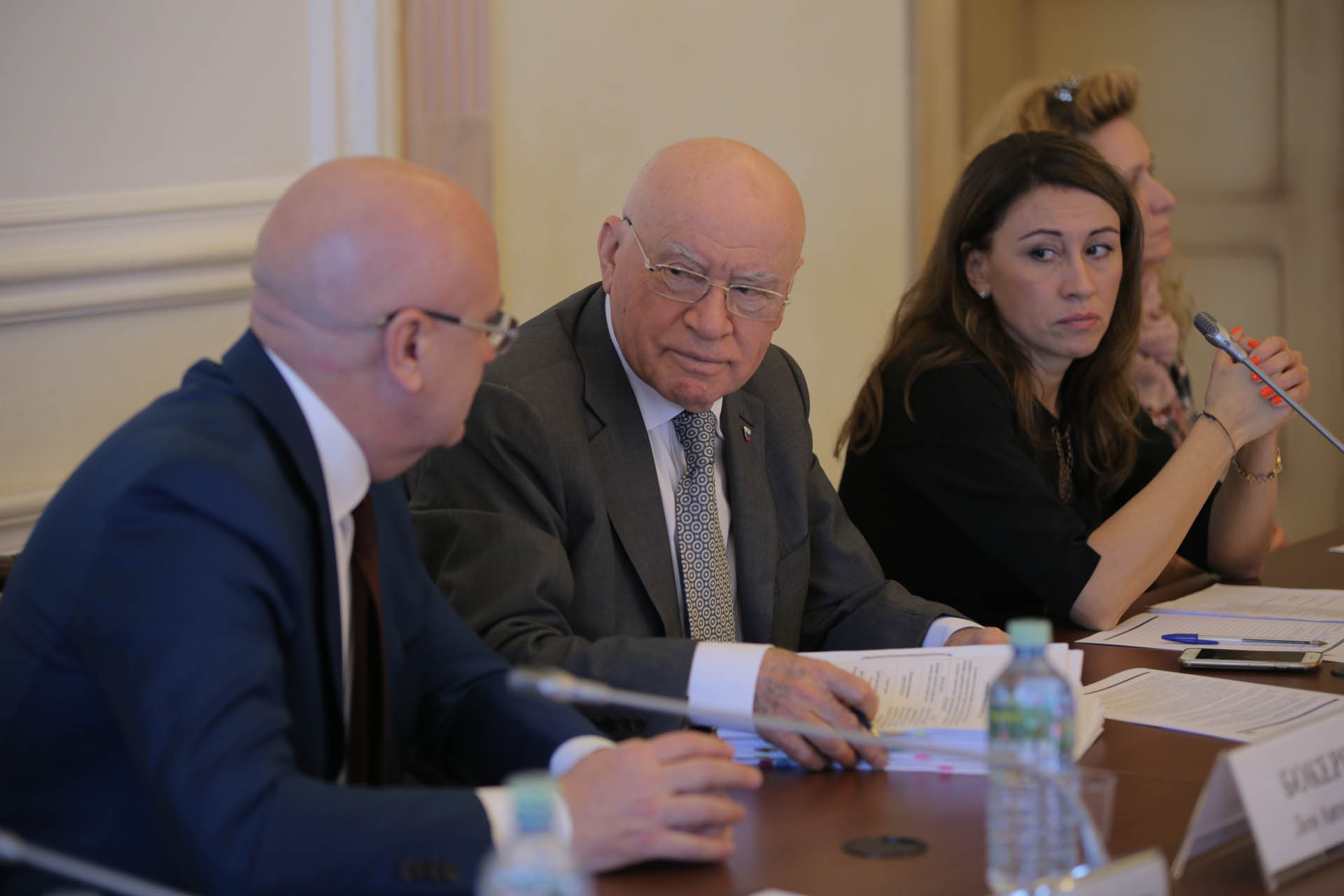
Over the past five years, the donor movement has grown significantly. The total number of donors in Russia for the first half of 2017 amounted to 866,637 people. The number of honorary donors in Russia is increasing every year from 577,672 in 2015 to 589,572 people in 2017. Any Russian who donated blood 40 or more times can be an honorary donor. Most honorable donors live in Ivanovo Region, Karelia, Kurgan and Nizhny Novgorod Region. As of January 1, 2017, Ivanovo Region became the leader in the number of honorary donors – 11 donors per 1 thousand people, Karelia ranks second (10 per 1 thousand). The third place is shared by Kurgan and Nizhny Novgorod regions (9 per 1 thousand). These data were provided by the Federal Medical Biological Agency248 One blood: leading regions in number of honorary donors announced // RT, 08.09.2017: https://russian.rt.com/russia/article/427603-regiony-lidery-pochyotnyi-donor..
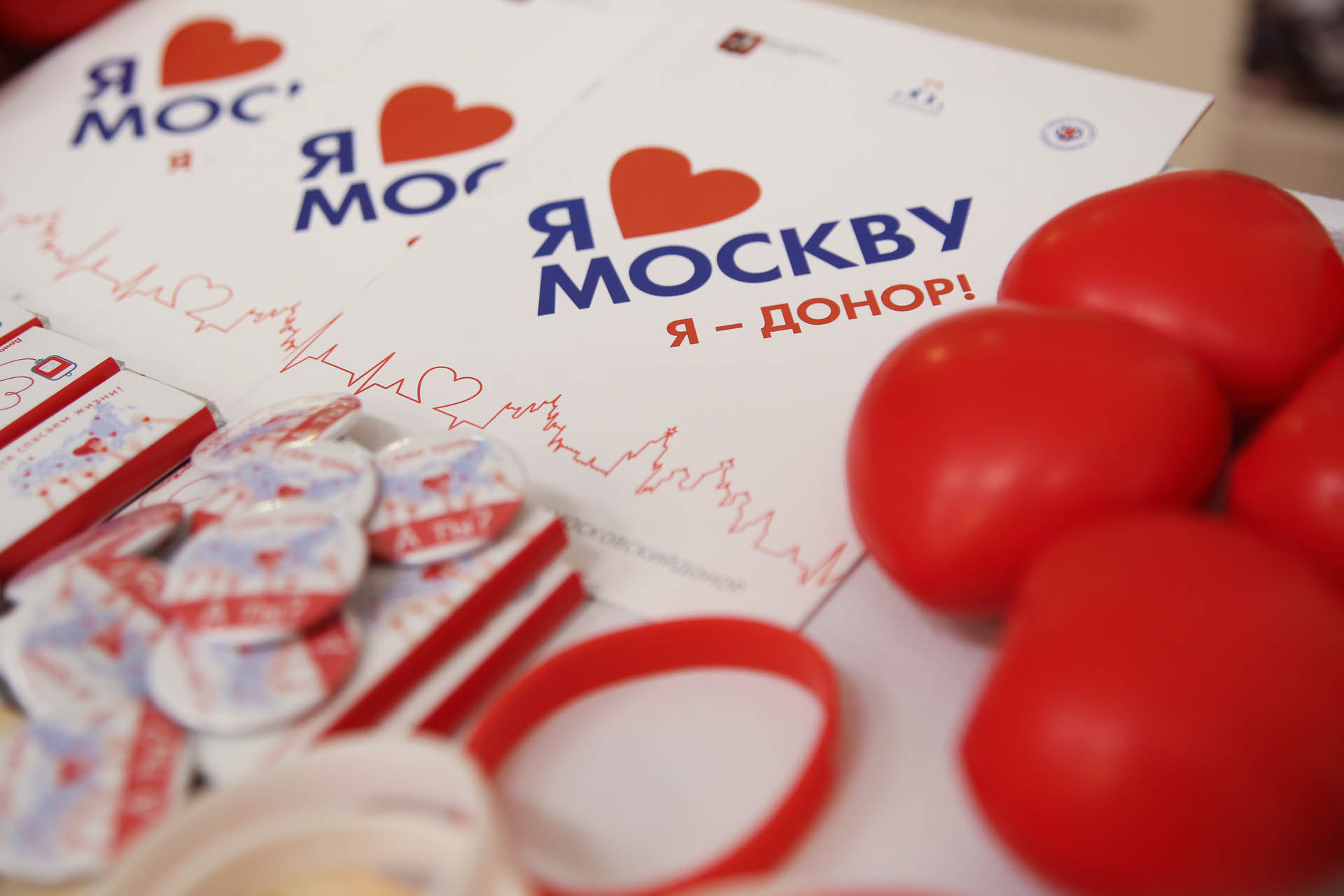
Readiness for engagement in blood donation among the population is high: 77% of irregular and 80% of regular donors like to donate blood249 A portrait of a responsible Russian donor compiled // Komsomolskaya Pravda..
The Civic Chamber of the Russian Federation does not stand aside. On May 14, within the framework of III Moscow Donor Marathon “Knocking Out of Hearts”, an action on voluntary blood donation was held within its walls250 “I want to help children!” Dozens of volunteers took part in the blood donation campaign by the Civic Chamber of the Russian Federation // Website of the Civic Chamber of the Russian Federation, 14.05.18: https://www.oprf.ru/press/news/2018/newsitem/45222..
There are other important donation. On October 3, representatives of NPOs and hematologists discussed problems of bone marrow transplantation and the development of donor registers at the Civic Chamber of the Russian Federation. Many participants argued that any register of bone marrow donors must be public.
On September 28, the Civic Chamber of the Russian Federation, for the eighth time, awarded the winners of the VIII All-Russian Prize of the All-Russian Award “Engagement” for their contribution to the development of donation. 350 applications have been received from 52 regions of Russia. The shortlist of the award includes initiative groups and non-profit organizations, blood service institutions, the media, Russian business and ordinary citizens251 “The development of blood donation is a task of national importance” – Nikolay Daikhes // Website of the Civic Chamber of the Russian Federation, 01.10.2018: http://www.oprf.ru/press/news/2018/newsitem/46750..
The Civic Chamber of the Russian Federation criticized the draft Healthy Lifestyle Strategy until 2025 proposed by the Ministry of Health and, after sending recommendations for adjustments, proposed to finalize the document. It also recommended the Government of the Russian Federation to create an interdepartmental working group involving representatives of interested business associations, the scientific and expert community to discuss the issue252 Civic Chamber asked the Ministry of Health not to discriminate against sausage // РБК, 21.02.2018: https://www.rbc.ru/society/21/02/2018/5a8c13f59a7947654bf23ed1..
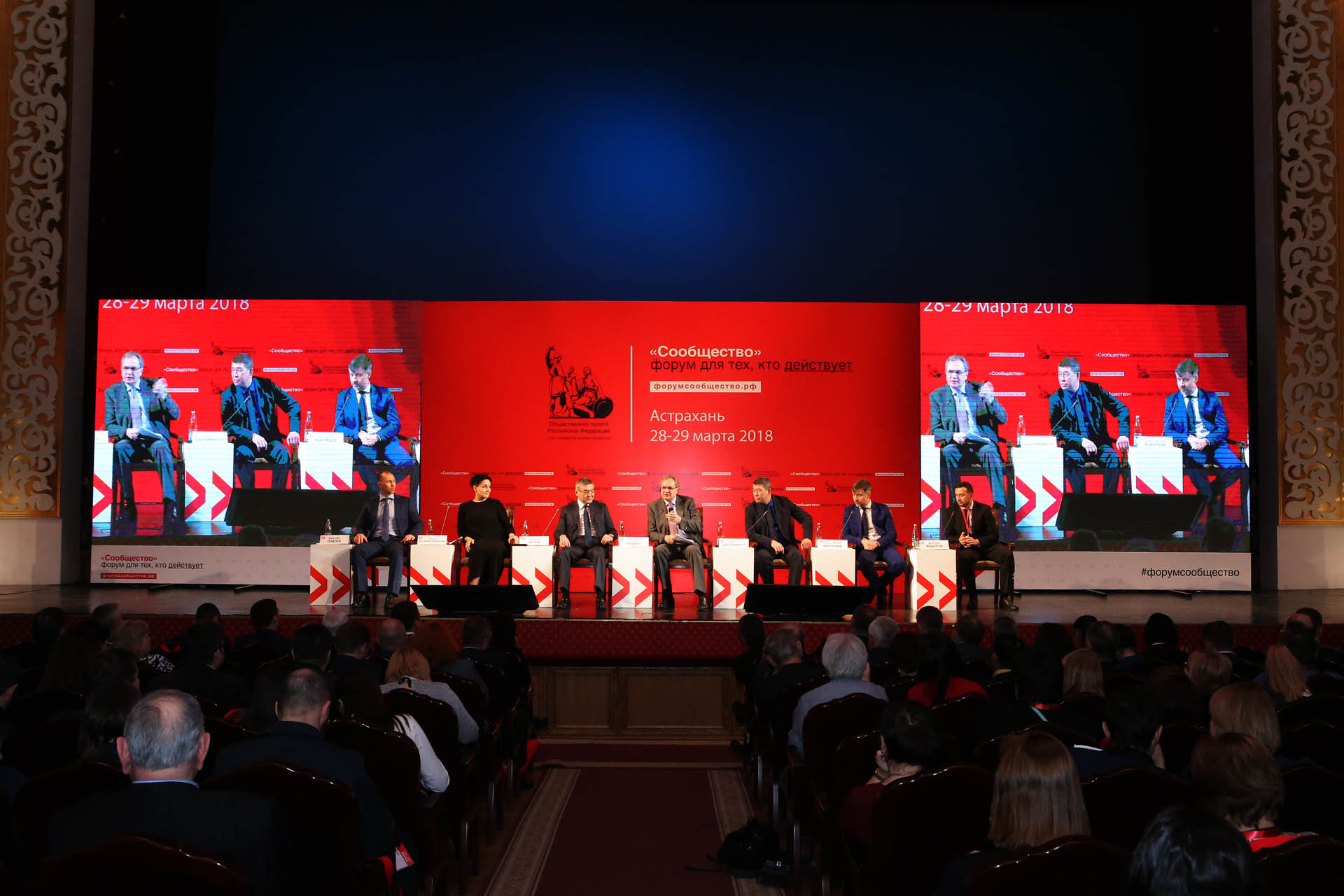
Civic Chamber of the Russian Federation, together with a network of regional civic chambers is also involved in systematic work to promote effective strategies of improvement of the working population in Russia in introducing production gymnastics for all categories of the population. The development of the system of health services in organizations throughout Russia was discussed on July 13 in Kazan at public hearings “Strategy 2030 – health protection of citizens in terms of developing the system of health services in organizations following the example of the Republic of Tatarstan”253 Strategy-2030: return production gymnastics to Russian enterprises // Site of the Civic Chamber of the Russian Federation, 13.06.2018: https://www.oprf.ru/press/news/2018/newsitem/45634.. Within the framework of public hearings, issues of promoting a healthy lifestyle, physical training and sports, increasing the share of persons doing physical exercises and sports on their own, the spread of corporate socially oriented practices to support healthy lifestyles, as well as ways to improve the health of workers during the working day (physical training at the exercise).
Physical training and sports are one of the most important areas of social development. Healthy lifestyle as value ranked third after family and financial well-being. Among young people, physical training and sports are popular not only as a means of personal development, but also as a promising area of career growth254 Professional career of modern youth: situation assessments // The All-Russian Public Opinion Research Center , 04.09.2018: https://wciom.ru/index.php?id=236&uid=9289.. And the creation of new exercise sites, as a powerful means of building and maintaining health, in the open air – those requests that most citizens today place on public spaces255 Vechernyaya Moskva: Vacation close to home. What public spaces do citizens need? // The All-Russian Public Opinion Research Center, 19.05.2018: https://wciom.ru/index.php?id=238&uid=9119.. The contest “Best Practices for Promoting a Healthy Lifestyle in the Territory of the Russian Federation”, held by the Civic Chamber of the Russian Federation, once again demonstrates a great interest in physical training and sports among Russian people256 Oh sport, you are life! Civic Chamber of the Russian Federation launches a contest for the best practices for promoting healthy lifestyles // Website of the Civic Chamber of the Russian Federation,01.06.18: https://www.oprf.ru/press/news/2018/newsitem/45506..
The Civic Chamber of the Russian Federation considers another government initiative – the federal project “Sport is a norm of life” (for 2019 – 2024). While stressing the urgency of the problem, civil society activists nevertheless noted that in fact, all the measures proposed in the project are limited to engaging the population in preparation to hitting the All-Russian physical and sports qualifying standard “Ready for Labor and Defense” (RLD).
PHYSICAL TRAINING AND SPORTS ARE ONE OF THE MOST IMPORTANT AREAS OF SOCIAL DEVELOPMENT FOR RUSSIANS.
The Civic Chamber of the Russian Federation proposed to allocate a separate national project “Physical Training and Sport for Russian Citizens” as more appropriate for the tasks set by the President to preserve the health and working capacity of the population.
The national project “Physical Training and Sport for Citizens of Russia” should include measures aimed at improving personal physical culture as an integral part of the general culture of man and society, measures to improve the system of general and supplementary education in the field of physical training and sports and create an efficient mechanism of interactions between further education and the training system of the sports reserve; measures to formulate a state task to provide advanced training for teachers of preschool education, physical education teachers, trainers and teachers implementing educational programs for physical education of children of preschool and primary school age, recommended by the Ministry of Education of the Russian Federation; measures to modernize statistical research in the field of physical training and sports and related to sport services in order to formalize and create conditions for the development of the “sports industry” economy; competitive selection and state support of digital technologies and platform solutions for the development of physical training and sports.
At the events of the Civic Chamber of the Russian Federation it was repeatedly stressed that the opening of new branches of sports organizations, the construction of sports facilities is often carried out without taking into account the views of residents of the region. The population has no opportunity to express wishes and will for the development of sports life. For example, while preparing for the Community Forum in Kaliningrad Region, it turned out that in the town of Mamonovo, the only one sports school opened powerlifting, weightlifting and football sections, which resulted in only one girl attending it. Parents simply feared to give daughters to such “male” sports.
It is obvious that, first of all, a statistical study is needed on the technical condition of the infrastructure, as well as public and expert support of regional industry initiatives, programs and actions.
There are no sports sections in the village of Kostenki. In October 2017, Kostenki Sports and Cultural Center, a non-profit organization, was established, which concluded a gratuitous agreement with the local high school on cooperation and joint use of the gym. As a result, everyone from different age groups, free of charge, under the guidance of volunteer coaches, had an opportunity to play football, volleyball, table tennis, chess and work out on weight-lifting machine in a school gym and on the sports ground.
The project was presented at the final “Community” Forum in Moscow.
Communication support of sports public organizations is important, which will provide feedback with residents of the regions and their engagement in the practical implementation of federal and regional projects.
It is necessary to hold an expertise and harmonize the regulatory framework of sports, education, health care, regulating the conceptual apparatus and relationship in the field of physical training and sports.
According to the Russian Health Ministry, the number of alcohol consumption per capita since 2006 year has decreased by almost 40%. The Concept for the implementation of the state policy on the reduction of alcohol abuse and prevention of alcoholism among the population of the Russian Federation for the period up to 2020 has been developed, there is a ban on the sale of alcohol, including beer, in children’s, educational, medical and cultural organizations, as well as in sports facilities, on adjacent areas, limited retail sales of alcohol products by time, campaigns are conducted to stimulate a healthy lifestyle257 Russians consume 40% less alcohol than 12 years ago//RIA Novosti, 27.04.18: https://ria.ru/society/20180427/1519510415.html.. While announcing a reduction in alcohol consumption, the Ministry of Health relies on official statistics, data from the legal alcohol market, excluding counterfeit goods and surrogates. However, today, according to experts, the share of counterfeit is 70%, and the problem of alcohol involvement of the population is relevant258 The share of counterfeit alcohol in Russia is 70%, the expert believes // RIA Novosti, 27.04.18: https://ria.ru/society/20180427/1519537434.html.. On June 25, the Civic Chamber of the Russian Federation at the round table “Sobriety Territory: How to Expand the Area of Public Health and Family Well-Being” presented the results of a study conducted in localities where residents voluntarily introduced prohibition and banned the sale of alcohol. As a result, it was decided to prepare recommendations for the authorities to disseminate the practices of sobriety territories both in rural settlements and in urban areas259 Sobriety territories: how are the villages changing, where the residents voluntarily introduced prohibition law? //// Website of the Civic Chamber of the Russian Federation, 06/25/18: https://www.oprf.ru/press/news/2018/newsitem/45789..
In 2012, the share of disabled individuals engaged in sport was 3% of the number of such citizens, in 2017 it was 14.1%260 Disabled Individuals Barrier-free environment: some important decisions and indicators for 6 years // Russian Government website, 11.04.2018: http://government.ru/info/32132/.. According to the subprogram “Development of physical training and mass sports” of the state program of the Russian Federation “Development of physical training and sports”, the proportion of persons with disabilities and disabled individuals regularly engaged in physical training and sports should increase to 20% by 2020261 Accessible sport: how the development of a barrier-free environment makes life for people with disabilities more diverse // TASS, 17.07.2017: https://tass.ru/sport/4408140..
69% of children with disabilities are not engaged in sports, 74% of parents of such children do not have information about the sport facilities for their children. Among the reasons why their children do not play sports, 85% of parents note the absence of sections. On June 28, the Civic Chamber of the Russian Federation discussed the problems faced by people with disabilities at the round table262 “Our task is to involve as many people with disabilities as possible in sports” – Elena Istyagina-Yeliseyeva // Site of the Civic Chamber of the Russian Federation, 28.06.18: https://www.oprf.ru/press/news/2018/newsitem/45834.. It is proposed to monitor the accessibility of sites for adaptive sports263 Sport for all: how to motivate people with disabilities//RIA Novosti, 02.07.18: https://ria.ru/sn_disabled/20180702/1523800717.html..
In January 2018, the President of the Russian Federation set a mission of increasing the share of educational organizations with conditions for obtaining secondary vocational and higher education by the disabled individuals and persons with disabilities, including using distance learning technologies, to strengthen interaction with organizations of the public sector and companies engagement in the employment of people with disabilities264 Putin demanded to determine the cases of indefinite determination of disability // ТАSS, 15.01.2018: https://tass.ru/obschestvo/4873814..
Every year, about 5 thousand people with disabilities enroll in state universities under a quota that makes up 10% of budget vacancies. In total, approximately 20 thousand people with disabilities receive higher education – this is every thirty-third disabled person aged 18-30 (data for 2016). The Civic Chamber of the Russian Federation launched an initiative to lift the basic restrictions, for example, proposed to cancel the restriction “one university – one specialty” supported by the Commission under the President of the Russian Federation for the disabled, and then by the relevant ministries. As a result, the Federal Law No. 162-FZ of June 27, 2018 “On Amending Article 71 of the Federal Law” On Education in the Russian Federation” was signed, granting applicants with disabilities the right to apply for admission under their 10% quota not in one, but in five universities for three specialties in each, as well as an ordinary entrant.
On March 29, 2018, the Government Decree No. 339 “On Amending the Rules for the Recognition of Persons with Disabilities” was issued, according to which the approaches to the determination of disability and the revision of the individual program of rehabilitation and habilitation were greatly simplified. This decision concerns tens of thousands of people. Now, people with disabilities, if they have certain diagnoses, do not have to undergo an examination every year and prove what has already been proven, they should be assigned a disability for up to 14-18 years. However, in reality, the situation has not changed everywhere: primary medical and social appraisal in a number of regions is still governed by old laws.
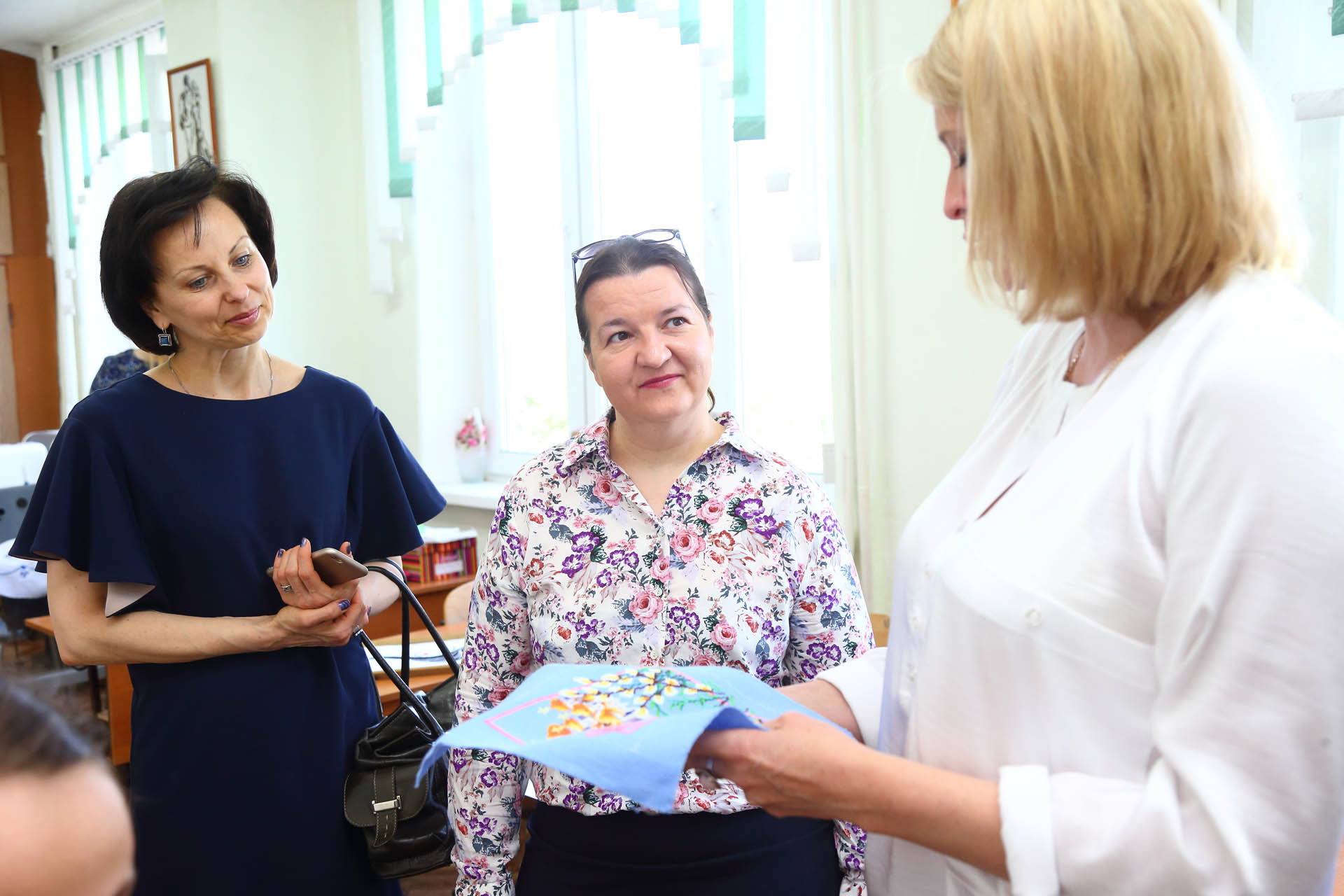
On October 1, 2018, the Civic Chamber of the Russian Federation reopened a hotline on the availability and quality of work of the institutions of the MSA system aimed at monitoring the implementation of the new rules for examining disability, introduced by Government Decree No. 339. During the first weeks of work it received hundreds of hits. Most complaints at MSA in Moscow, Moscow region, Tatarstan. Despite the inclusion of these diseases in Resolution No. 339, people having such incurable diseases as hemophilia, cystic fibrosis, osteogenesis imperfecta, etc., are assigned a disability status only for a year or two. The Civic Chamber of the Russian Federation will continue to work assiduously towards the execution of the decisions of the Government.
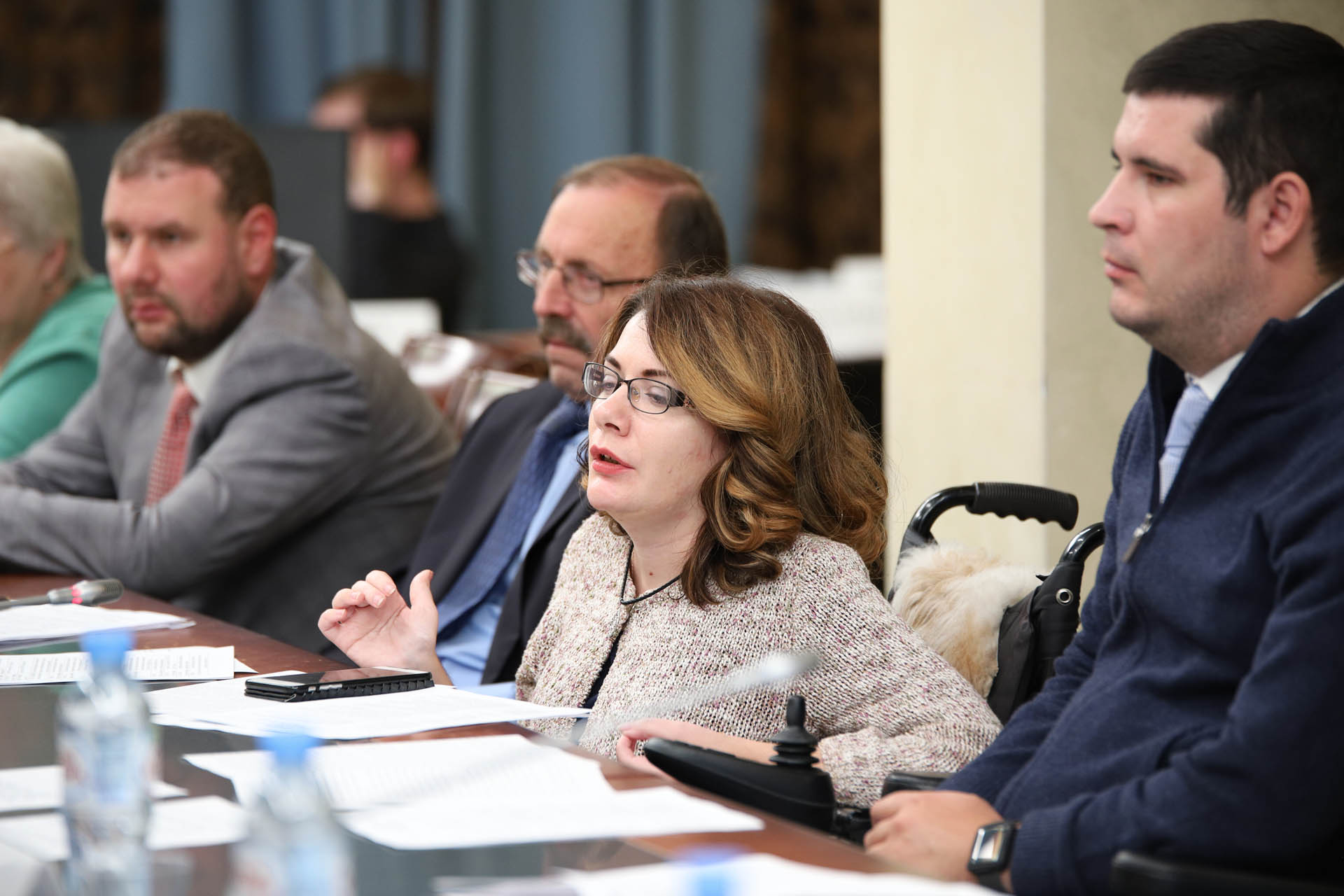
Research Center “Minority Opinion” together with the Civic Chamber of the Russian Federation with the assistance of the Commission under the President for the Disabled and the Ministry of Labor of Russia, held an all-Russian comprehensive monitoring of the quality of MSA institutions work using the funds of the presidential grant264 Putin demanded to determine the cases of indefinite determination of disability // ТАSS, 15.01.2018: https://tass.ru/obschestvo/4873814.. The study showed that 25-30% of respondents spent more than one month to get an appointment to MSA, and for half of them it will take more than two months. Almost every third of them had apply for paid medical services, and every second In Nizhny Novgorod and Komsomolsk-on-Amur.
Telephone recording is absent in many regions, and where it exists, for example, in Moscow, it is impossible to reach the line in weeks. Moreover, in many regions, patients spend from one to three hours on the road to the MSA.
To ensure openness and improve the quality of MSA, the President of the Russian Federation instructed the Government of the Russian Federation and the Civic Chamber of the Russian Federation to consider improvements to the system of public control in the field of medical and social appraisal. At the moment, public councils under the MSA bureaus are being created, the system of cooperation with relevant public organizations has started developing. The Civic Chamber of the Russian Federation, together with patient and disabled organizations, has begun to develop regulations for the activities of public councils under the MSA.
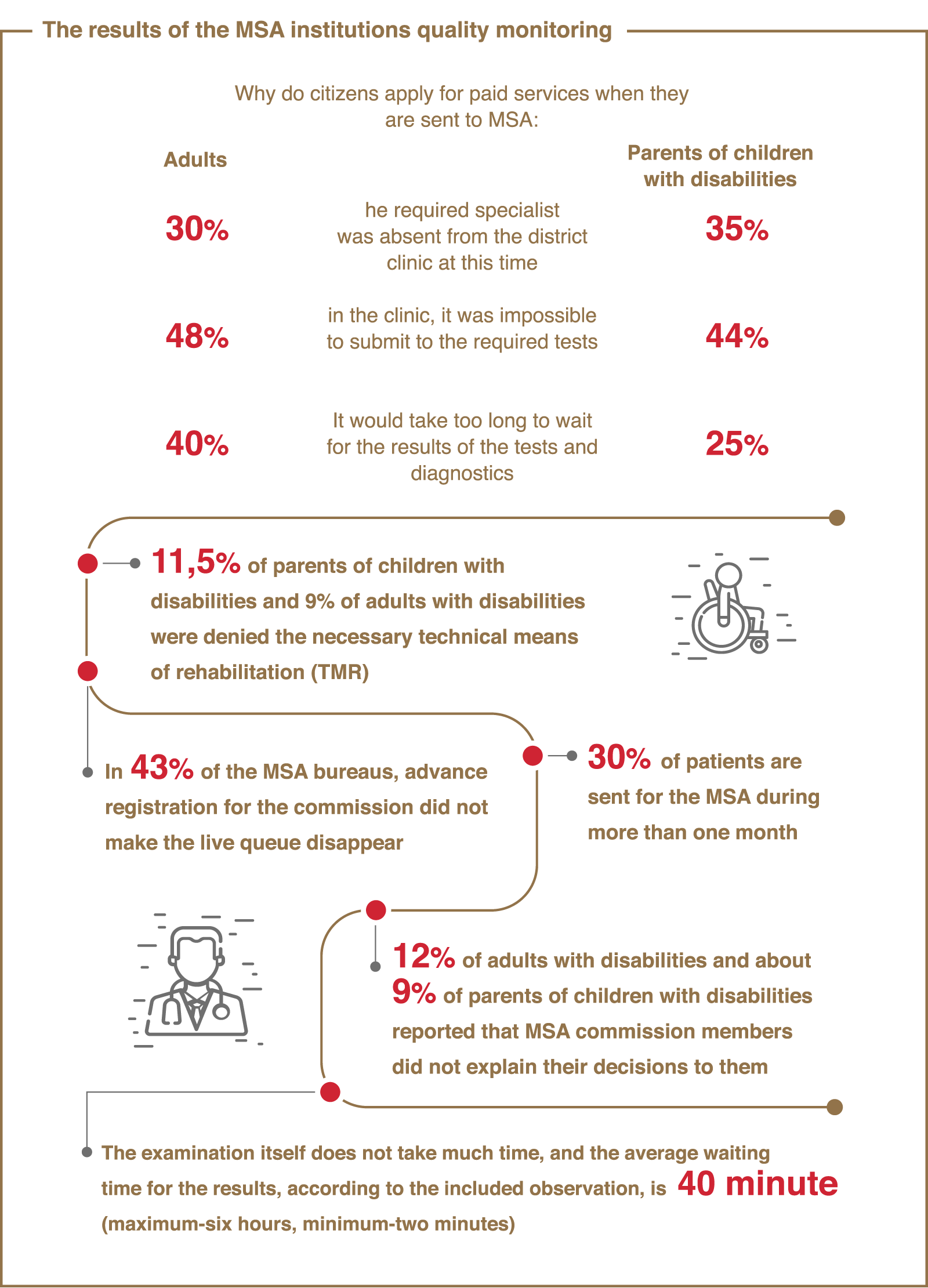
Data source: Civic Chamber of the Russian Federation266 Disability test: insurmountable barriers or new opportunities? // Website of the Civic Chamber of the Russian Federation, 18.10.2018: https://www.oprf.ru/press/news/2018/newsitem/46961; Barrier deadlock // “Kommersant” № 190, dated 10.17.2018, p. 5 (https://www.kommersant.ru/doc/377224).
Last December, the President of the Russian Federation Vladimir Putin received a proposal from the Civic Chamber of the Russian Federation to extend the state program “Accessible environment” until 2025. This proposal was made during the round table on accessible transport, which took place in the Civic Chamber of the Russian Federation.
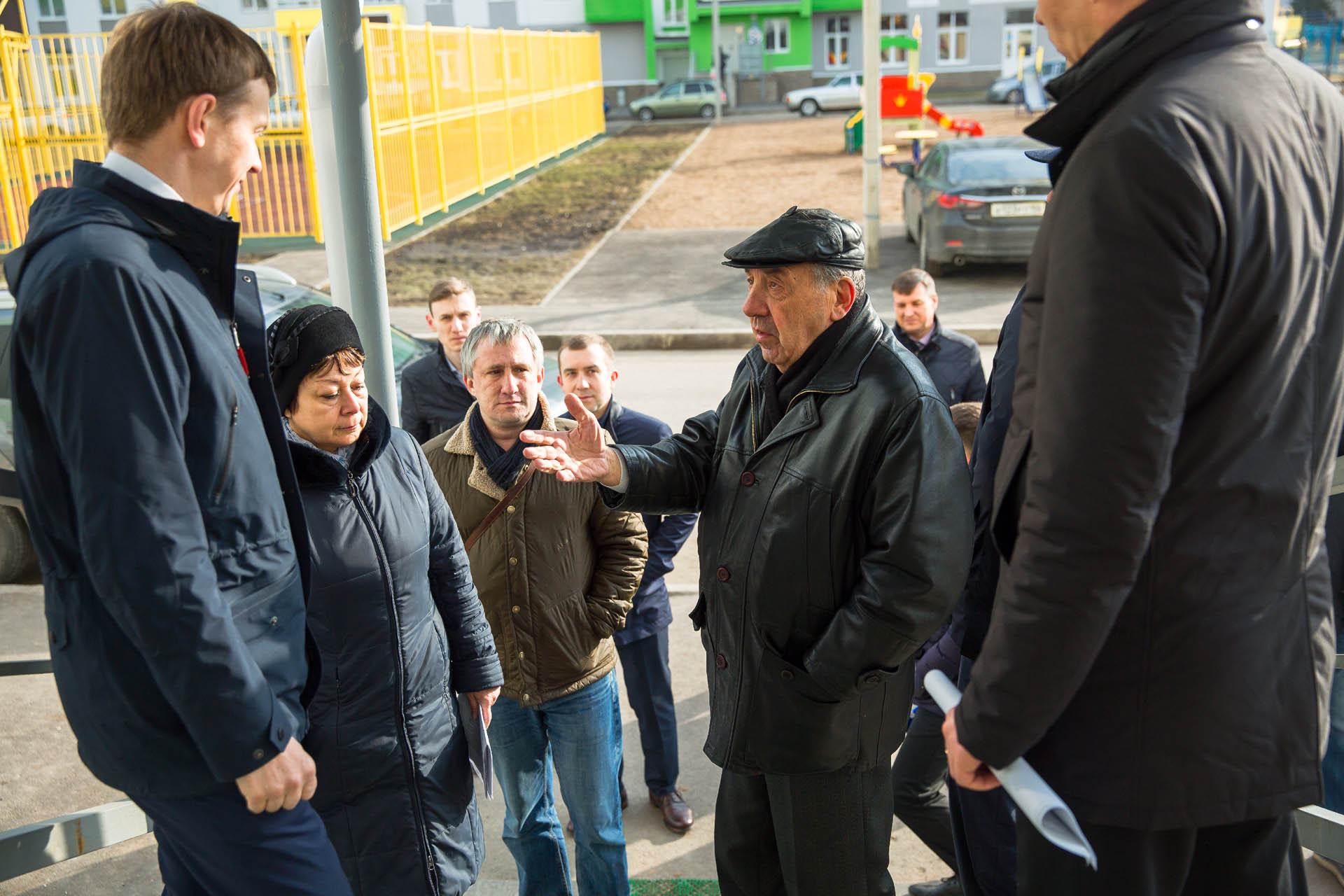
In 2018 the Civic Chamber of the Russian Federation has conducted a series of activities in the regions. According to their results, it was noted that there is no general concept on the rules of transportation of citizens in the Russian Federation, different regulations literally confuse representatives of air transportation, how to provide people with disabilities with various services. The major problem is the human factor and interagency cooperation between the airport services and other structures.
On August 15, the Civic Chamber of the Russian Federation held a round table “Accessibility of air and rail transport for people with disabilities”. The problems that were discussed there were also raised during the final “Community” Forum on November 2, 2018 in the presence of the Chairman of the Commission under the President of the Russian Federation for the disabled Alexandra Levitskaya. It was about the transition to online registration of railway tickets for this category. PJSC “Russian Railways” is ready to join the solution of this issue.
Representatives of the Civic Chamber of the Russian Federation within the framework of the forum Community visited neuropsychiatric asylums. During these raids they could make sure that the problems of such boarding schools in different regions are very similar: long distance from large settlements, lack of qualified personnel, lack of personal space, which is necessary for the patient of the asylums. There are also difficulties associated with the organization of adult patients occupancy.
As a solution to the identified problems, it was proposed to consider them as a whole and develop a program for arranging the life of people with mental disorders in society on the principles of social integration. It is also proposed to develop alternative forms of asylum-replacing placement and social services267 “It is important to develop the concept of arranging the life of people with disabilities on the principles of social integration” – Andrey Tsarev // Website of the Civic Chamber of the Russian Federation, 20.06.2018: https://www.oprf.ru/press/news/2018/newsitem/45720..

Environmental problems are now acquiring a major strategic importance, as they relate to the main thing – the future existence of human civilization on the Earth. Environmental issues have a permanent noticeable impact on the development of civic activity: stimulate grassroots social activity, the creation of all kinds of initiative groups, movements and associations, aimed both at solving their local issues and at developing global eco-initiatives.
Increasingly, social and environmental conflicts arise in the regions of Russia, in which members and experts of the Civic Chamber of the Russian Federation act as mediators (Stop the Ore-Dressing and Processing Enterprise268 Passions around Tominsky Mining and Processing Plant of Chelyabinsk Region are declining due to the intervention of the Civic Chamber of the Russian Federation, says Felix Panov, member of the PC RF, head of the public organization Vremya Che// Ecological Press Center: http://ecopress.center/page3336542.html. movement in Chelyabinsk, “No coal dust”269 The Civic Chamber of the Russian Federation did not hear the residents of Nakhodka choking with coal dust // Vostok Media, 13.02.2017: https://vostokmedia.com/news/society/13-02-2017/op-rf-ne-uslyshala-zadyhayuschihsya-ot-ugolnoy-pyli-zhiteley-nahodki. in Nakhodka, “No construction of waste incineration plants” in Moscow Region and Tatarstan, a protest against the construction of the SMW landfill “Malinki” in New Moscow, a protest against SMW burial, disposal, and recycling facility “Ecotechnopark Shies” in Arkhangelsk Region in the rural settlement of Filippovskoye, Kirzhach District, Vladimir Region, a protest against the construction of Bagayevsky Hydroelectric Complex in Rostov Region, a protest against the development of monadnocks in Bashkiria “Do not touch the Monadnocks”270 “The transfer of the monadnocks to the development in Bashkiria is unacceptable!” – Valery Fadeev // Website of the Civic Chamber of the Russian Federation, 25.05.2018: https://www.oprf.ru/press/news/2018/newsitem/45411., protest actions in Vladikavkaz demanding the closure of the Ural Mining and Metallurgical Company, a social and environmental conflict caused by the start of a project to mine uranium in Zverinogolovsky District of Kurgan Region.
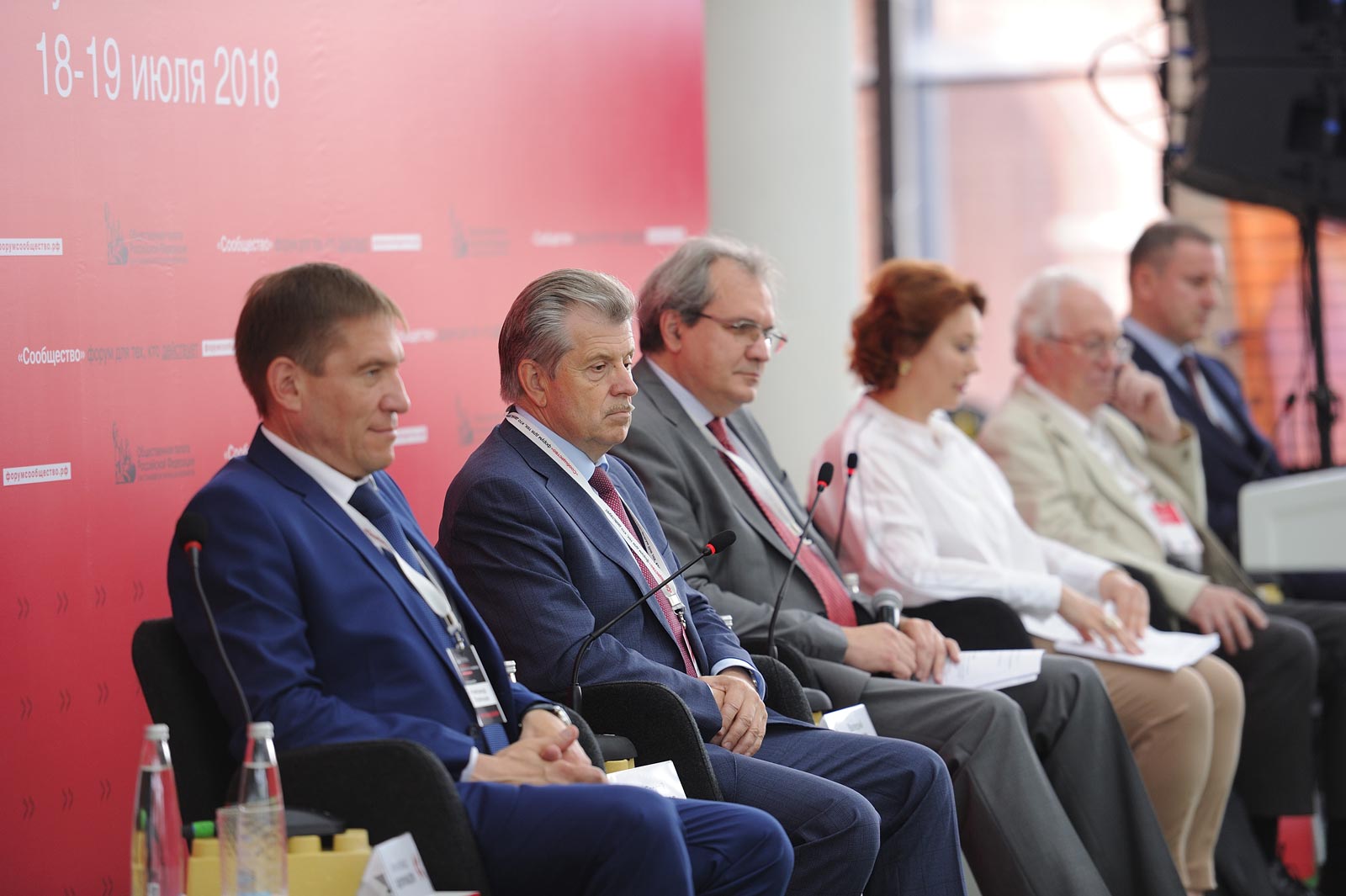
In 2018, the issue of solid municipal waste management became extremely relevant. According to 90.7% of the respondents among the participants of the public events of the Civic Chamber of the Russian Federation, the problem of waste management is the most conflict-generating environmental issue.
As it was already noted in the first chapter of this report, the Civic Chamber of the Russian Federation, jointly with the All-Russia People’s Front and Human Rights Council analyzed the efficiency of measures to ensure the processing of municipal solid waste, and also provided suggestions for ensuring that the citizens’ opinions are taken into account during the construction of facilities used for treatment of the said waste271 Report on the efficiency of measures to ensure the processing of municipal solid waste and proposals to ensure that the opinions of citizens of the Russian Federation are taken into account during the construction of facilities used for waste treatment // Website of the Civic Chamber of the Russian Federation,15.10.2018: https://oprf.ru/files/1_2018dok/Doklad_OPRF_othodi15102018.pdf..
As part of this work, the Civic Chamber of the Russian Federation analyzed more than 8,000 petitions from citizens who arrived at a specially launched hotline, held discussions in the framework of the “Community” Forums, round tables, conferences with experts and business representatives. Regional civic chambers worked on the analysis of the situation.
In addition to the proposals of the Сivic Chamber of the Russian Federation on the creation of a public law company and the nationalization of landfills mentioned in the first chapter of the Report, Therefore, in the report, the Сivic Chamber of the Russian Federation proposed, as a matter of priority, to send the resources of the utilization and environmental toll for the creation of infrastructure and the development of technology for the waste treatment, disposal and neutralization272 Report on the efficiency of measures to ensure the processing of municipal solid waste and proposals to ensure that the opinions of citizens of the Russian Federation are taken into account during the construction of facilities used for waste treatment // Website of the Civic Chamber of the Russian Federation,15.10.2018: https://oprf.ru/files/1_2018dok/Doklad_OPRF_othodi15102018.pdf.. In fact, the Сivic Chamber of the Russian Federation took the initiative to substantially reform the waste recycling industry and tabled the national priority project “Resource Saving”273 Waste – resource saving – income: how to attract investors to waste recycling? // Website of the Civic Chamber of the Russian Federation, 07/18/2018: https://www.oprf.ru/press/news/2018/newsitem/46041.. The objectives of the project are the involvement of secondary resources in the economic turnover, water saving, rational use of natural resources. The project is needed in order to preserve the resources of our country as the state priority, and the rational use of natural resources and the development of the market of secondary resources firmly entered our economy. Russia’s wealth should be growing.
The role of public and non-profit organizations in recent years has increased in proportion to the growth of public attention to environmental issues in Russia. Upon the initiative of the Civic Chamber of the Russian Federation in 2017–18, a large-scale inventory of public and non-profit organizations carrying out their statutory activities in the field of ecology is carried out. As of today, the analysis shows that the overwhelming majority of the eco-NPO have been in a “sleeping state” and are active only when receiving an order and financing. There are several categories of eco-NPOs in terms of their activities, including truly environmental, financially oriented to serving the interests of commercial structures, extremist and provocateurs, so-called “black environmentalists”, hiring professionally trained specialists to torpedo and discredit environmental movements, procedural winding and delaying environmental hearings, expertise and lobbying environmentally unsafe projects. Currently, there are about 600 eco-NPOs operating with various activities, this is only a small part of the actually registered ones. The number of organizations actually involved in environmental activities in the field of biodiversity conservation, assessment of negative anthropogenic impact on the environment, environmental enlightenment and education is approximately 30% of the existing ones, and this number includes both constructive and destructive operating eco-NPO. There are several categories of eco NPOs in terms of their activities, including truly environmental, financially oriented to serving the interests of commercial structures, extremist and provocateurs, so-called black environmentalists, hiring professionally trained specialists to torpedo and discredit environmental movements, procedural winding and delaying environmental hearings, expertise and lobbying environmentally unsafe projects.
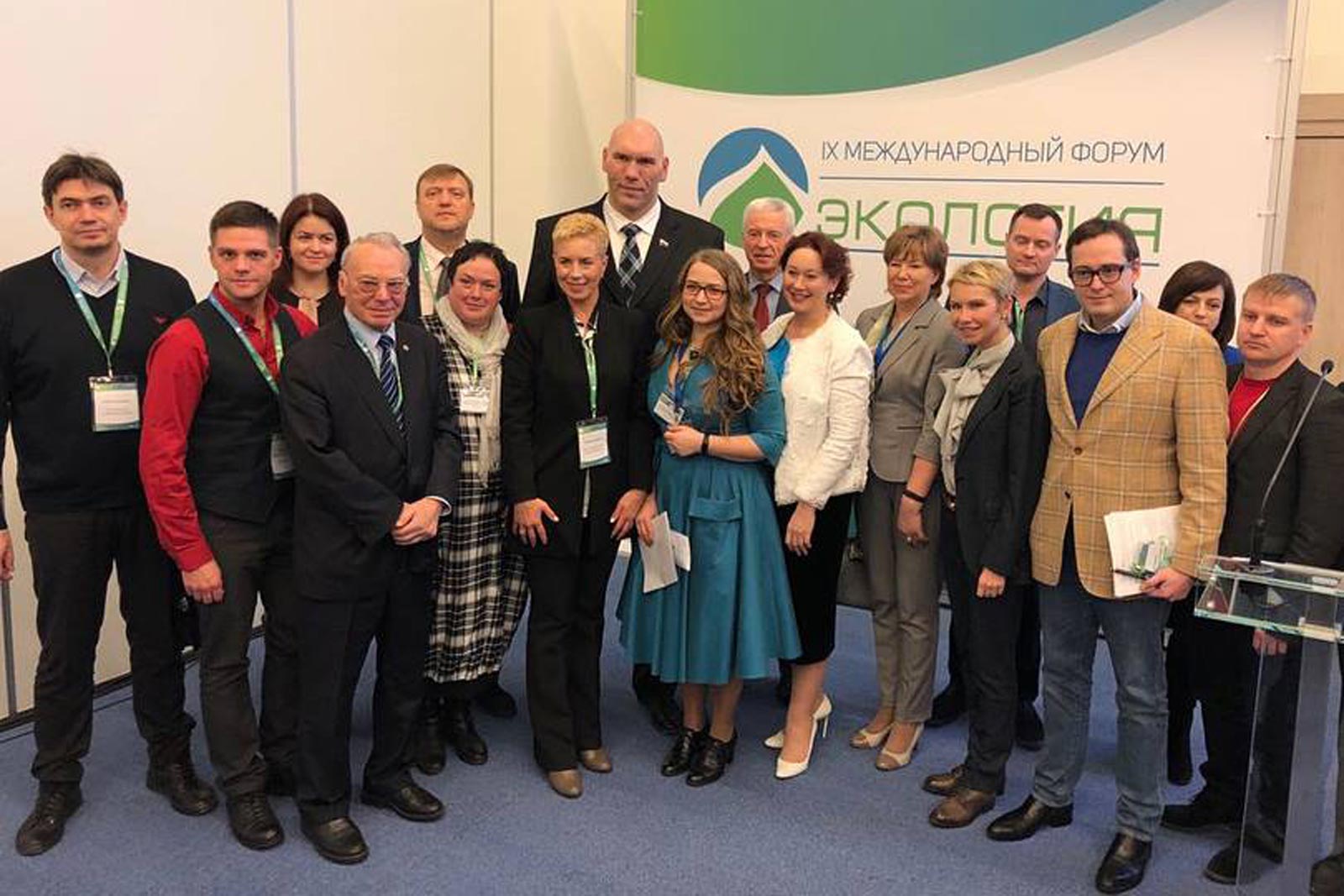
In 2018, the Civic Chamber of the Russian Federation organized an advisory body, the Coordination Council on environmental security of the citizens of the Russian Federation, which brought together the relevant ministries and departments, the Russian Academy of Sciences and the Security Council of the Russian Federation to conduct an in-depth interdisciplinary analysis of the most important and urgent environmental problems and to develop solutions to address them. The Coordination Council decided to take control of the preparation of the plan for the implementation of the environmental security Strategy of the Russian Federation for the period up to 2025, adopted by the Decree of the President of the Russian Federation in 2017.
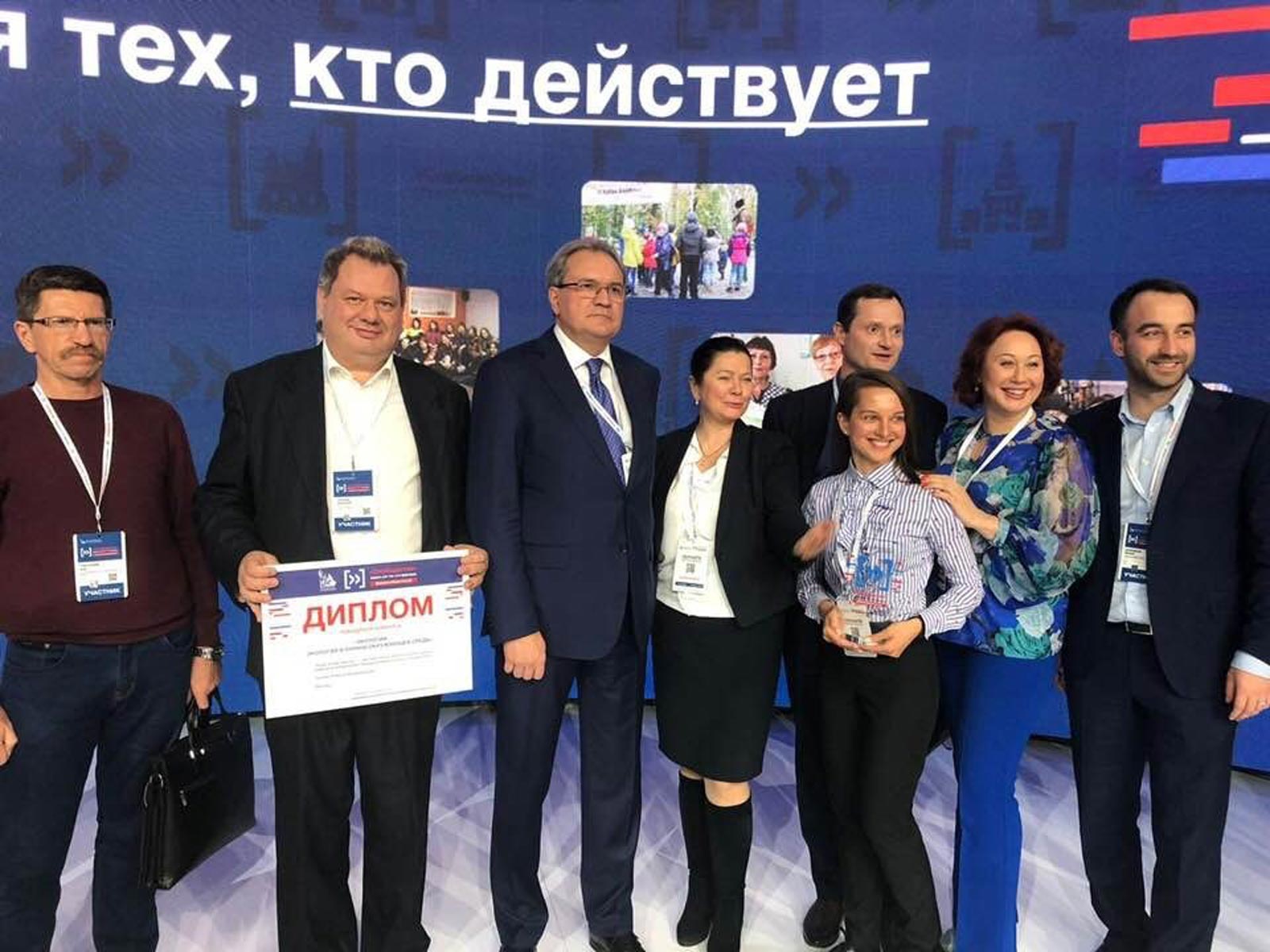
The desire of citizens to participate in solving environmental problems should be promoted by an adequate system of opportunities for this activity. The Institute of Public Environmental Inspectors274 Become a public inspector in the field of environment// Ecological Press Center:http://ecopress.center/page2667908.html., the establishment and development of which is prioritized by the Civic Chamber, has to play a significant role in engaging citizens in public environmental control. The Public control is carried out in order to realize the right of everyone to a favorable environment and prevent violations of environmental laws. The difference between an ordinary activist and a public inspector in the level of knowledge that an activist receives during training and preparation for obtaining the status of a public environmental inspector.
In the process of development of the Institute, several risks were identified, when the relevant ministries intensified their activities in managing this system and several conflicts between eco-activists and business were recorded. It is important to create an independent institution of public inspectors, and not a controlled and obedient tool for manipulating the authorities. And it is even more important to prevent the use of the status of a public inspector for the purpose of individual gain, political and other speculations.
It is necessary to find a balance of interests in which the inspectors, “polite, curious green men” will not show environmental extremism on the one hand, and on the other will be completely independent from the state executive bodies.
There are examples of the competent work of eco-activists who, without being accredited in their activities by any of the departments, in order to be heard during the implementation of their project were forced to use technical means to achieve public resonance. This is a project of a public monitoring system for the removal and burial of municipal solid waste “Where the garbage goes,” which became the winner of the contest of the Civic Chamber of the Russian Federation “My project is for my country!” in the category “Environment”275 The project of public monitoring of the removal and disposal of municipal solid waste “Where the garbage goes” became the winner of the contest “My project is my country!” in the nomination “Environment” // Ecological Press Center: {2>http://ecopress.center/page3974666.htm.. Monitoring is performed using modern tracking technology, the so-called trackers. This methodology allowed the use of the best mechanisms of public control, and even then, the entrance of the experiment revealed facts of illegal waste disposal.
At the events of the Civic Chamber of the Russian Federation, experts repeatedly announced that the population lacked reliable and objective data on environmental issues. For each resonant topic raised by the media, it is necessary to study the issue from different angles together with the relevant experts, and, after analyzing the information gathered, tell the public what is really happening. The key element in educating civil society is quality objective environmental journalism.
Based on these principles, the Civic Chamber of the Russian Federation is developing the “Environmental Press Center” project276 The site of the project is “Environmental Press Center”: http://ecopress.center/., which has become a communication platform for representatives of society, government, business, the expert community and the media. The project is aimed at improving the quality of broadcasting environmental topics in the media, and organizing widespread public access to environmental information. This will serve to increase the literacy and awareness of citizens in the field of environmental protection and to involve the public in solving environmental problems.
It is extremely important to engage young people in this work. For this purpose, the Children’s Environmental Press Center was established277 The Children’s Environmental Press Center, an accelerator for future environmental journalists, was presented on Environmentalist Day at the Civic Chamber of the Russian Federation // Environmental Press Center: http://ecopress.center/page2973418.html.. Its purpose is to cultivate a new generation of professionals in journalism, who will understand the indissoluble link between man and nature, and will be able to intelligently highlight the environmental issues, relying on the opinion of experts in this field and having their own practical knowledge and skills. The project provides training in environmental journalism and regular creative art contests among schoolchildren and students of Russian educational institutions.
The Civic Chamber of the Russian Federation is ready to share expert groundwork, comprehensively assist both the authorities and business. It means to help, not to criticize. It is necessary to develop the concept of interaction between society, business and the government in achieving the environmental well-being.
The Civic Chamber of the Russian Federation considers the issues of the state of municipal and engineering infrastructure as one of the main areas of its activity278 Members of the Civic Chamber of the Russian Federation visit CHP, TPP, hydroelectric power stations, boiler houses, water-supply facilities, sewage and storm water treatment facilities, solid municipal waste processing facilities, landfills, houses, recognized as emergency and due to be demolished, as well as newly erected ones, for resettlement of inhabitants from emergency housing, facilities subject to capital repair, etc..
In many regions, the engineering infrastructure is in poor condition. This leads to a large number of emergency situations.

Source: Civic Chamber of the Russian Federation
There are not enough funds to replace the engineering networks. The normative documents providing for installation of general-consumer metering devices are performed very poorly, only in a few cities this program is executed. Up to now the question on individual devices of accounting is not solved, and this in turn leads to unjustified charges on payment for utility resources, that is payment “and for that guy”. The Civic Chamber of the Russian Federation proposes to strengthen the control over this issue and increase the standard (to introduce the coefficient-10) for the owners, unreasonably evading from the installation of individual utilities metering instruments.
Huge losses of thermal energy occur through the enclosing structures of buildings. Proposals of the Civic Chamber of the Russian Federation on creation of a separate program on energy efficiency were not approved by the legislator. Works on implementation of the façade insulation in the framework of capital repairs lead to high costs and, as a result, disrupt works on capital repair in other houses.
In general, the overhaul has yielded positive results in many subject regions of the Federation. Currently, the collection of funds with the owners exceeded 90%. Special accounts have been earned. However, some regions artificially underestimate the amount of the collection and thus worsen the situation with the overhaul.
The issue of gasification of small settlements (villages and rural areas) remains very relevant. The Civic Chamber of the Russian Federation constantly receives complaints of citizens that they are not able to physically provide themselves with coal and firewood, while gas is sold abroad, and that comfortable living conditions has not been created for the inhabitants of the country.
The Civic Chamber of the Russian Federation believes that it is necessary to make decisions obliging the heads of the Federation subject regions having gas distribution stations to ensure the construction of street gas networks in settlements so that the owners had an opportunity to get technical conditions for joining the gas pipeline located at a distance of up to 200 meters.
The Civic Chamber of the Russian Federation has done considerable work on substantiation of the necessity to preserve the system of financing on demolition of emergency housing through the State Corporation “Fund of assistance to reforming housing and utilities”.
A positive decision by the President of Russia on this issue is very important to all residents living in unsafe houses. The President decided to extend the work of the fund up to 2024 year, inclusively. However, it should be noted that the initial data on the number of emergency housing is 12 million square meters. The Civic Chamber of the Russian Federation informed the President of Russia that this figure should be increased not less than twice, and therefore it is necessary to continue work on increasing the sum of financing in the next 6 years, starting from the 2019, which should be more than the allocated 460 billion rubles.
The Civic Chamber of the Russian Federation notes that many regions artificially underestimated the number of emergency housing that is why the information about 12 million sq. m. is unreliable. The Chamber notes that in recent years the quality of the housing stock built by developers for resettlement of citizens from the emergency and dilapidated housing has improved. Public activists believe that while solving the problem of demolition of emergency housing, it is necessary to use as much secondary housing as possible. In the event of demolishing the emergency housing, the possibility of resettlement of people standing in line for resettlement in central Russia from the Far North regions should also be considered.
The May Decree of the President of Russia provides for the introduction of new housing in the amount of 120 million square meters. The Civic Chamber of the Russian Federation believes that such a program will be possible only under condition of individual housing construction, for which it is necessary to maximize the use of vacant territories at an insignificant distance from urban development. Alongside allocation of land plots, it is necessary to simultaneously develop, at the level of the Federation subject regions, master plans for future settlements, build roads and engineering infrastructure, build social infrastructure jointly with individual housing construction. All this will significantly save public funds and solve the problem for residents who intend to engage in horticulture, gardening, etc.

In recent years, a large amount of road construction has been completed, but this concerns the federal road network, the length of which is 50 thousand sq. km., and for which 500 billion rubles was allocated. Regional and municipal roads account for 1.5 million km in area, and exactly the same amount is allocated for them. The Civic Chamber of the Russian Federation believes that in order to bring the roads up to 50% of the regulatory state, it is necessary to increase the amount of funds allocated for the construction, maintenance and repair of the regional and local road network.
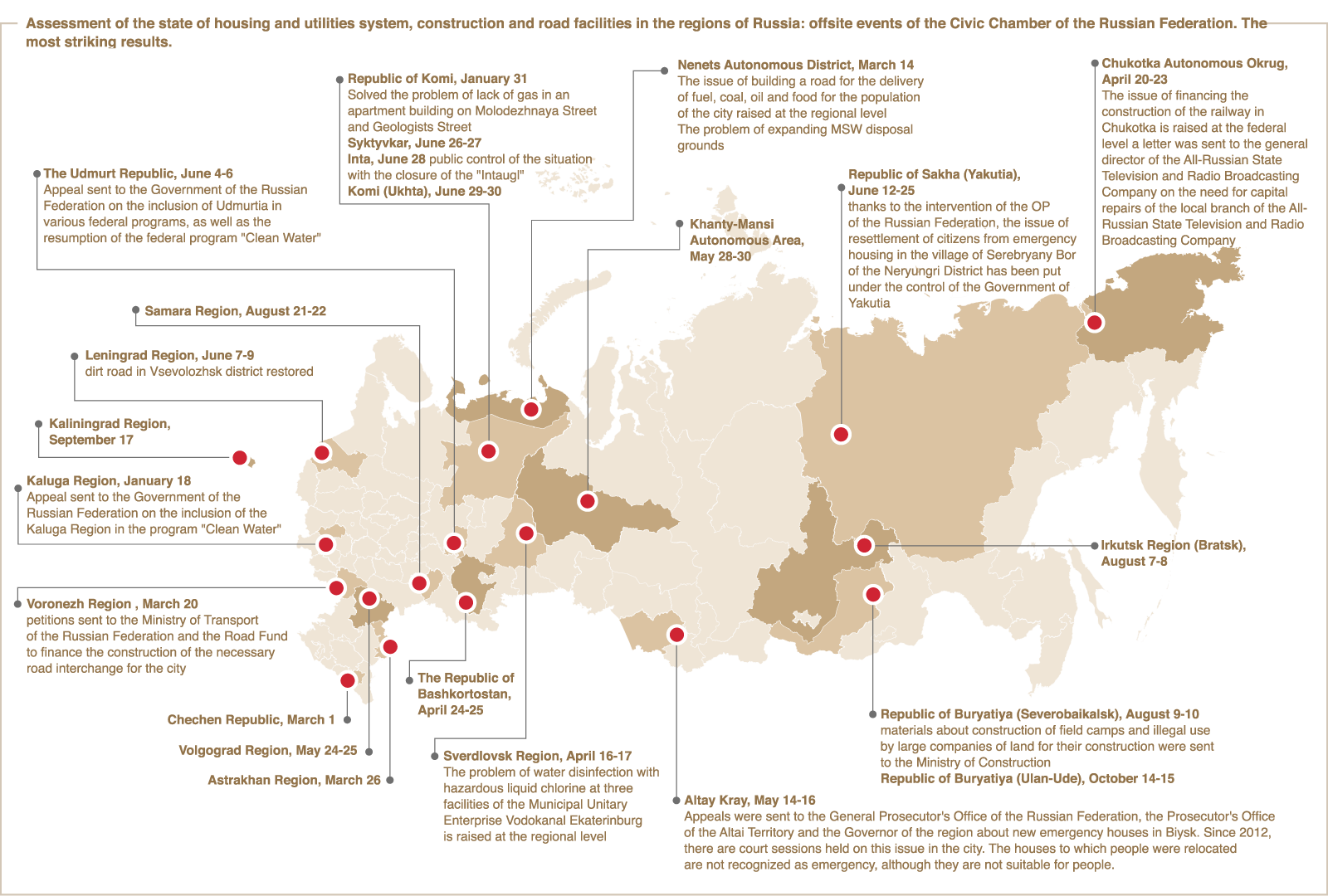
TRADITIONALLY, THE ISSUES OF EDUCATION AND SCIENCE, PREPARATION OF THE NEW GENERATION TO LIFE HAVE BEEN ADDRESSED BY THE Civic CHAMBER OF THE RUSSIAN FEDERATION.
Traditionally, the issues of education and science, preparation of the new generation to life have been addressed by the Civic Chamber of the Russian Federation.
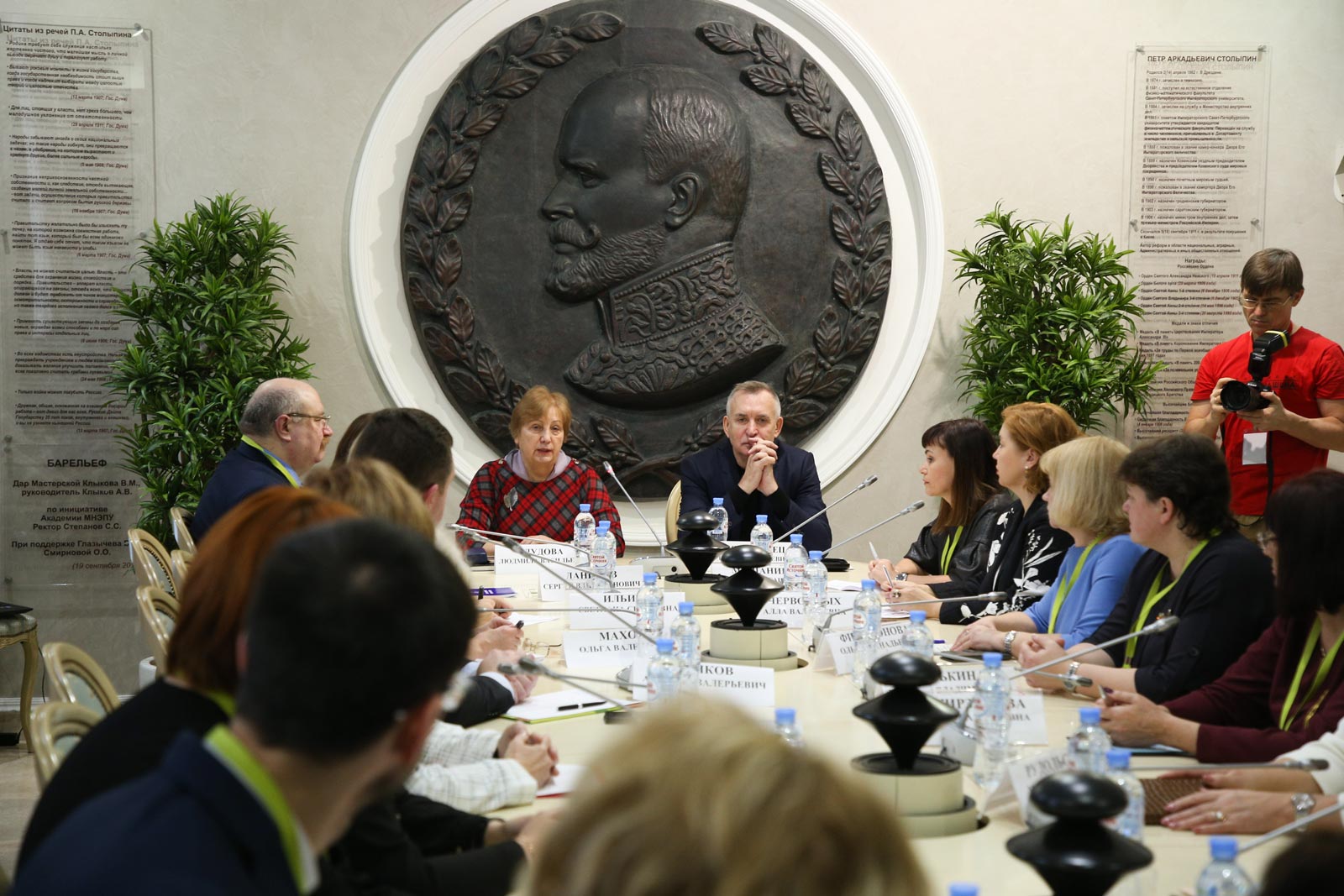
In 2018, there were three main areas in the consideration of education in our country:
The solution to these problems is associated with a set of measures to be taken. Thus, practice has shown that much has become organized in the system of vocational education. It is necessary to make changes to the standard form of a target education agreement in order to clarify the mutual rights and obligations of the parties – the university, the student, the employer in order to give the targeted training greater flexibility and efficiency. This new “tripartism” is still poorly taken into account, especially when the state acts as the employer (and customer of training): the educated young man does not have any obligations to it, although the budget has spent significant funds on his education.
But before entering some institution of higher or vocational secondary education after school, high-quality professional orientation is necessary. This is not an easy process in the modern world, it is a kind of presentation of various spheres of employment, many of which were not able to present themselves in an attractive way, to get young people interested. As a result, there are imbalances in educational policy, the desire of many schoolchildren to choose the profession of economists and lawyers, although after graduation it turns out that finding work in these areas is difficult or even impossible. It is necessary to create a digital platform, a unified information environment for ensuring the formation, actualization and long-term planning by the population of their individual educational and professional trajectories. To achieve this important goal, the Civic Chamber of the Russian Federation implemented in 2018 the project “Professional Trajectory”. In the course of the discussions held (Moscow, Tomsk), proposals were made for a qualitative increase in the efficiency of information resources in the field of vocational guidance, vocational education, employment, and advanced training.
In addition, the Civic Chamber of the Russian Federation addressed issues of pre-school education. For example, on February 2, 2018, a hearing was held on “Implementing the initiative of the President of the Russian Federation to ensure the availability and quality of pre-school education and care services for children under 3 years old”, and the 7th International Conference “Education and Training of Young Children” took place on May 19-20. Much attention was paid to the promotion of children’s reading, the introduction of educational programs for pre-school and primary education, general education in gymnastics and swimming in the Russian Federation, film education and media pedagogy in additional education of children and young people.
The fine art is invaluable for the comprehensive upbringing and development of the child. Currently, the vocational education system in terms of training specialists of a wide artistic profile is losing its position, and the system of additional education has many difficulties – from an underdeveloped material base to a shortage of teachers in the regions.
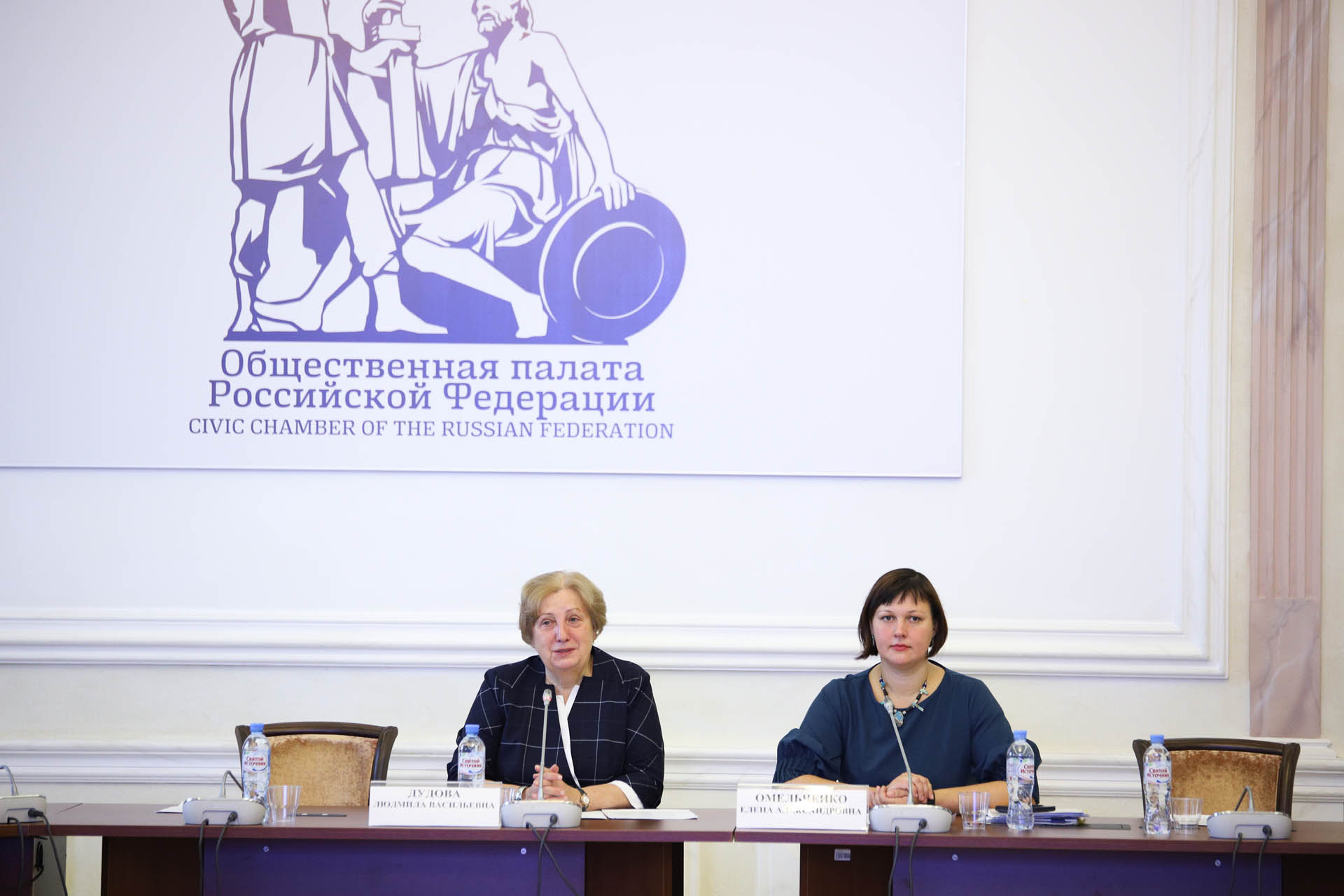
The Civic Chamber of the Russian Federation believes that the state should pay more attention to this area. In addition, it is necessary to hold modern contests of children’s drawings, music contests and other activities that enhance the cultural education of children from an early age280 “Visual art is invaluable in raising children” – Denis Kiris // Website of the Civic Chamber of the Russian Federation, 12.02.2018: https://www.oprf.ru/press/news/2018/newsitem/43999..
The Civic Chamber of the Russian Federation constantly keeps in touch with the parent community on the most urgent issues of education and for this purpose hot lines are open on the following issues: possibility of canceling school grading system, from the first to the ninth years281 Survey of the Civic Chamber of the Russian Federation: about 70 percent of respondents are against the abolition of grades in primary school // Website of the Civic Chamber of the Russian Federation, 28.09.2018: https://www.oprf.ru/press/news/2018/newsitem/46742.; preparation to the Unified State Exam in 2018282 Preparing for the Uniform state exam: how it happened // The Website of the Civic Chamber of the Russian Federation, 27.09.2018: https://www.oprf.ru/press/anno/newsitem/45761.; teaching native language283 Online survey: How a native language should be taught?; school fees284 A hotline on school fees opens in the RF Civic Chamber // Website of the Civic Chamber of the Russian Federation, 21.09.2017: https://www.oprf.ru/ru/press/news/2017/newsitem/41731..
In early June, the Civic Chamber of the Russian Federation once again launched a hotline on USE issues, where anyone could get an expert advice by phone or report violations.
As it is known, from 5.5% to 56% of school graduates received zero points for essay in a foreign language in 2018, in several regions at once According to the Federal Service of Supervision in the Sphere of Education and Science, about 40% of schoolchildren across the country did not cope with this part of the USE285 “We are witnessing a serious crisis of writing” – Lyudmila Dudova // Website of the Civic Chamber of the Russian Federation, 07.08.2018:: https://www.oprf.ru/press/news/2018/newsitem/46202..
The line received about 300 petitions, and the number of people, who passed the Unified State Exam in 2018 totaled more than 700 thousand people. Figures show that many of the problems of preparing for the exam and its conduct were removed. Still, the very fact of appeals indicates the need to continue work on improving the organization and conducting the final test, improving the quality of work of subject commissions, analyzing the criteria for checking part of the exam, which provides a detailed answer. We are happy that the geographical localization of petitions is noted. This year, representatives from only nine regions turned to the line.
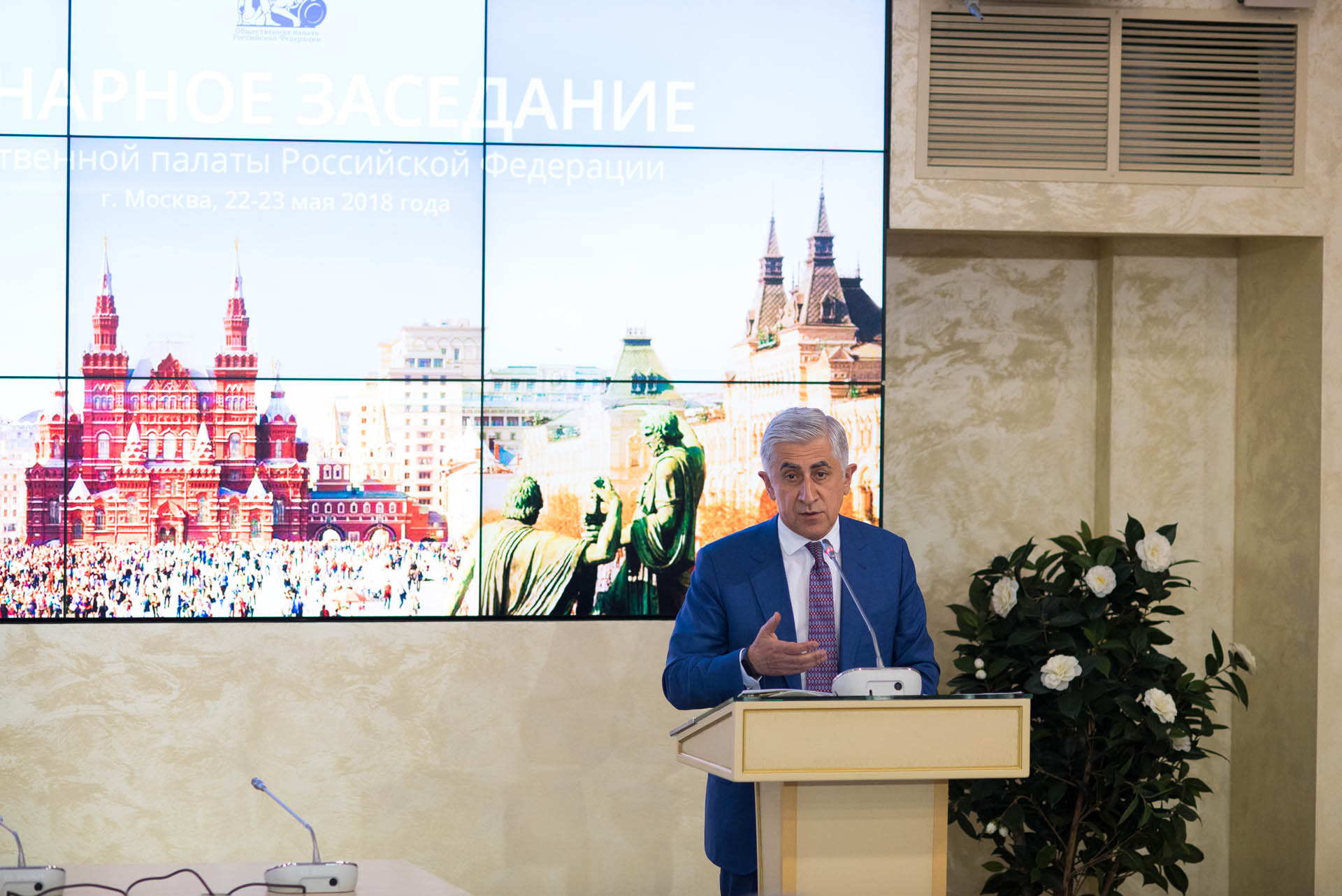
The content of the petitions, as in previous years, is mainly related to the procedure for organizing the exam, both in terms of the exam pass (malfunction of the throughput technique) and the work of teachers at the exam acceptance point.
The Civic Chamber of the Russian Federation also notes that not a single call criticizing the assignments has been addressed to the hotline this year286 They are criticizing not the tasks, but the organization of examinations: the first results of the hotline of the Civic Chamber of the Russian Federation on the Unified State Exam 09.07.2018: https://www.oprf.ru/press/news/2018/newsitem/45906..
Throughout the year, the training of educators, teachers, and instructors remained an important issue: On February 20 in St. Petersburg, a round table was held on “Developing standard training standards for higher technical education on” Bologna “and classical engineering training”; March 2 in Moscow – a round table “The development of high-quality teaching staff as the key to successful industrial development”; April 4 – hearings on the draft professional standard “Specialist in the field of education” in the additional education of children and youth.”
The Civic Chamber of the Russian Federation believes that it is necessary to pay attention to the training of teachers, the advanced training of those teachers who work with graduates, in particular, not only to their linguistic, but also to their general cultural development287 “We are witnessing a serious crisis of written language” – Lyudmila Dudova // Website of the Civic Chamber of the Russian Federation,07.08.2018: https://www.oprf.ru/press/news/2018/newsitem/46202..
However, many issues remain unresolved. The participants of the events in the Civic Chamber of the Russian Federation noted that the level of bureaucratization of the work of both teaching staff and institutions at all levels of education and science is very high. Moreover, the situation is only aggravated. Another urgent issue is preparation for the Unified State Exam, Basic State Examination – the burden of preparing for exams becomes unbearable for families, because both tutoring and additional workloads on students lead to serious financial expenses, affecting the health of schoolchildren.
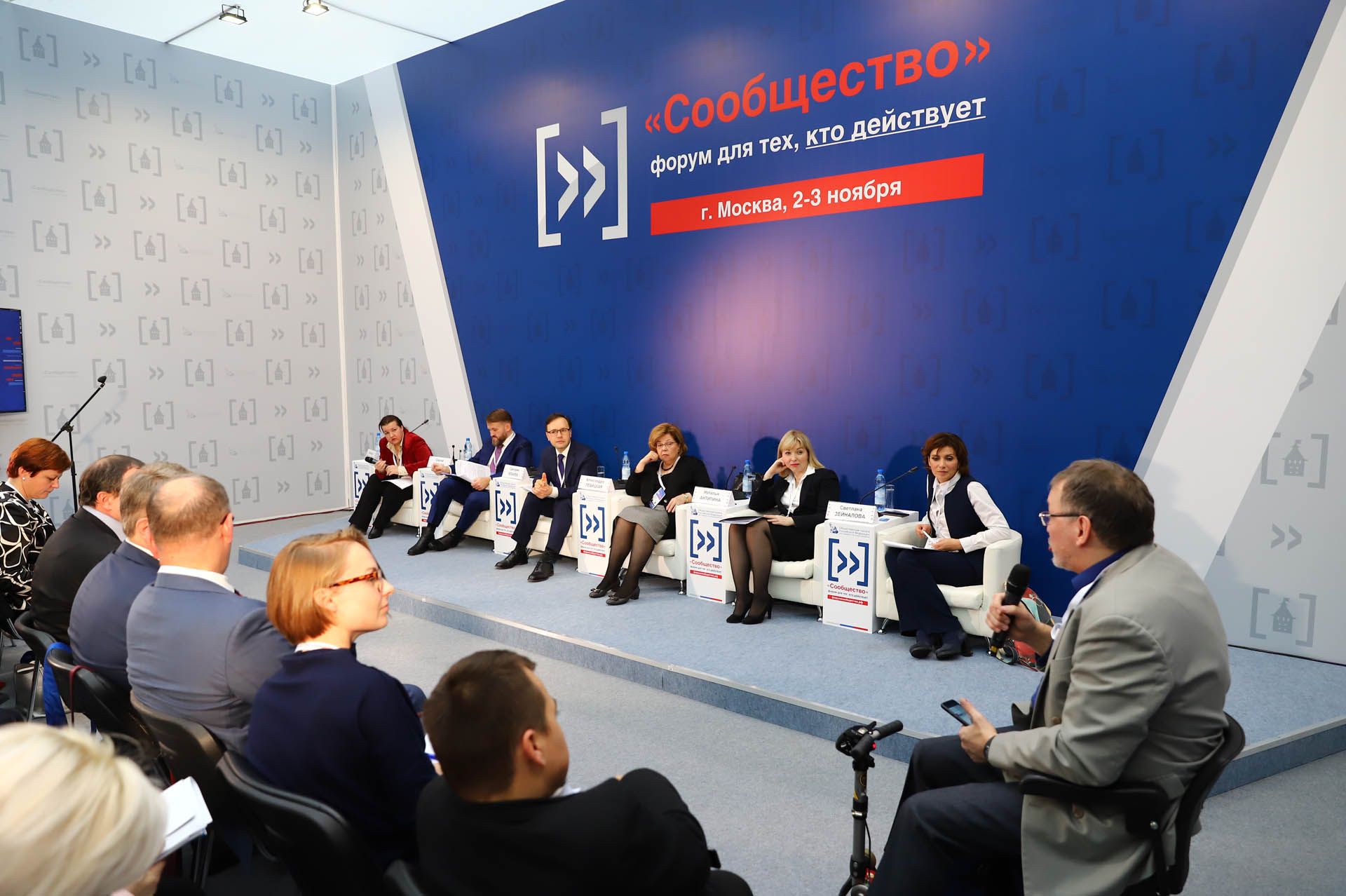
The main document defining the state science and technology policy is the Doctrine of the Development of Russian Science, approved by the Decree of the President of the Russian Federation No. 884 of June 13, 1996. The Doctrine is based on the thesis that “Russian science has made a huge contribution to the development of the country and the world community over its long history. Russia owes much of its position as a great world power to the achievements of Russian scientists.”
In the modern world, no country can take its place among the leaders unless it has its own fundamental science as the basis of culture, technology, education, high technology industry. Based on this, it is necessary to take the following measures at the state level as soon as possible: create a strategic planning system based on a scientific analysis of global trends and modern forecasting methods; form a new system of state management of research and development (coordination of research and innovation activities should be assigned to one of the Vice-Presidents of the Government); restore the Russian Academy of Sciences as the leading scientific and expert organization of the country; review approaches to resource provision in the field of research and development (by 2025 it is necessary to ensure the share of science in GDP of at least 2%); The modern education system should not be viewed as a service, but as one of the main institutions for ensuring national security.
IN MODERN WORLD, NO COUNTRY CAN TAKE ITS PLACE AMONG THE LEADERS UNLESS IT HAS ITS OWN FUNDAMENTAL SCIENCE AS THE BASIS OF CULTURE, TECHNOLOGY, EDUCATION, HIGH TECHNOLOGY INDUSTRY.
Cultural and leisure cultural institutions in small towns and rural settlements have 80% of a worn-out engineering and technical complex, the modernization and restoration of which requires significant financial investment. Many institutions have been closed due to their condition. The budget of the urban or rural settlement is not able to solve these problems in full.
It is estimated that 70% of the surveyed heads of rural libraries and houses of culture, the question of financing is the most relevant one. There is a shortage of qualified personnel. People do not want go to work in the sphere of culture because of low wages.
In 2018, the Civic Chamber of the Russian Federation held a special monitoring “Access to Culture”288 The survey results are obtained from the following subject regions of the Russian Federation: Kaluga, Moscow, Smolensk, Chelyabinsk, Ulyanovsk, Tula, Kirov, Novosibirsk, Kemerovo, Kursk, Irkutsk, Ivanovo, Tambov, Murmansk, Samara, Saratov, Arkhangelsk, Astrakhan, Leningrad, Orenburg, Sverdlovsk, Lipetsk, Magadan, Nizhny Novgorod and Tver regions, Primorsky and Krasnodar Territories, Republics of Buryatia, Crimea, Komi, Karelia,Karachay-Cherkessia, Khanty Mansiysk Autonomous District. aimed at analyzing the situation in small towns and rural settlements. The monitoring revealed that the situation with cultural and leisure establishments under the jurisdiction of local government leaves much to be desired. No funding to support and replace worn-out logistics and communications. Communications and buildings are preserved, as a rule, from Soviet time. There are clubs, houses of culture, in which people are forced to work at a temperature of 15 degrees Celsius. Many are closed or in disrepair. Regional cultural support and development programs are not aimed at solving these problems. We need an open dialogue with the authorities of the regions in order not to lose the cultural centers that we have today.
Social activists from the regions reported on the closure of libraries in rural settlements, the majority indicated that local governments say that there is a total lack of funding for this activity. No region reported on population surveys in reorganization of rural libraries. Many libraries have survived only due to the fact that they were transferred to the system of cultural and leisure institutions. However, such a reorganization leads, as a rule, to the loss of the status of the library, and hence financing.
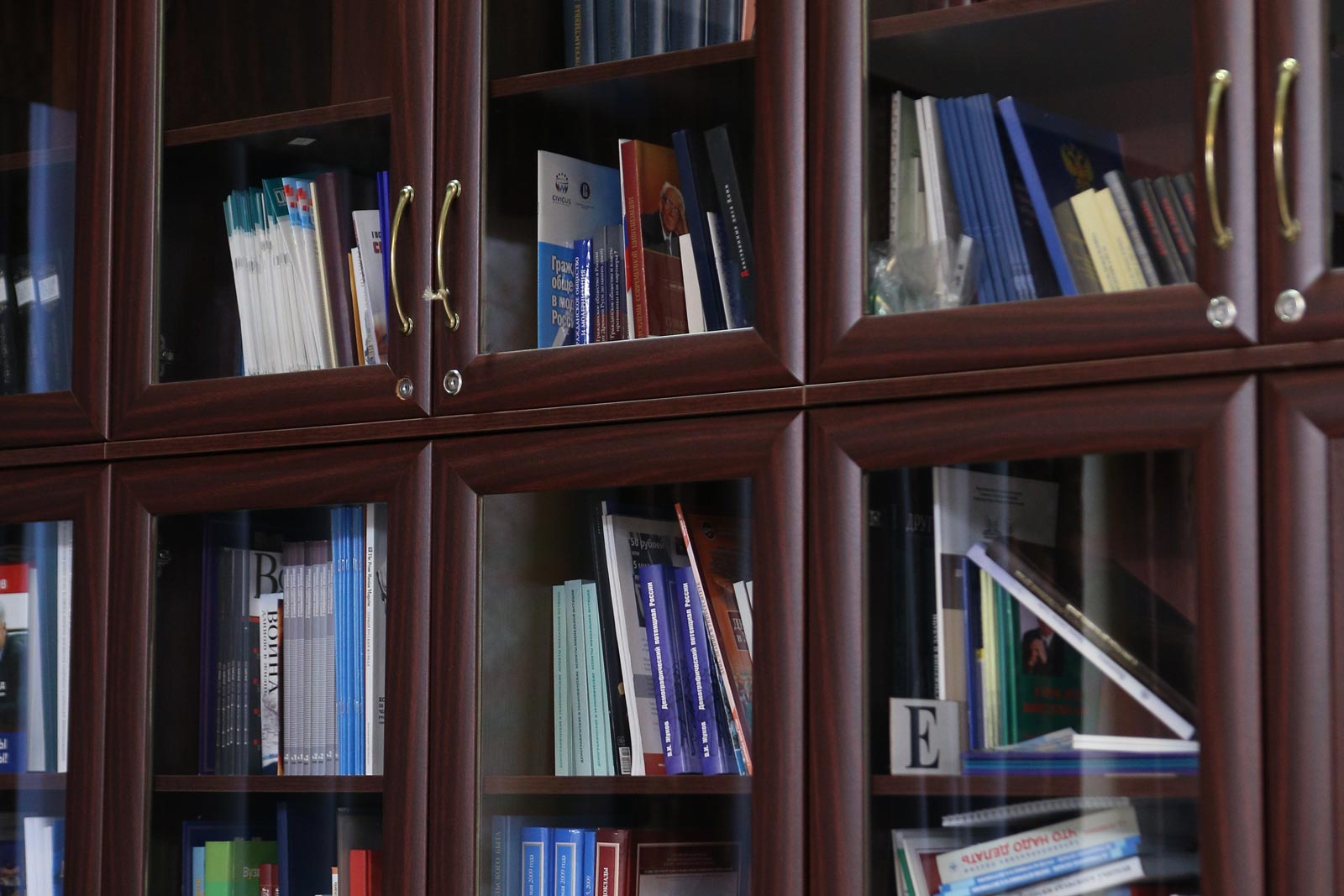
In 2018, a significant number of events occurred in the Russian cinema, there were also problems, confrontations associated with demonstration of individual films. The Civic Chamber of the Russian Federation held the whole series of events on the subject of cinema, having considered both individual trends in the development of this art and its educational role for young people.
Thus, on March 26, a round table discussion “On the problems of the development of Russian animation as a means of popularizing classical and contemporary works of art” was held. And on March 29, a round table “Documentary Film in Russia: Problems and Development Prospects” took place.
The upbringing of children and youth by means of cinema was discussed at events in the Civic Chamber on May 16, July 16, July 18, August 8. The topic of youth cinema has fallen out of sight of the cinema, therefore, the development of system sentences is important. There used to be a target studio, so a lot of children’s films were produced. Within the framework of the declared Decade of Childhood, the state can give it full support.
The Civic Chamber of the Russian Federation supports the initiative of the Government of the Russian Federation to create the children’s state television channel289 How to return children’s and youthful cinema on film sets and on screens? // Website of the Civic Chamber of the Russian Federation, 17.07.2018: https://www.oprf.ru/press/news/2018/newsitem/46024.
The Civic Chamber of the Russian Federation receives a large number of petitions from citizens asking them to pay attention to the preservation of old estates. And the Chamber addressed this problem. On January 30, a round table discussion was held on the Manor Tourism Industry – Restored Manors of Russia. It was attended by members of the Public Council under the Ministry of Culture of the Russian Federation, representatives of the Association of owners of historic estates, as well as officials of the Federal Agency for Tourism of the Russian Federation. The event was attended by the head of the Federal Agency for Tourism Oleg Safonov.
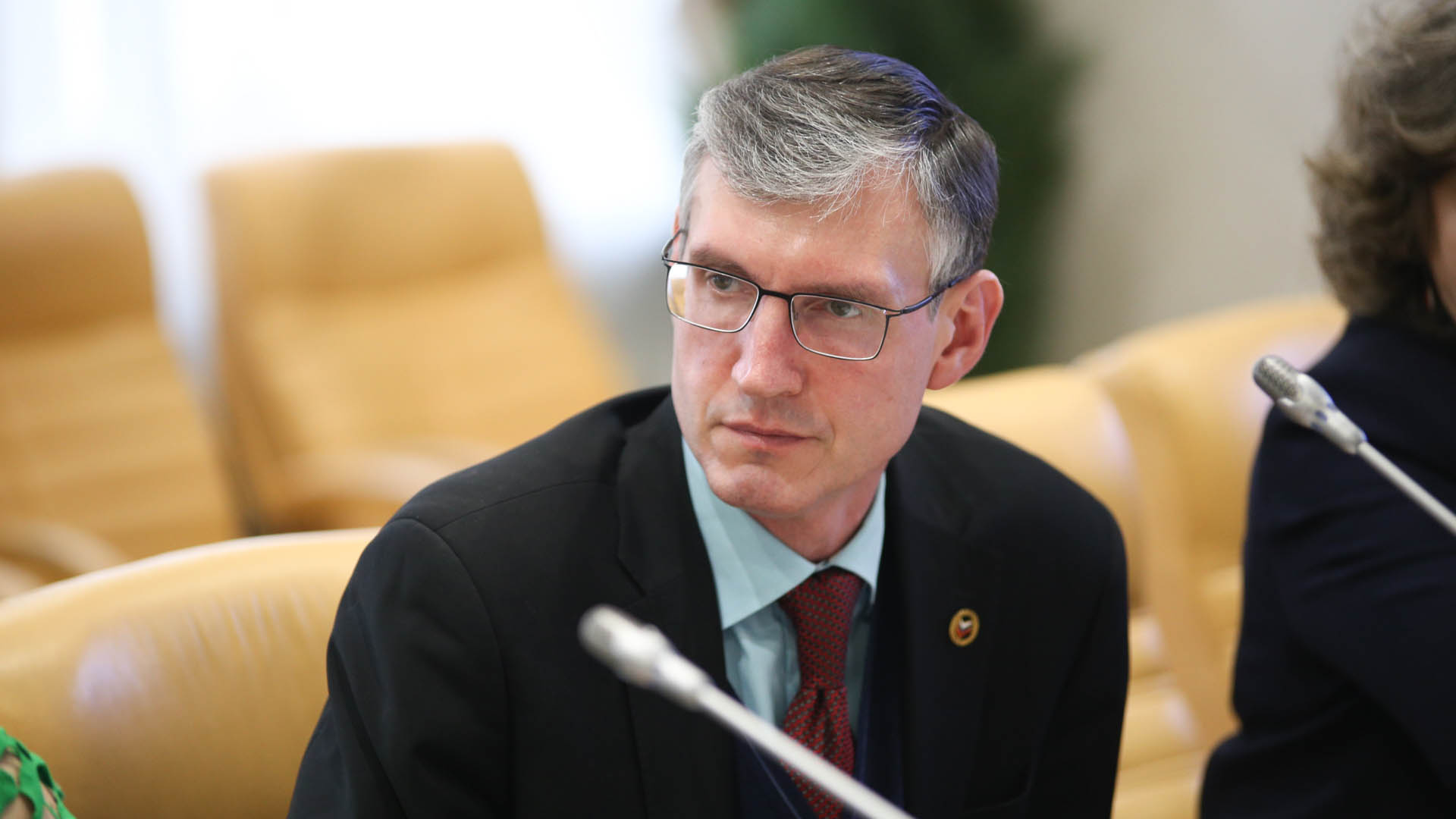
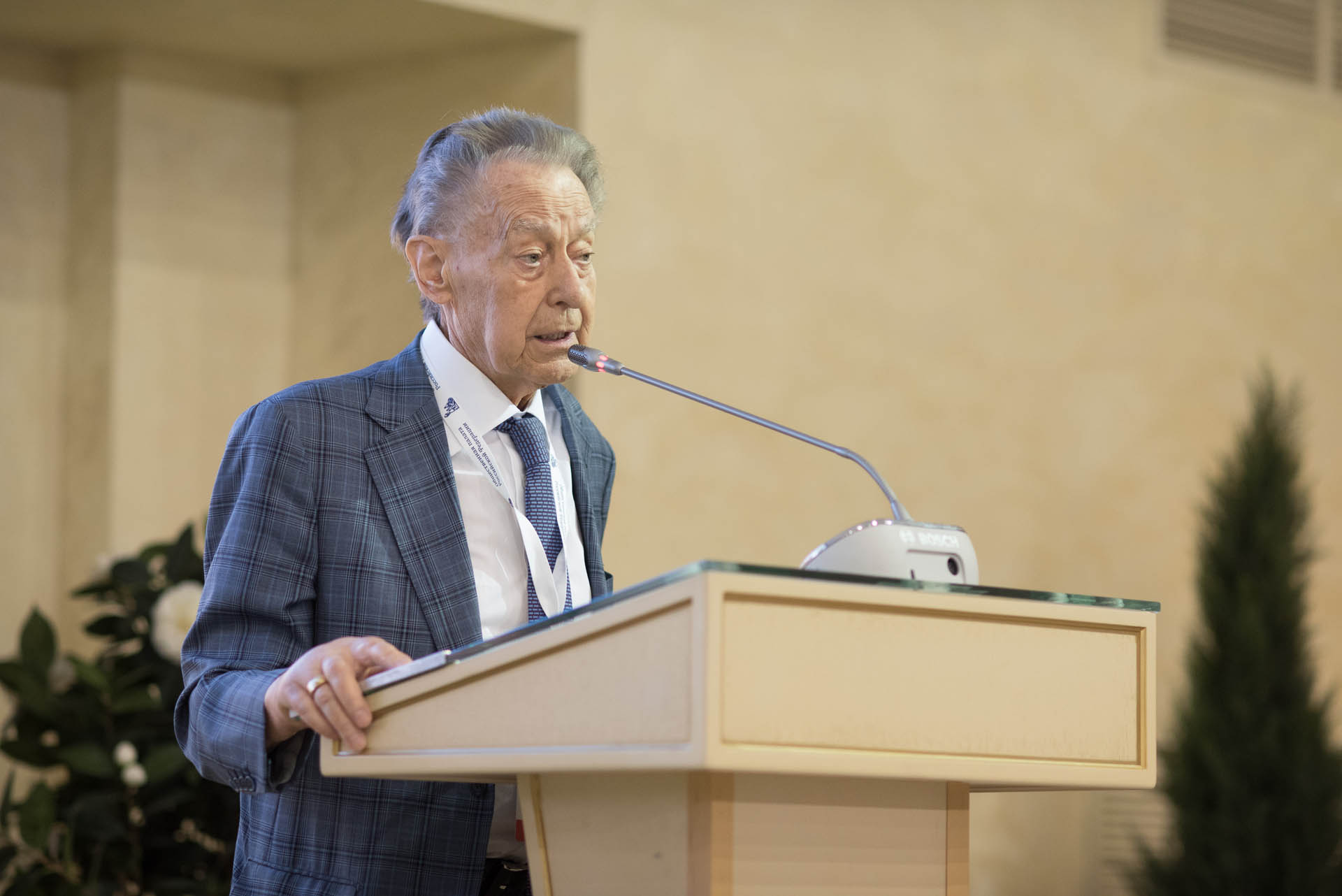
Andrei Dementiev, famous poet, honoured arts worker, passed away on June 26. He passed away just a little short of his 90th anniversary.
For more than ten years he was a member of the Civic Chamber of the Russian Federation. Despite his age, Andrei Dementiev to the end remained a young and energetic, partial and sympathetic person. While speaking at a plenary session of the Civic Chamber in May, he struck his colleagues with a fiery speech, appealing for social justice and denouncing the vices of society290 Civil society is preparing for a breakthrough: plenary session of the RF PC // Site of the Civic Chamber of the Russian Federation, 05.22.2018: https://oprf.ru/press/news/2018/newsitem/45355..
The main creation and pride of Andrei Dementiev was the House of Poetry. At his invitation, creative evenings were held here by Yevgeny Yevtushenko, Larisa Rubalskaya. The House will remain one of the main centers of cultural life in Tver.
A street in Tver is named after the poet. One of the initiators of this step was the Civic Chamber of the Russian Federation291 Tver Street renamed in honor of Andrey Dementiev//Website of the Public Chamber of the Russian Federation, 14.11.2018: https://www.oprf.ru/press/news/2018/newsitem/47341..
The Civic Chamber of the Russian Federation supports the initiative to establish new creative unions. In particular, there is a need to create a Poets’ Union in Russia. Such a union will help authors to publish their creative works in specialized editions, create conditions for the performance of touring activities of poets in the regions of Russia and abroad, organize the speeches of young authors on the major specialized sites. It will also help to provide conditions for the implementation of multi-genre programs and projects, to create an efficient search mechanism for young creative individuals able to set independent creative groups. The Poets Union will help to establish a dialogue between different generations of poets.
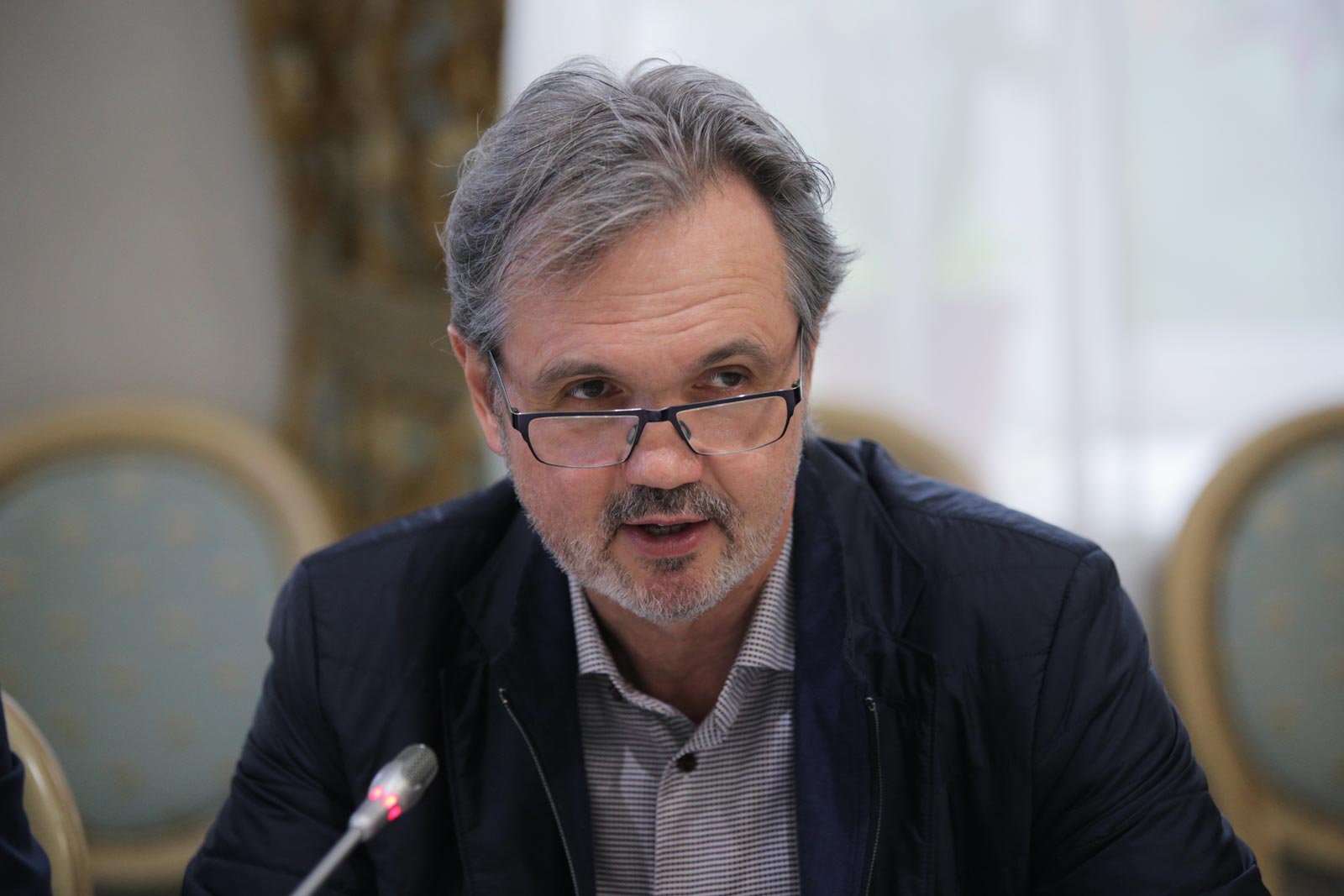
On October 4, the Civic Chamber of the Russian Federation presented a large-scale project to name the main airports of the subject regions of the Russian Federation after our prominent compatriots. The project, called the “Great Names of Russia”, is not intended to replace the existing names, it is only about adding new ones.
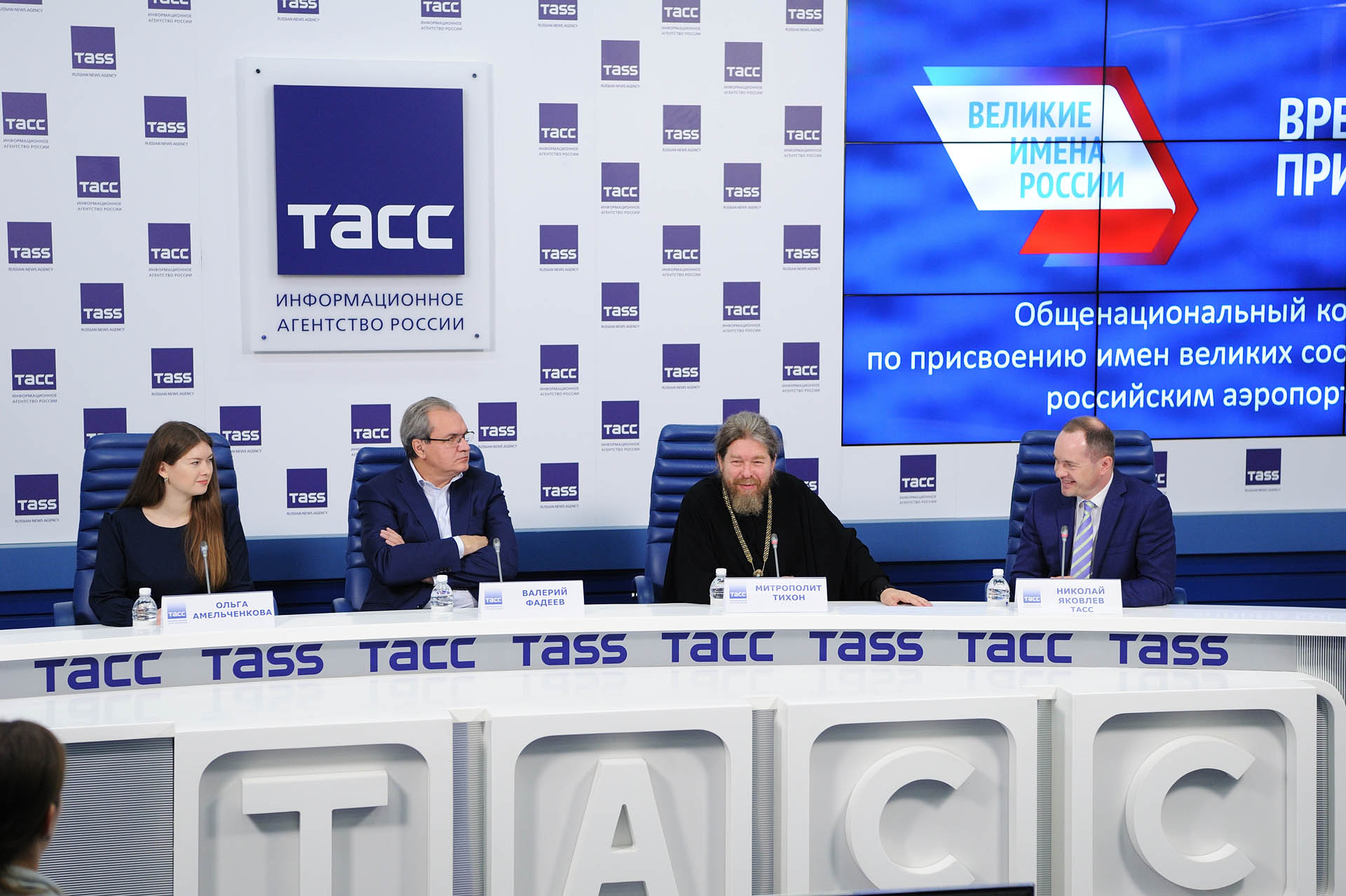
The project “Great Names of Russia” is a public initiative of the Russian Geographical Society, the Society of Russian Literature, the Russian Historical Society, the Russian Military Historical Society. The Civic Chamber of the Russian Federation also decided to join this initiative and coordinate its work.
It is assumed that according to the results of the contest, the official names of 45 Russian airports of international and federal importance with an aggregate passenger traffic of more than 170 million people will be get the names of prominent compatriots292 “Great names: airports will get the names of famous Russians//Website of the Public Chamber of the Russian Federation, 04.10.2018: https://www.oprf.ru/press/news/2018/newsitem/46793..
In 2018, the West continued to increase pressure on our country, using unilateral sanctions. In the midst of a difficult international situation, Russia every year increases the representation of Russian NPOs at international venues under the leadership of the Civic Chamber of the Russian Federation. Thus, members of the Civic Chamber of the Russian Federation spoke at the OSCE annual meeting to review the implementation of human dimension commitments in Warsaw and were included in the official Russian delegation to the UN General Assembly; the regularity of meetings with the European Social and Economic Committee was restored; the result of the visit of the delegation of the American Council of Young Political Leaders was a statement that the new generation of leaders could improve relations between Russia and the United States.
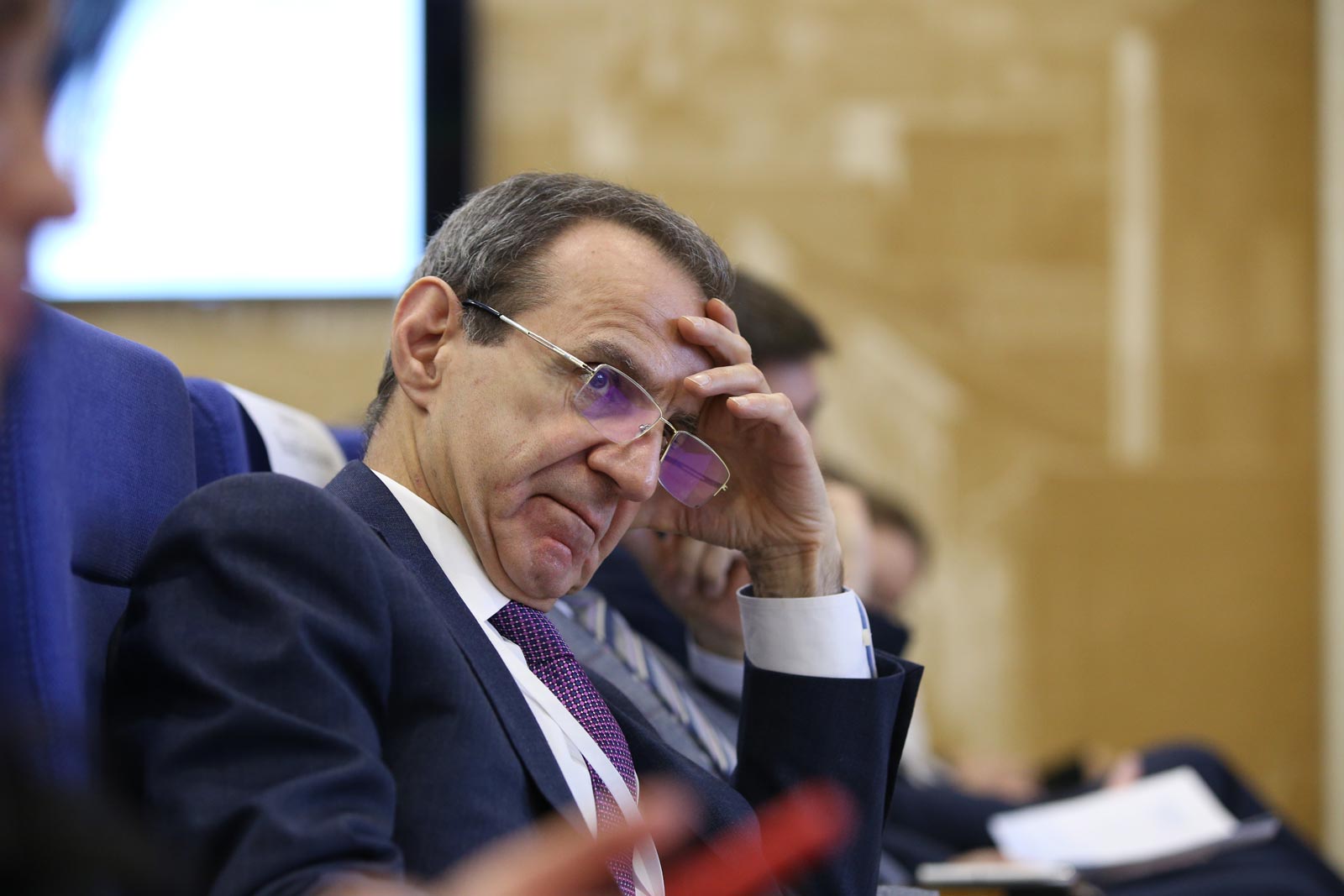
Public diplomacy is versatile and has many different forms, one of which is a cross year program. 2018 became cross year of Russia with both Japan and Germany. The cross year of Russia and Japan was designed to give a powerful positive impetus to bilateral relations by organizing numerous events in politics, economics, culture, science and technology. The cross year of Russia and Germany was dedicated to regional municipal partnerships. The main goal of this year’s program is to deepen communication and mutual trust in Russian-German relations by developing public inter-municipal diplomacy by enhancing cooperation at the municipal and regional levels of both countries. Three Russian-German events were held at the site of the Civic Chamber of the Russian Federation in 2018. The Chamber’s delegation also participated in a Conference in Berlin, during which agreement was reached on the establishment of a permanent mechanism for the exchange of investment projects, training for industry, reporting on key business events293 German business suffers losses due to sanctions and wants to work with Russia// Website of the Public Chamber of the Russian Federation,14.09.2018: https://www.oprf.ru/press/news/2018/newsitem/4657..
ONE OF THE IMPORTANT TASKS IN THE FIELD OF INTERNATIONAL COOPERATION IN THE YEAR OF THE VOLUNTEER WAS THE STRENGTHENING OF TIES BETWEEN VOLUNTEER ORGANIZATIONS FROM RUSSIA AND OTHER COUNTRIES.
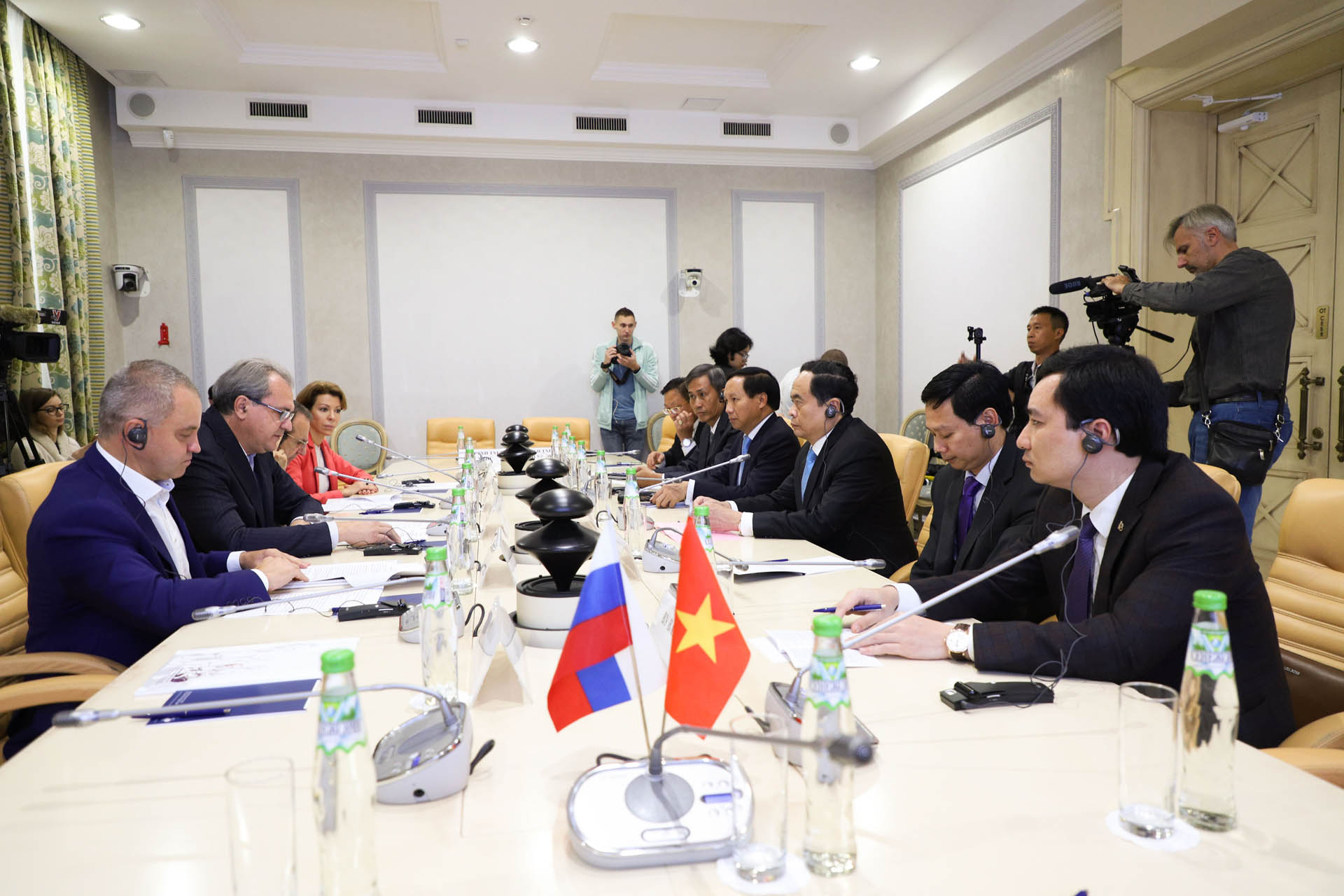
In general, 2018 was a year of growing activity of international cooperation among non-governmental organizations, including the Civic Chamber of the Russian Federation, which is a significant help in promoting Russian policy in the international arena: reciprocal visits were made and memorandums of understanding and cooperation between the Civic Chamber of the Russian Federation were concluded and the Forum of the Civil Public Alliance of the Kingdom of Cambodia, the Civic Chamber of the Russian Federation, All-Russia People’s Front and the Patriotic the dawn of Vietnam; Memorandums with the Economic, Social and Ecological Council of France, the Civil Alliance of Kazakhstan and the Council of State Support of Non-Governmental Organizations under the President of the Azerbaijan Republic are being prepared for signing; the Chamber delegation took part in election observation at the international level, namely the general parliamentary election in Cambodia.
Russia traditionally plays one of the leading roles in the International Association of Economic and Social Councils and similar institutions. In 2018, the Russian experience in digitization of the economy and society aroused great interest from delegations of the developed and developing countries members of the Association at a presidium meeting, in discussions at the General Assembly and at the Association’s international seminar at ILO headquarters in Geneva (Switzerland).
Despite the fact, that digital information and communication technologies have a major impact on enhancing the interaction of representatives from different countries, they are nevertheless unable to replace direct human communication, which overcomes the prejudice propagated by politicians. The task of bringing positions between the countries is ultimately carried out through public diplomacy channels and falls on the shoulders of civil society. Thus, the World Soccer Cup held in the cities of Russia clearly demonstrated how direct acquaintance of tourists and fans with Russia has largely cleared up the atmosphere of mistrust and negative image of Russia created in foreign countries.
If earlier, there was a struggle for the interpretation of facts, now the struggle is for the proof of the very existence of the facts themselves294 “In the post-truth era, we are fighting for the facts” // Vesti FM, 27.08.2018: https://radiovesti.ru/brand/61007/episode/1891088/., including historical ones. Stepping up educational and enlightenment work in Russian society, and especially among young people aimed at rooting the understanding of historical reality and countering the revival of Nazi ideology is included in the list of priorities of the Civic Chamber of the Russian Federation. At the site of the Chamber in 2018, several international meetings were held dedicated to the 75th anniversary of the uprising in the Sobibor camp, as well as a scientific conference dedicated to the 80th anniversary of Munich Agreement. The engagement of representatives of foreign countries in these events demonstrated the importance of the struggle for history and the transfer of the values of their grandfathers who fought against fascism to young people, not only for Russia, but also for Europe.
The Civic Chamber of the Russian Federation stressed the inadmissibility of the distortion of history, which poses a threat to the country’s national security, in connection with the absentee accusation brought against Russian citizens by Vilnius District Court and the requirement of the Lithuanian Prosecutor’s Office for significant terms of imprisonment (life imprisonment for twenty persons). The resolution of the Civic Chamber of the Russian Federation, which turned out to be the only public structure in the country that expressed its attitude to these events, was the result of consistent work to protect citizens of the Russian Federation who participated in the events of January 1991 in Vilnius from an unfair court in Lithuania.
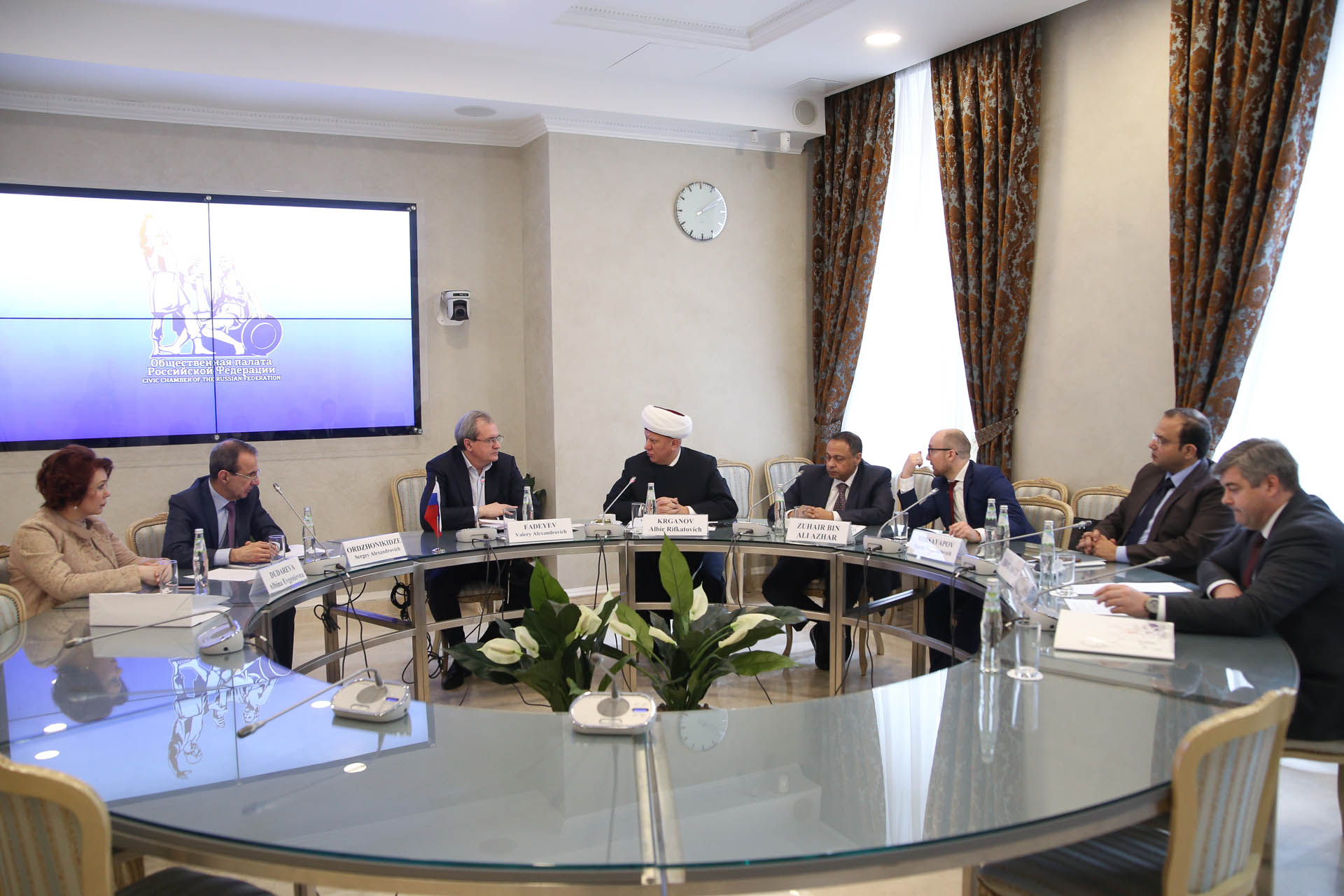
One of the important tasks in the field of international cooperation in the Year of the Volunteer was the strengthening of ties between volunteer organizations from Russia and other countries. Increasing cooperation with volunteers from the CIS countries took place through the approval of the Concept for the Development of Cooperation of the CIS Member States in Support of the Volunteer Movement. In addition, a special unified platform was created for searching and combining international volunteer initiatives295 Project site: volunteers https://xn--90acesaqsbbbreoa5e3dp.xn--p1ai/dobrovolec/year.. In June-July 2018, more than 34 thousand volunteers took part in organizing the FIFA World Cup 2018. In September, the Eurasia International Forum was successfully held, bringing together about 250 volunteers and volunteers from around the world296 Eurasia Forum volunteers are ready to get to work” //Portal of Orenburg Region Government, 31.08.18. http://www.orenburg-gov.ru/news/social/evr/.. The “Volunteers of the World” program of the international youth community Future Team covered more than 150 countries: more than 30 international events, humanitarian missions and educational programs were organized.
Another example was the United Nations Volunteers Program (UNV), which, with the support of the Ministry of Foreign Affairs of the Russian Federation, in 2018, recruited Russians to participate in projects and programs around the world297 Recruitment of Russians to participate in the UN volunteer program announced // RIA Novosti, 10.07.2018: https://ria.ru/sn_volunteers/20180710/1524295038.html.. UNV offered 19 citizens of the Russian Federation an opportunity to gain unique international experience and to help the UN in solving problems of sustainable development in 16 countries of the CIS, Africa, Asia and the Middle East.
A new regional initiative, Russian Volunteer Humanitarian Corps was presented at the final “Community” Forum. This initiative will expand Russian presence at international venues.
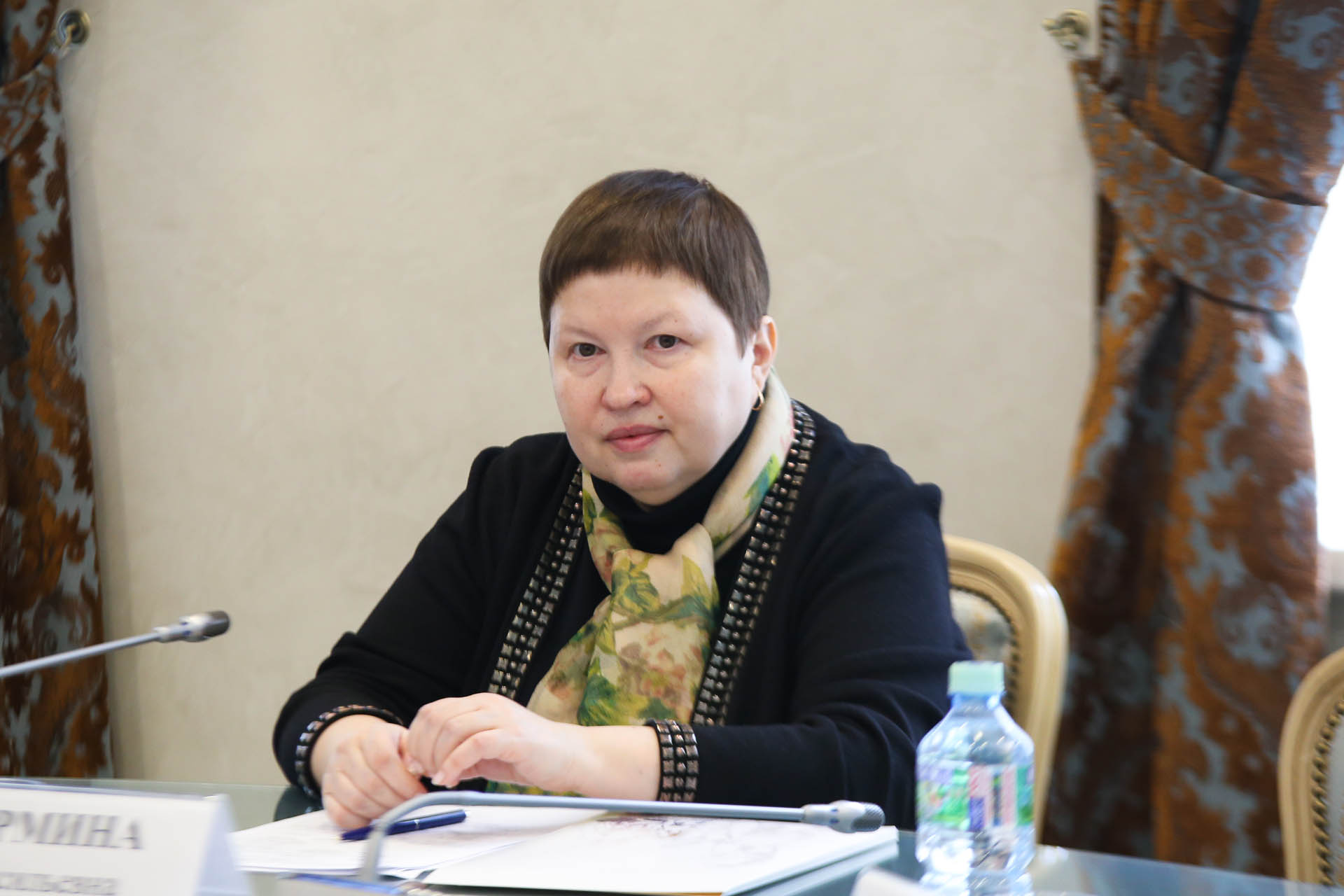
The popularization and distribution of the Russian language abroad for several years now remains one of the priorities of the Civic Chamber of the Russian Federation. In 2018 alone, schools from the United States, Great Britain, Austria, Belgium, Germany, and other became participants in the “Russian Corner” project, where, according to their requests, more than 7,000 multimedia interactive educational games and teaching aids in Russian were sent.
With the development of the information society, terrorism began to penetrate into all spheres of life without exception. The more powerful the mass media becomes and the higher is their role in shaping public sentiment, the wider is the scope of the potential impact of terrorism. In this regard, the role of civil society in countering terrorist activities is increasing. Under the auspices of the Coordination Council on Counter Terrorism, the Civic Chamber of the Russian Federation holds numerous international and domestic events on inter-ethnic and inter-religious dialogue, cooperation in the prevention of extremism and ethnic conflict, social, legal and cultural adaptation and integration of migrants, the development and publication of guidelines on countering pseudo-religious extremism. A special place in the activities of the Chamber is the prevention of extremism among young people. Since August 1, 2015, a hotline has been operating in the Civic Chamber of the Russian Federation to counteract the recruitment of recruiters “Islamic State in Russia” To date, over 200 complaints have been received from 45 subject regions of Russia from people who have been recruited or their relatives298 .
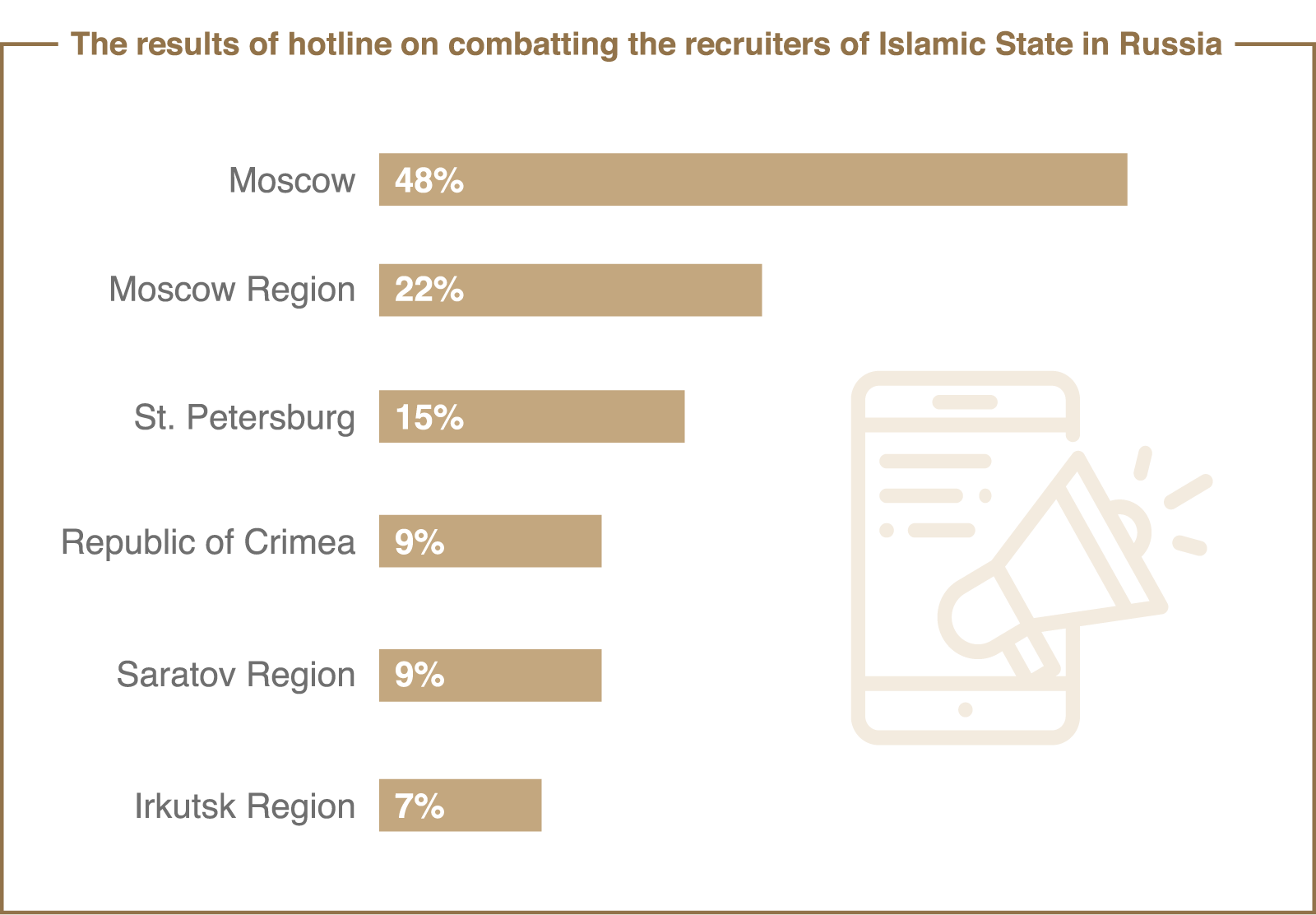
According to the analysis of petitions data and information space presented by the Civic Chamber of the Russian Federation, the main target audience for recruitment is young people and girls aged 22–25 years old – their share reaches 25-40%. In this regard, in 2018, the Civic Chamber of the Russian Federation, the International Public Foundation Russian Foundation for Peace, together with the Anti-Terrorist Center of the CIS member states, issued a handbook on the Prevention of Terrorism and Extremism in the Youth Environment, which summarizes the recruitment methods. Also, Civic Chamber of the Russian Federation opened a hot line to counteract the involvement of young people in destructive and extremist groups299 Public Chamber of the Russian Federation opens a hot line to counteract the involvement of young people in extremist groups//Website of the Public Chamber of the Russian Federation, 07.11.2018: https://www.oprf.ru/press/news/2018/newsitem/47234..
In this regard, raising the voice of Russian civil society, shaping its own international agenda and activating public diplomacy are increasingly in demand. The modern unbalanced world needs points of support, binding threads. Such strong links are cultural exchange, intellectual communication.. It is for this purpose that the Civic Chamber of the Russian Federation has implemented a project “Cultural Belt of the Great Tea Route”. On March 2 and July 12, the participants of the round tables, discussed the project of Russian-Chinese strategic cooperation, while special hearings on March 22 were dedicated to cultural contacts with India.
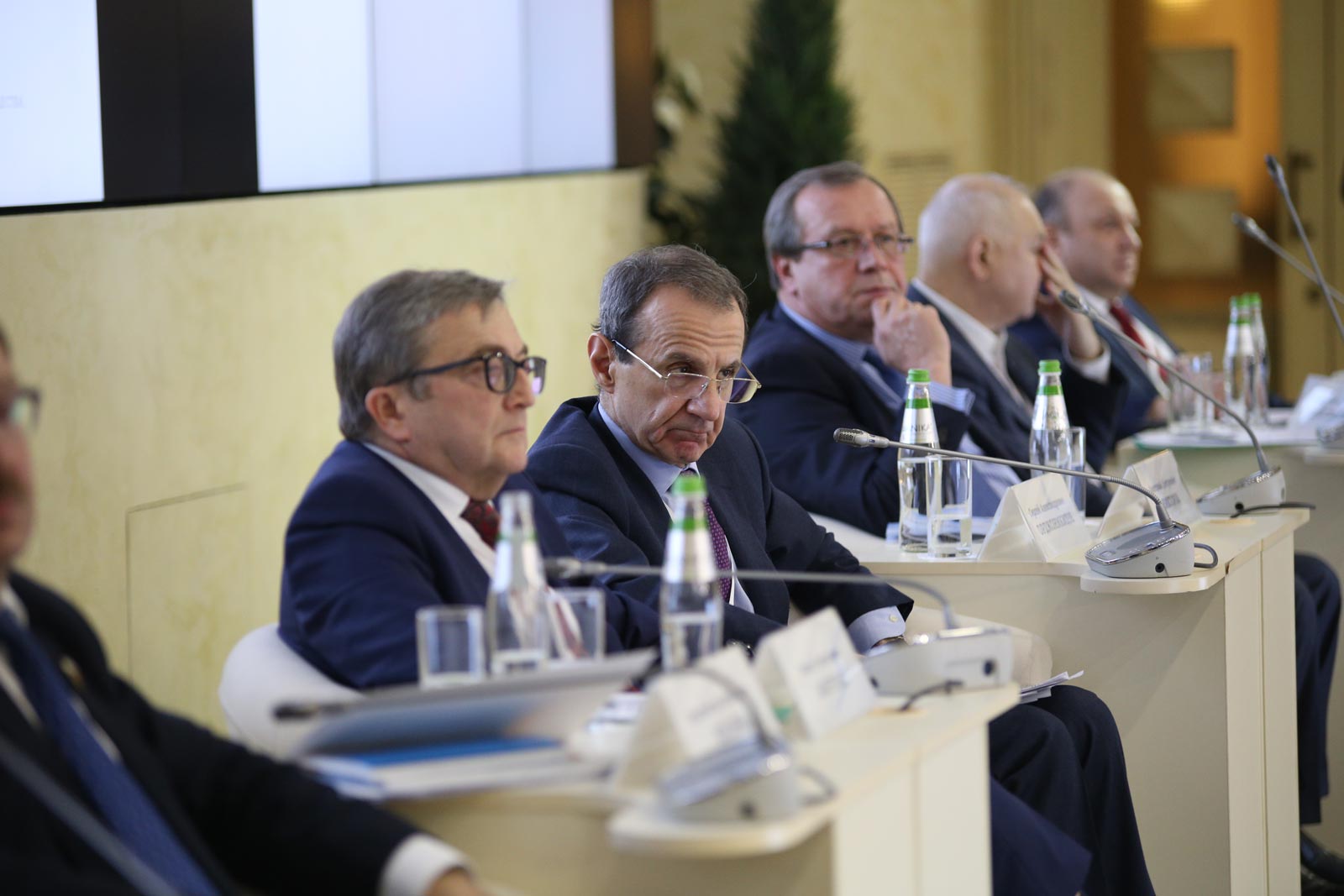
The Civic Chamber of the Russian Federation also proposes to declare one of the coming years as the Year of Public Diplomacy and is ready, together with federal ministries and departments, subject regions of the Russian Federation, to implement additional measures of state and regional support for civil society activists, organizations of all forms of property for the development of humanitarian ties with similar organizations for abroad, with Russian-speaking compatriots and all interested in the development of friendly relations with Russia.
With the support of the Civic Chamber of the Russian Federation and the Russian Peace Foundation in the Republic of Slovenia, the installation and solemn opening of the monument to the great Russian poet Alexander Pushkin took place with the participation of officials of two countries (Russia and Slovenia). This project was implemented by the Embassy of the Russian Federation in Slovenia in cooperation with the State Duma Committee on International Affairs, the Mayor of Ljubljana with the active assistance of the Russian Center for Science and Culture.
Also, the Civic Chamber of the Russian Federation supported such projects as the international photo contest “Children of the World” held as part of the PhotoDiplomacy project. The main goal is to expand and strengthen the methods of public diplomacy through photography to strengthen peace and mutual understanding between Russia and other countries.
This year, photographers from 22 states took part in the contest. They took several hundred incredible for the stories “Children of different ages and nationalities in various life situations”, “Children are ambassadors of peace”, “Children of the world as a creation of humanity”, “Children, changed the world”, “Children-peacemakers”, Look at the world through the eyes of a child.”
The Civic Chamber of the Russian Federation, together with the international public fund “Russian peace foundation” regularly organizes exhibitions of Russian photo artists at leading venues in Moscow and other cities. Only this year, these exhibitions visited 12 countries of the world, where they were displayed in Rossotrudnichestvo buildings.
Recent years have shown: Russia regained the status of a great world power, the center of power, the key and independent player in the international arena. It was the strengthening of our positions that caused the introduction of various sanctions, restrictions, massive anti-Russian propaganda in the Western media. The purpose of these attacks is understandable, to limit the influence of Russia and “demonize” our country in the eyes of the world community.
Inside Russia, on the contrary, we see internal consolidation, growth of trust and civil activity. These positive changes in the public atmosphere are our most important achievement in recent years and the key to further progressive development. The overall success of NPOs, civic chambers and the state was the creation of the unique system of public observation during the presidential election in Russia and in the regions.
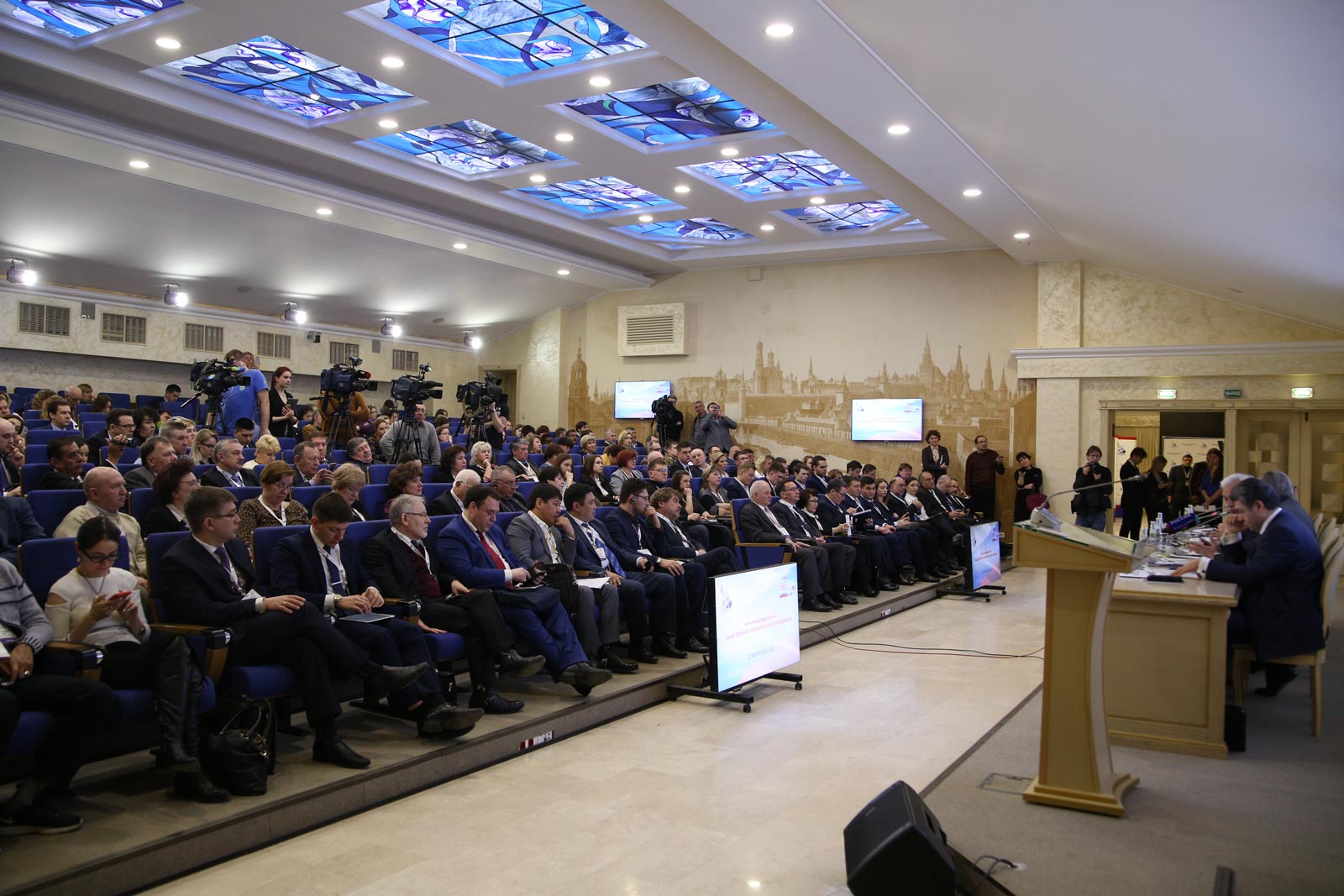
The main goal for the coming years is an economic breakthrough and a change in the quality of life of people. In our country there are huge disparities in the distribution of national wealth, striking the inequality of individual social groups and entire regions. Much of the Russians still live in extreme poverty, villages and small towns are empty, although our country has enormous human capital and natural wealth.
The national projects put forward in 2018 by the President of Russia are designed to correct this situation and significantly improve the quality of life of people. We are talking about the growth of material well-being, but also an increase in life expectancy, transport accessibility, environmental safety and much more. National projects are not just a matter of public administration, they are a development program for the whole country in the coming years, which can be realized only with the engagement of the general public.
Such large-scale development projects are a common cause, which in our history used to bring together and mobilize Russians for the accomplishments that no that no one else believed possible, except us. The main task today is to ensure a broad social mobilization of our society for the implementation of national projects, and the “Russian breakthrough”, at large. Broad circles of Russian society should realize the significance of the “Russian breakthrough” for the destinies of the country, for the needs of various strata and groups, for regions and settlements, and for the well-being of each and every Russian.
Therefore, it is of fundamental importance to preserve and increase social consolidation. It is impossible to force people to love the state, but for a breakthrough we need such a social atmosphere where citizens generally trust the state. Therefore, today the public – state dialogue and the direct engagement of civil society in the implementation and monitoring of the implementation of national projects is more important than ever. This issue is a priority for the Civic Chamber of the Russian Federation and Civic Chambers in the regions for the coming years.
Improving the efficiency of public-state interaction and actually bringing it to the level of public administration, when the bureaucracy consults with the public in making key decisions, is the next priority in the work of the Civic Chamber of the Russian Federation. As part of the implementation of this work priority, the overall success of NPOs, civic chambers and the state was the creation of a unique system of public observation during the presidential election in Russia and in the regions. The Civic Chamber, with its expert resources, seeks to help shape civil initiatives and convey them to the federal authorities. In 2018, at the site of the Civic Chamber, such projects were drawn up in the field of ecology (utilization of household waste), the fight against cancer, changes in the fishing industry, while cheap fish is not available to our citizens. At the regional level, local civic chambers can act as an intermediary if they have sufficient resources and a desire to work with civil society activists.
- The extreme form of dialogue is protest actions: as a rule, in this way people are trying to bring the most acute problems to the authorities, to attract media attention. In one place, people take to the streets, as they can’t tolerate the suffocating stench from the landfills, in the other ones they are protesting the demolition of historic buildings of the 19th century, the highlight of urban landscape. In no case can one priori treat such protests as anti-state activities, on the contrary, it is an example of civic activism that makes the state and society stronger.
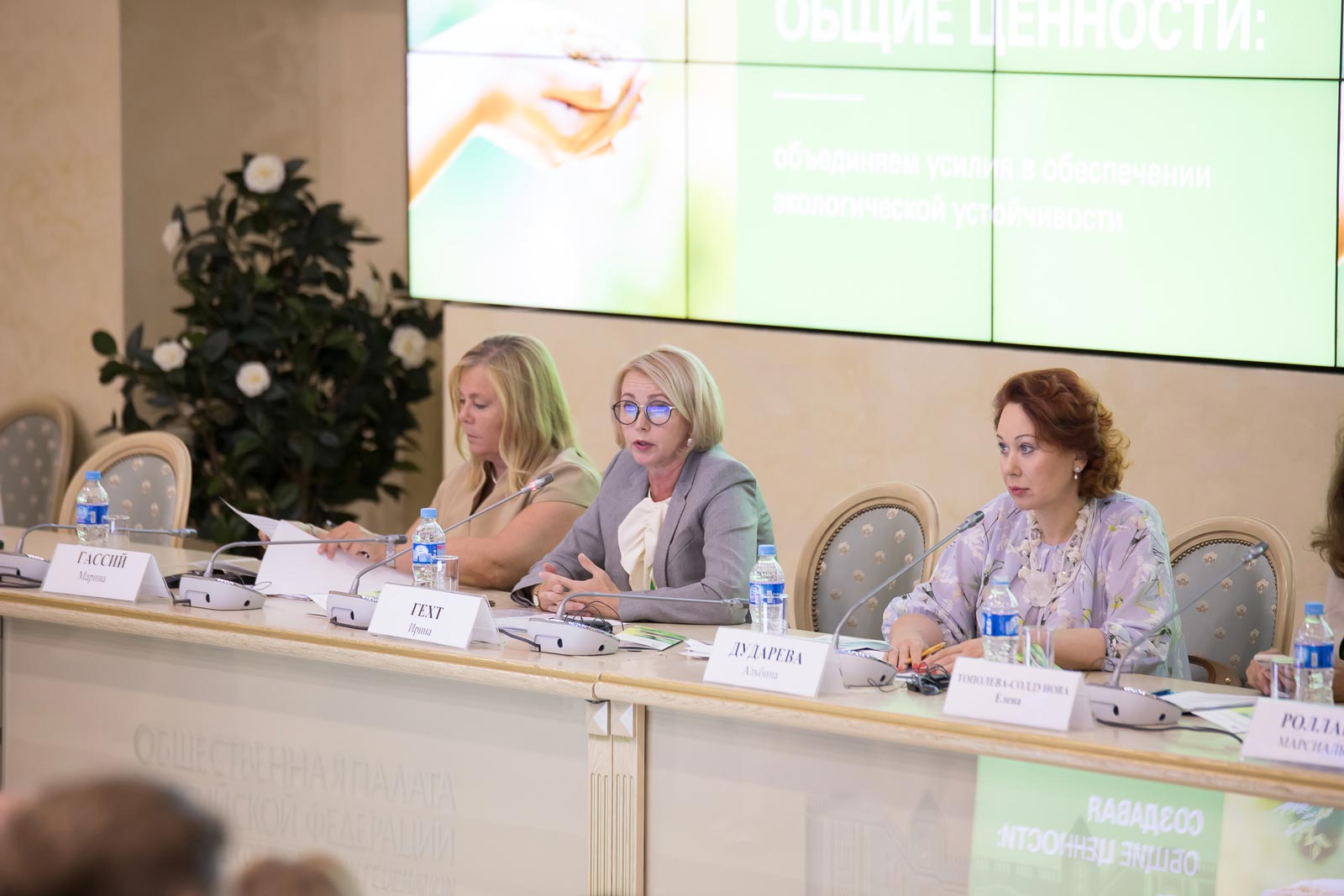
- In recent years, the state has embarked on the support of NPOs that provide social services to the population. The joint work of civil society, authorities, and the expert community to ensure the access of non-profit organizations to the social services market has produced results – the process has been launched, contest begins to develop in the social services market, which should lead to an increase in the quality of services. Nevertheless, there are still barriers. The Civic Chamber has prepared a comprehensive package of decisions for the Government and Federal Authorities, including the maximum use of the potential of SO NPOs to solve strategic problems of Russia’s development for the period up to 2024 as part of the implementation of national projects at the regional level, including tax incentives for NPO following the example of small and medium business and infrastructure development support for non-profit organizations.
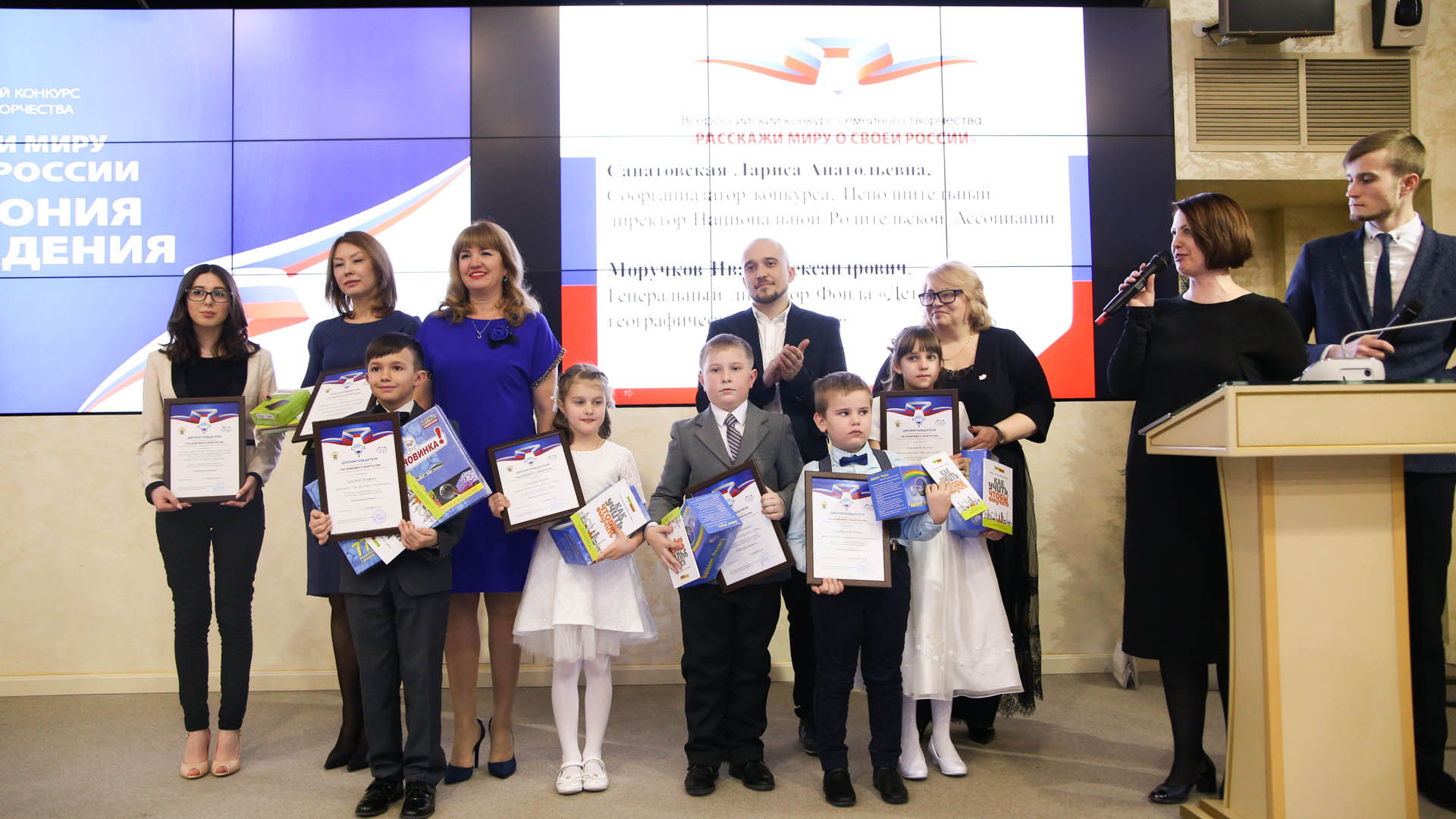
- It is necessary to bring order to the laws governing the sphere of activity of non-profit organizations. The law “On non-profit organizations”, adopted many years ago, is morally obsolete and does not correlate well with the current state of the third sector. It is important to legally distinguish between certain categories of NPOs, because under this abbreviation completely different organizations are hiding – from all-Russian to local, and some of them have nothing to do with non-commercial activities. Structuring the third sector should be accompanied by a reorganization of the statistical accounting system: to create working development programs, you need to know how many active NPOs we have, what they do and what opportunities they have, how many volunteers there are in the country. Today we have no such reliable and updated information.
- The year of the volunteer provided a break in relation to volunteering, both on the part of the state and in the public consciousness. People are much more actively involved in mass volunteer actions, and the state actively helps volunteer projects and creates the appropriate infrastructure. Volunteers are becoming a familiar part of the daily routine and it is important that this new quality be not an opportunistic phenomenon, but an organic part of our life. It is no less important that social volunteer projects, whose participants often do not officially register their activities and do not interact with the state, did not pass out of sight behind the ceremonial facade of mass event volunteering, in which active young people are mainly involved. Meanwhile, it is such initiatives coming from below that make up the essence of volunteering, as the desire to help other people disinterestedly.